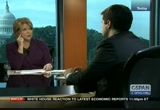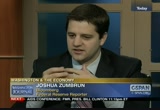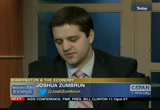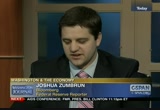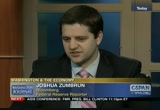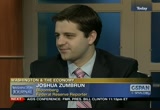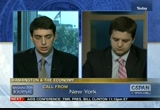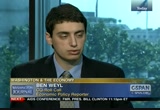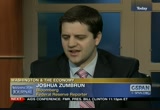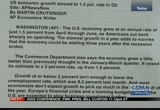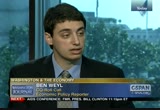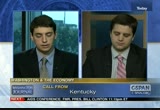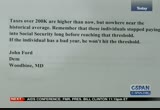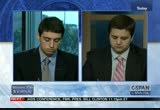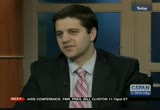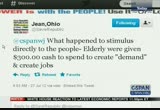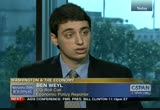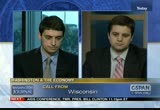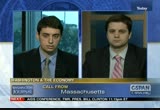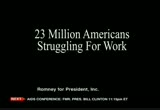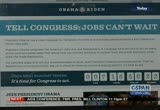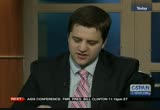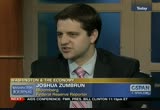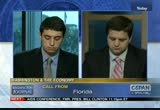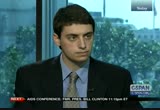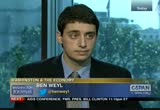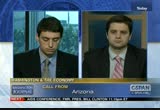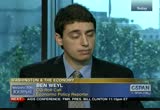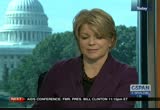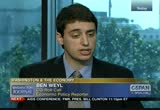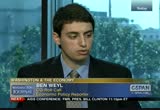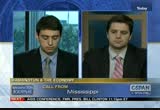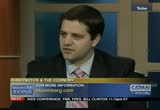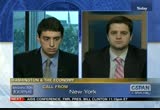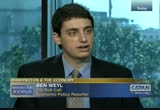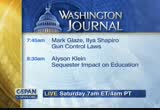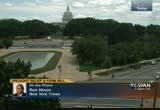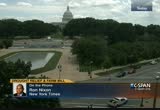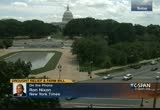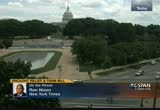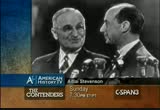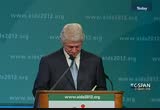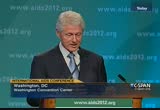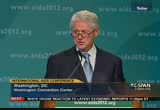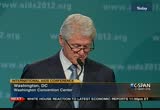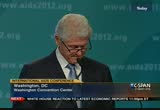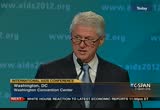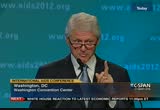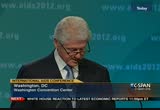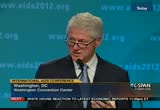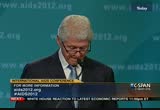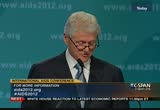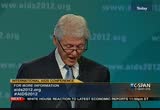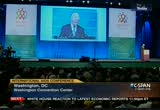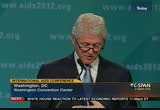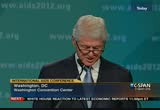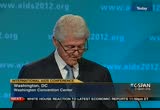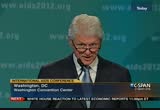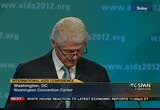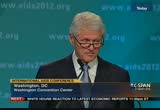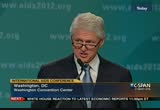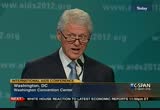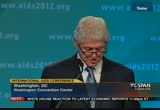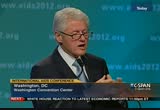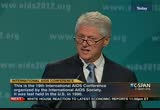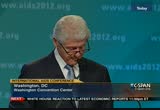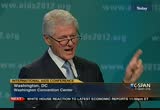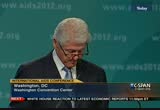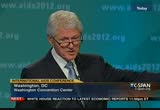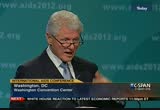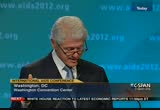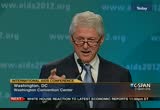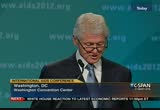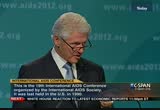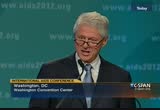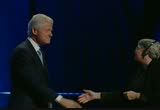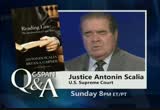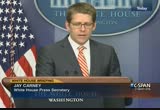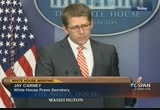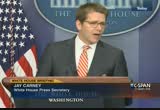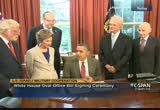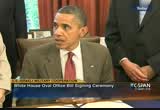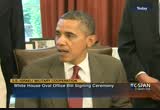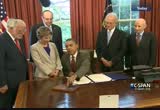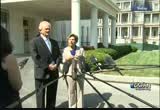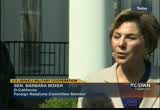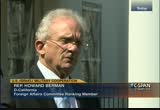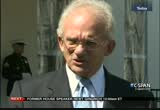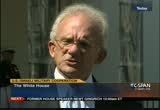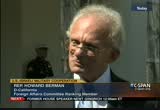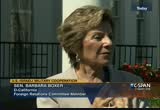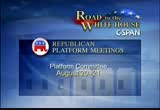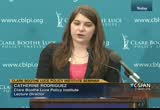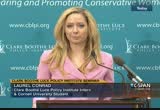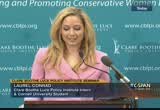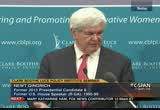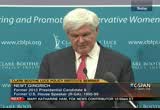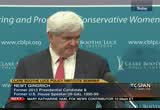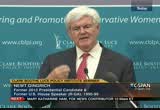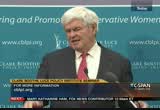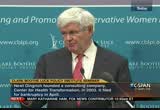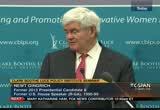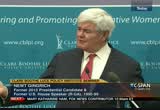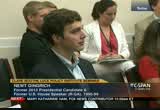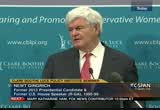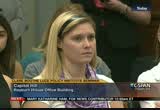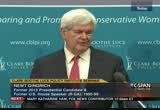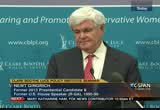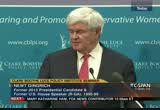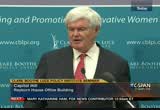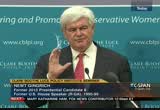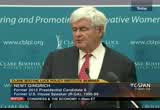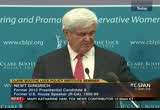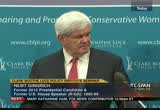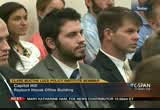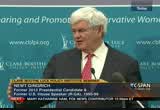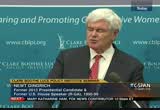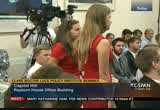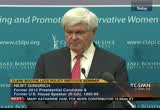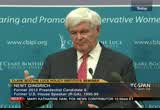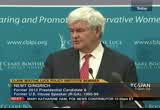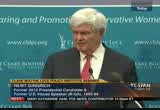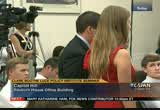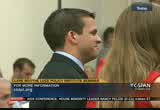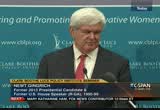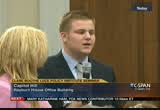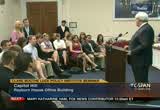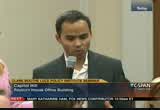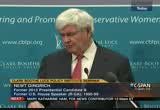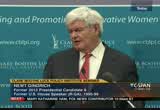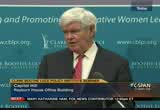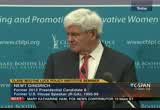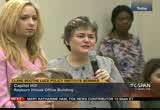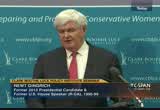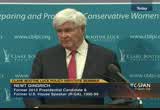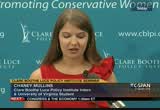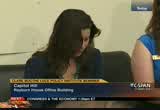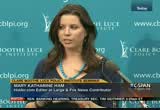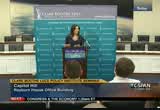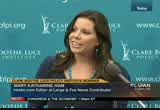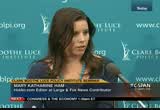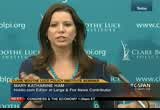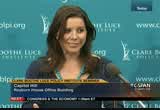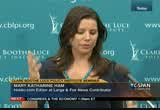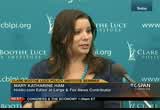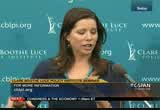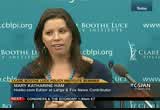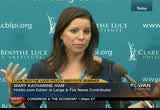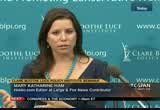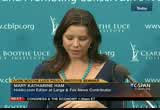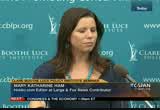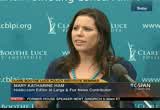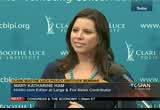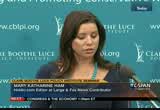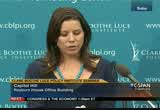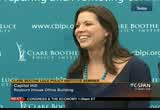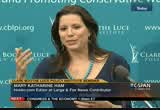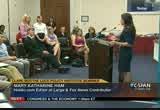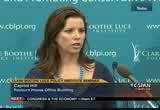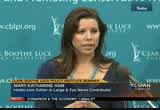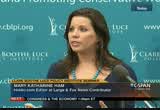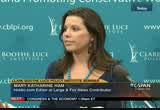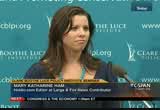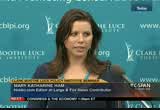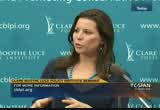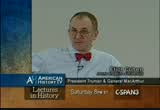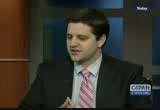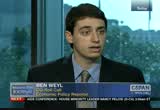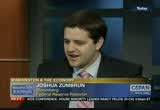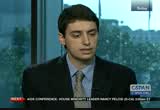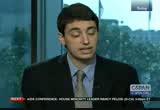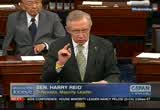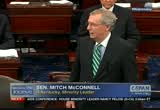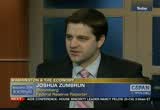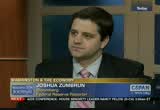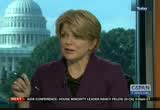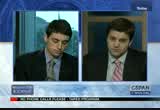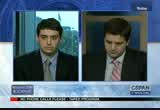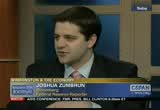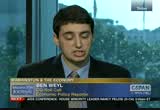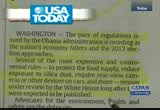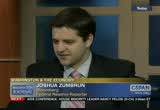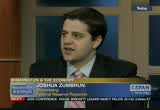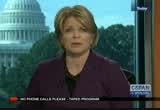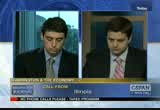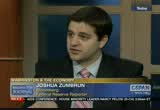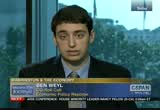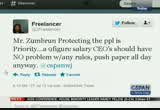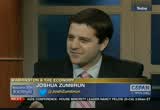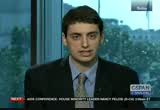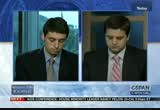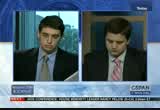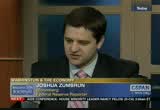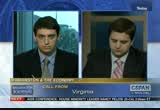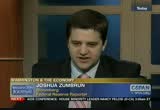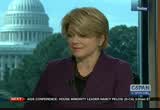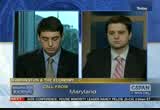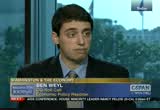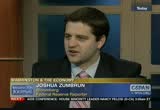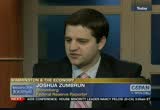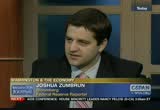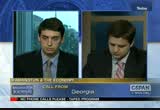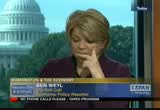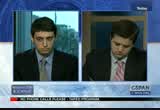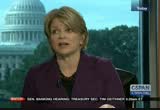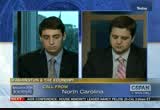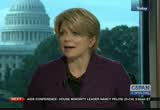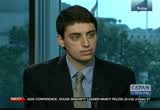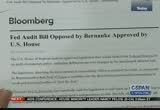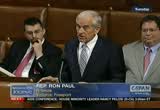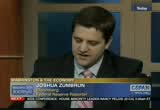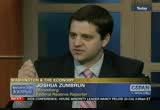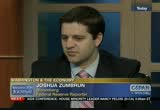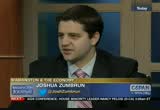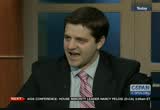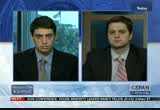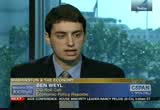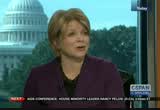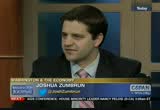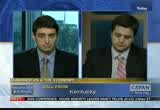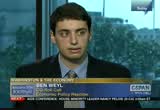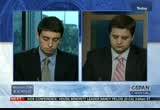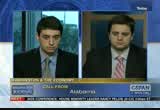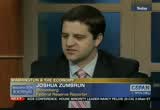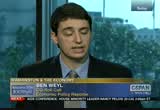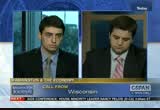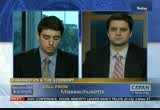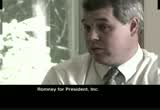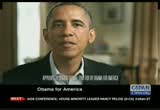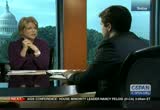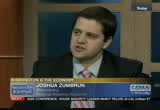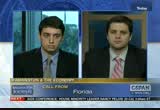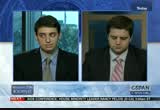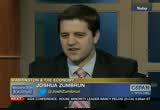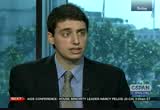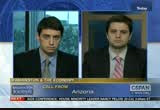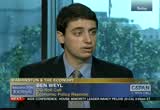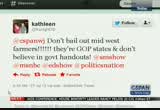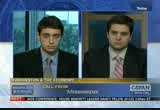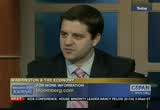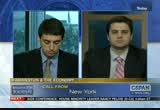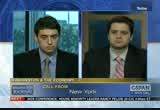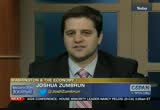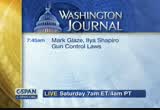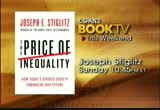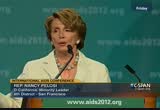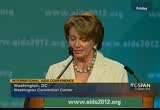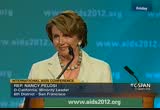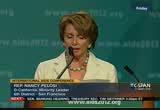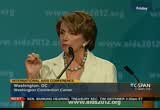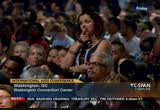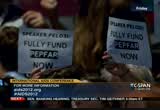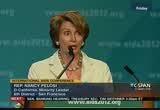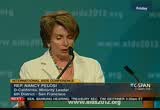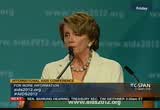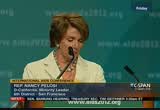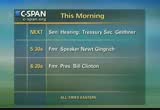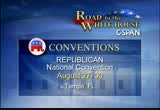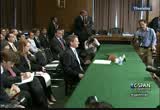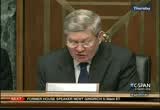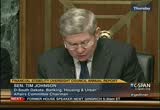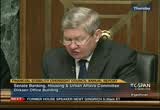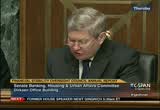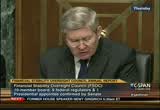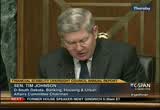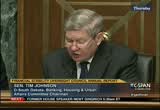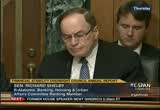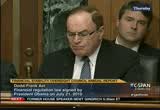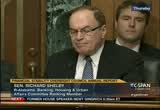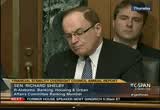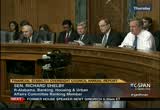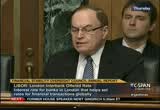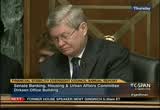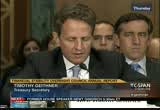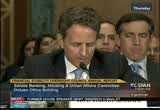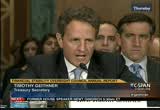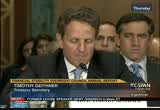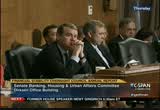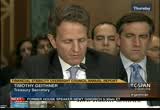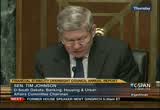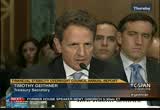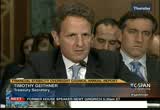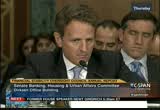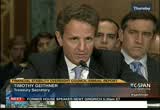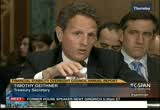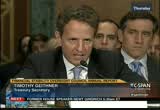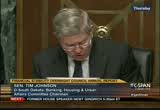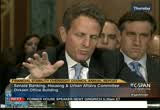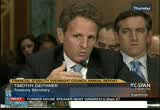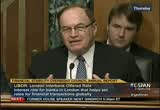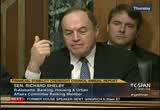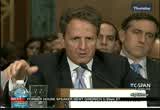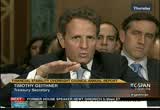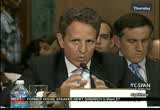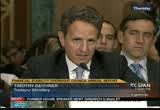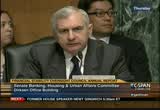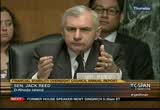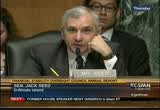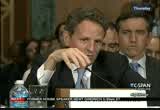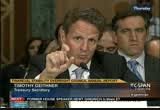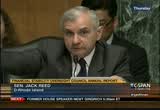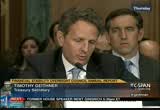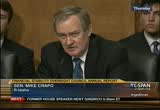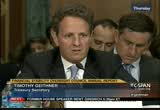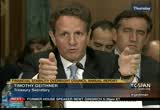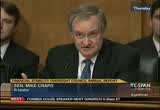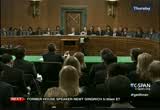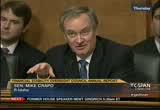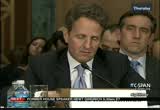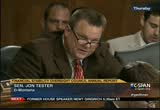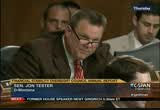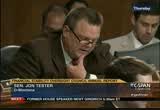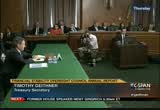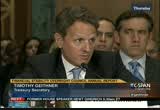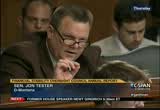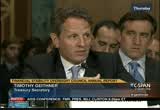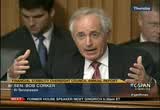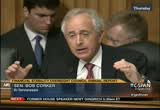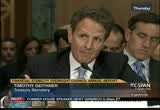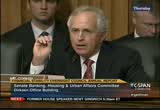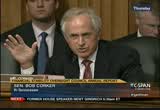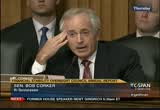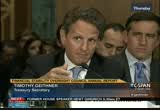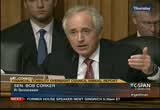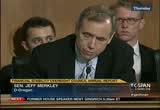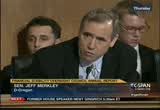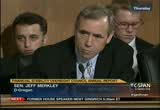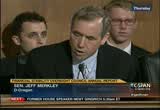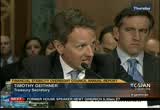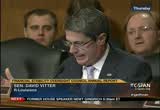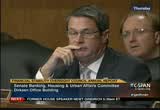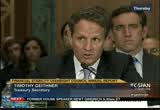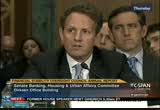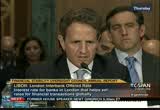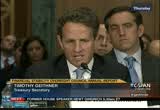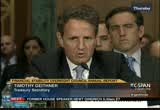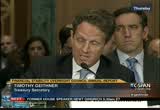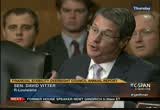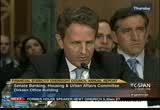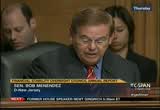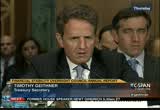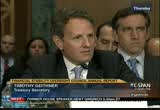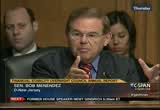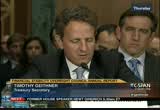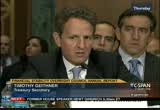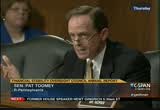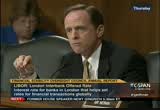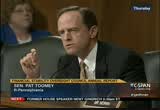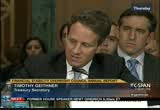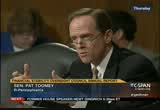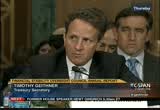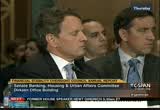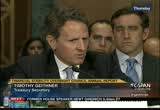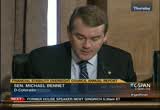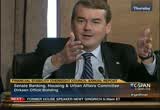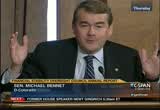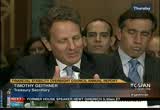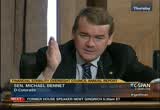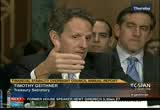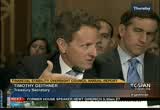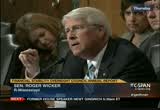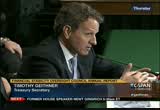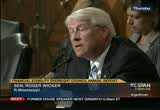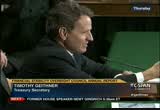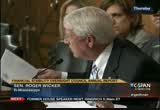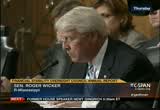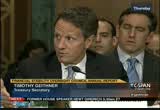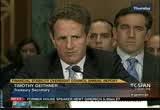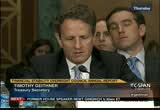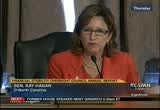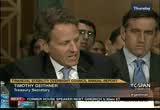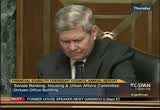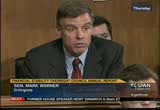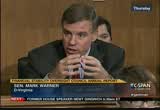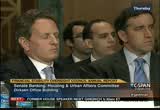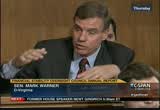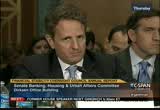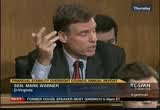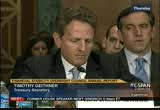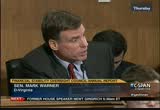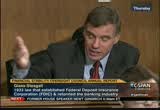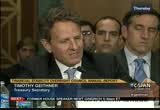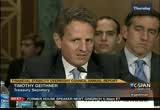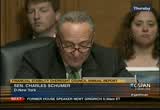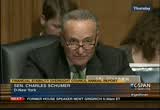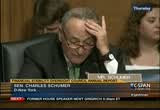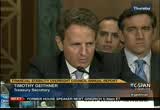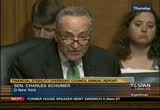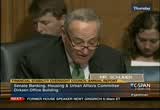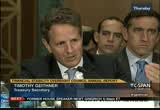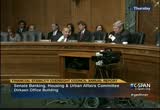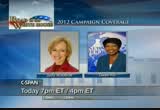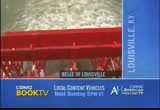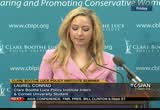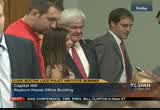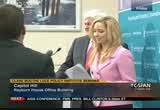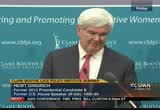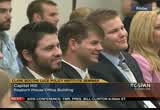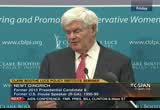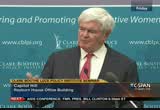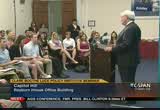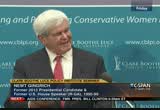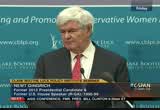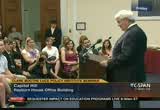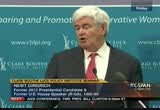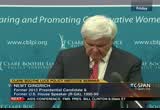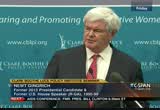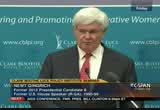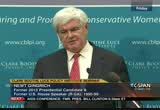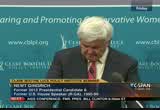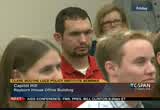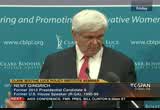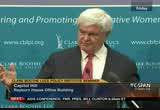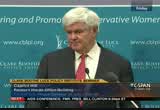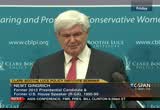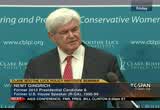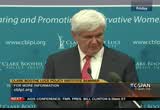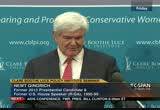tv Politics Public Policy Today CSPAN July 27, 2012 10:30pm-6:00am EDT
10:30 pm
he never got a hearing. now, the budget passed 327 to 98. guest: how can you be opposed to transparency? who is opposed to transparency? the issue is when people talk about that independence, they are talking about a huge body of research showing that central banks that are independent from political officials who are up for reelection in end up creating better policy than those under direct political control. the reason for this is simple to understand. that is that when the fed lowers interest rates, for example, the effect it has on lending happens much faster than the bad effects it has in terms of inflation. so, politicians and ran the central bank -- you could easily imagine a situation where you get a year off from the election and they just cut interest rates and everybody loves it and then you have an inflation problem the next year.
10:31 pm
so, central banks are set up as a best practice with political insulation. the reason bernanke opposes this legislation is that he says you can imagine election years -- i do not think this is hard -- where the fed has to raise interest rates because that is where they see the economy, or they are keeping them steady. a politician -- politicians decide they do not like it and they will get your document and find ways to embarrass you or ought to you. they use that as a way to apply political pressure. it has an undesirable outcomes for the economy. that is the specific issue being talked about here with the independent.
10:32 pm
the question of secrecy is a tougher one for bell said. -- for the fed. ino, my own experience with the current group of fed officials is that they are mostly sincere in their desire to improve the economy. but, you cannot imagine a situation where you had some degree of correction or alter your motives. -- of corruption or alterior motives. if that situation arose, i do not know what would catch that sort of problem in a quick way. i think both sides look at this too simplistically. there are real important independent issues and a legitimate secrecy concerns. host: when will we know the outcome of the decision making? guest: the fed will release the minutes in three weeks.
10:33 pm
next week, they will meet. the minute sketch out what they discussed and what they see the options are. you do not see the transcripts until five years later. we actually will not seek transcripts until 2018, where we can actually know what they are talking about. you never see the e-mails ben bernanke sends to the other policy makers. host: we are beginning to see transcripts from the lead into the recession. what are we learning. -- what are guest: we learning the last transfer -- what are we learning? guest: the last transcripts came from 2006. just as house prices started to fall. the main thing we saw is that the fed officials had no clue how bad this housing thing will what it.
10:34 pm
they missed what happened in housing. it is more of a breach of the transcripts in this case -- the transcripts show obliviousness. host: last question on this topic. mr. bernanke held news conferences, teaching classis, which has been out of the yoke of practice. what have we learned from him? guest: it has made my job a lot busier. it has given up an opportunity to answer questions it previously did not get asked. it used to be the case that the only time anybody talked to a fed chairman was when he went before congress. congress often asks the questions that are pretty leading, politically, to try to get support for their opinion.
10:35 pm
democrats say we should raise taxes and the public can say we should not. you do not get a lot out of him. what they have done has exposed him to questions, opened him up to a new line of questioning. we have learned more about the thought process of the central bank then ever before. host: queens, new york. republican. good morning. caller: good morning. the taxes are supposed to generate $83 billion per year. the democrats are looking at a 10-year time frame of $830 billion. if we are looking that time frame and under the obama administration be borrowed $5 trillion, in 10 years, that would be 15 trillion dollars.
10:36 pm
at that tv $16 trillion we are have, the $830 billion is a drop in the bucket. to do anything about our debt -- do you think this money will go towards that? that is all i have to say. host: thank you. guest: this question of how to pay down our budget deficits and stabilize the debt is one that is not going away. i think the caller is right that if democrats are hoping to rely on revenue, that will not work. they have said we need spending cuts.
10:37 pm
going back to what we said earlier, nobody really wants to make some of these tough choices. we are talking about texas. the house republicans have a proposal to lower rates and they say that they will make it revenue-neutral. it will not raise taxes or budget deficits by capping deductions. how we do that is unclear. the democrats have not really filled in the blanks on these proposals. host: we have an e-mail -- guest: i am not sure what the suggestion is. host: they're suggesting the economy was benefiting from the robust housing market. guest: one of the positive things now was a housing -- at that time was housing. what would be the motivation for ignoring it is there is some massive payback?
10:38 pm
i do not think there is anybody who has an incentive to allow the bubble to occur. not the policy makers. i know there are people in the financial markets to figure out what was going on and profited from it. these transcripts do not show evidence that fed officials were thinking anything of the sword. -- of this sort. even if you think that is what would happen, if you did an audit based off of these transcripts, it would be the government accountability office doing this audit. they would not come to a conclusion that there is a conspiracy to allow prices to rise and fall to benefit people in financial markets. host: we have commerce department numbers on the growth in the economy. let me read them. we can talk about the impact on this.
10:39 pm
host: so, the little impact of these numbers -- 1.5% growth? guest: we will seek republicans jump on that and use it as more evidence that president obama's policies are not working. democrats will probably respond and say welcome may if he would only work with us, we could pass legislation to bring down the unemployment rate. what those numbers really say to me -- i do not think congress will do much.
10:40 pm
this puts pressure on the fed reserve to act. chairman bernanke has said we would like you to do something about the economy. he knows nothing is happening there so it might be left to him to pursue quantitative easing. that will not be politically popular. host: next is a call from williamsburg, ky. you are on. caller: hello. good morning. god bless. i want to tell you that the greatest stimulus you can give everybody in these hard times is to make people answer for the mess that is. answer for the mess. that is the number-one thing. people have to answer for the mess. what are they hiding? thank you.
10:41 pm
guest: you know, i think that is a good statement that goes across those parties across the country. the people who were responsible for the 2008 financial crisis, which caused this great recession, have not been punished or brought to face the consequences. some people call for criminal investigations and in fact, the obama administration launched a task force to investigate what was going on in the mortgage market. most people are thinking almost too little too late. you miss your opportunity. there is anger throughout the country. host: these two e-mails reflect a divergence of opinion -- host: we will go on to our next call from alabama.
10:42 pm
10:43 pm
we make it so easy for them to never do what they're supposed to do. why do we not have terms on the senators and congressmen? we have to get a hold on our congress. government is corrupt. that is why there is a 9% approval rating. people -- i am no longer a democrat or a republican. people do not even understand what is going on. our government is corrupt just by having a lobbyist up there. we have to start at the bottom and work. host: thank you . another frustrated caller. what is the effect of lobbyists? guest: there is no doubt that they have an effect.
10:44 pm
the idea of keeping them out entirely is pretty tricky. people have a right to petition. the government and a lot of lobbyists are paid agents. the people who are paying them -- an outright ban on lobbying of that sort is something that you are talking about a constitutional amendment to do. the threshold for that is pretty high. you know, i think is worth mentioning that not all lobbyists work for a giant corporation. there are lobbyists who work for smaller organizations and associations or unions. it is not as if the lobbyists themselves are always pushing the government in one direction. host: here is a question --
10:45 pm
host: what was the view in washington? guest: that is something that became politically untenable, mostly because criticism on the right. there was a sense that the government could not just about welfare benefits or what not. the one kind of stimulus that gets bipartisan support is tax cuts, which is a direct stimulus in a sense. even that has become difficult. we recall last december president obama was trying to get a payroll tax cut passed.
10:46 pm
tried to keep that going. for a long time, republicans were reluctant to go along with that. when the politics turned against him, it became clear that was not going to work. the tax cut continued. that was eye opening to people in washington. even that was hard to do. host: f-15 minutes with our guests, talking about washington -- we have 15 minutes of our guests, talking about washington. good morning. you are on. caller: good morning. thank you for c-span here i have a comment and a question. you had a caller earlier from new york talking about the need to except the paradigm of 8% unemployment. that might not be too far off unless we look at the truth, closer to 15%. the question is, historically, have we had a gate keeper like carry reid who refuses to put things to a vote, which then could be put on the record? or is this normal as far as how
10:47 pm
they are playing politics these days? thank you. guest: you know, i think this actually does have a long tradition in politics. if your party is against something, why bring it up for a vote if you have the majority? you know, if voters decide that harry reid is too much of an obstacle, they had a chance in november to bring the republicans to majority. host: what he is next. -- massachusetts is next. hi richard, you are on. caller: mitt romney claims he is a businessman and knows how to create jobs. with bain capital, they extract jobs from companies that are already there. the people lose jobs. at one time, he said he created 10,000 jobs. another time, he said 100,000. if that is the case, that is not
10:48 pm
very many jobs. as governor, he was -- job creation was 47 out of the 50 states when he was there. that is not a very good record. host: how about we look at two recent advertisements? [video] >> we have tried our plan and it worked. that is the difference. that is the choice in this election. that is why i am running for a second term. >> i have to file my own personal bankruptcy. i closed my business. >> i have been looking for a job for two years. >> it is difficult to find employment. >> a year ago, i was laid off.
10:49 pm
>> i have to work part time to make ends meet. >> sometimes i feel like i am a failure. >> good evening. this is the worst economic recovery america has ever had. >> those assets, taking my words about small business out of context, they are flat out wrong. of course americans built their own businesses. hard-working people sacrificed to meet payroll, create jobs and make our economy run. what i said was we need to stand behind them as america always has. by investing in education and training, roads and bridges, research and technology. i am barack obama and i approve this message because i believe we are all in this together. website hask obama's a sticker on it counting down the amount of days, hours and
10:50 pm
minutes until congress recessed, urging congress to pass his jobs act. what is the future for the president's bill? guest: it has not been taken up a debt to the house and we do not expect it to before the recess or by the end of the year. it is kind of dead in congress. that is democrats an opportunity to say the republicans are obstructing and unemployment is high and we have a chance to do something about it. host: the caller talked about mitt romney's the job record. when you look at the two campaigns and how they are addressing this question of jobs creation, what do you see is the difference? guest: an observation i would make is i have lived in washington 11 years. it is not necessarily a good
10:51 pm
thing but it is what is and i am not sure that being the president is really particularly similar to running a private corporation. both sides have tried to make this a big area of discussion. i am not sure that, even if you had the most successful ceo let created 3 million jobs from his company, i do not think it would be the case that if you put him in washington, he would be able to jump-start a macro economy. they are a different set of issues and i think it would be more fruitful if people were able to spend a little more time focusing on the specific policies of the two different candidates with an act and whether they support those policies. the issue of competence is important but once it is established at a reasonable level, you should really not be focusing too much on whether or not -- a company that created
10:52 pm
jobs in the 1990's is a different environment. the question ought to be whose policies now would be more helpful for the economy. host: john, independent, florida. caller: >> good morning. i have one common, one question. i am about 60-years old and i have read all my life about this stuff. you mentioned we have lost 8 million jobs out of 20 million over the last 15 years. in manufacturing. i recall reading that the american economy was supposed to be into a third stage, beyond manufacturing, about 20 or 30 years ago. we were preparing to be the service economy, the service
10:53 pm
sector will take over and we will all sorts. this was a natural progression of the worldwide economy. now i see that the fire sector -- my question is this, is the federal reserve in charge of so much money in the world pool that they can actually be like a poker -- poker player at a table was backed by millions and the other guy might have a better hand but he can actually block them out? are we try to take over with their 600 -- with our amount of derivatives the whole world economy? thank you for listening. guest: there is a stain on wall street, denied fight the fed. the federal reserve has the ability to print an unlimited
10:54 pm
amount of money to produce the effect it once in financial markets. in that sense, the fed is a poker player who never runs out of chips. i am not sure how to respond to the second question. derivatives are important but i would like to cut up on the supposed sides. a lot of those offset each other. the real risk the opposed to the -- the post to the economy, it is there. it is not more money than exists. they started this number so large that it does that make any sense. it is not the right number to focus on when it comes to derivatives. the derivatives out there do not necessarily impart some sort of corporate control of ordinary activities. host: did you were on to it --
10:55 pm
on twitter. please explain the gop -- they refused to pass a jobs plan. guest: that is a good point. i think there are disagreements with certain elements of the plan. one of the -- one book -- one big part would be to give money to help firefighters and teachers regain or keep them employed. a lot of the jobs lost in recent months have been in the public sector but republicans do not necessarily want to strengthen many of those jobs. there is a lot of spending in the packet on infrastructure and other things and republicans do not want that. they want to cut that spending. the also do not believe it will help the economy.
10:56 pm
so there are fundamental disagreements. host: arizona, a democrat. >caller: this is a question to the people more than the gentleman there. do we want supply-side economics, the trickle-down affect? i do not believe it has been working well. i think we what demand side economics and that means the middle-class gets the tax cuts and the 2% denied it is $1 trillion a year tax cuts -- do not get these $1 trillion a year tax cuts. when mitt romney gets in there, that will be the end of this country because he will give everything to the rich. the rest of us will suffer. harry reid -- the republican
10:57 pm
filibuster, everything the democrats tried to put through in the last three and a half years. the jobs bill, outsourcing bills, everything filibustered. so do not blame it on harry reid. that you -- thank you. host: we have about eight minutes left. i want to put one more issue on the table. another phenomenon is the drought in the midwest. the corn crops, beef -- prices are expected to go up because they do not have anything to eat. so the farm bill is up in congress. this looks like this will not be attended to before the expiration date. guest: we saw some real bipartisan effort in the senate on the farm bill.
10:58 pm
pat roberts and a michigan democrat who chairs the committee, they work together with senate leaders and got a farm bill passed. there was some hope that the house would also act on a farm bill. the house and agriculture committee has its own aversion but john boehner has signalled he does not intend to bring that up. now there's talk in congress about dealing with the drought issues separately but it is not clear how long it will take to be resolved. it is in doubt if it will happen before the august recess. host: they might be thinking of a separate release package? guest: i think that is what they are thinking but i know that debbie has said the way to help these farmers is to help -- passed the farm bill. so there's disagreement on how that is perceived. caller: i was [inaudible]
10:59 pm
about how our economy is affected, it allows us to borrow money. be a utilizing [unintelligible] how can you borrow against the storehouse? host: i heard terrace in his comments. trade policy has been another issue -- i heard tariffs in his comments. trade policy has been another issue. guest: one of the issues is how the u.s. response and crafts its
11:00 pm
relationship with china. last year, the senate passed a tough bill to plant down on china's currency manipulation. china would not call the manipulation, obviously. the bill is in the house but it was opposed by the obama administration. they do not want to hurt their relationship with china. the house republicans have no intention of bringing up. mitt romney has said i will declared china and currency manipulator on the first day of my presidency. it is not clear if he would actually follow through with that because there are real and geopolitical consequences for that but that is something we're seeing. host: back to the farm bill, a tweet -- if there were an emergency measure, how will the politics of that play out? guest: it is early to tell. we know that in recent months or
11:01 pm
years, it has been tough to get assistance passed through congress that is not paid for. this goes back to the question of increasing budget deficits and when is the right time to increase these deficits? is it for hurricanes, droughts? what is the role of government. host: mississippi. paul is a democrat. caller: i was just calling to ask about -- host: can you turn your volume down quickly and go ahead with their,? caller: mitt romney is saying he is running for president and i know everybody has seen him on tv but i do not see what is the point. if he wants to help people, why
11:02 pm
cannot he does help them. i hear he has a lot of money. you do not have to run for president to do that. i do not know how to that is but they are saying he has a much money. to start helping people. you know the people that need help. host: calling on direct aid for the public. a few minutes left. i will ask you -- what do you want people to take away from this discussion or from your knowledge of this town about its approach to the economic outlook? guest: i think the public has the right -- congress has done a poor job of wrestling with and resolving these issues. you see them reflected in congress' low approval ratings. the problem seems to be that people, although they disapprove
11:03 pm
of the congress, they still like their congressmen. the ability of this congressman and individual districts to continue to get reelected, it is baffling to me. but you see it everywhere. people like their guy, they do not like the whole congress. i do not know. i think people may be need to think a little more seriously about whether or not their particular representatives, are they helping washington create solutions or are they once there mucking things up? host: our last caller, new york, republican. caller: i am a republican. hello? i want to talk about wall street. i do not understand why they do not do anything about the speculation on wall street. it is the banks that buy the oil
11:04 pm
stocks. they take our money and buy the oil stocks, drive up the price of oil. they can do whatever they want for big business but if they do not have an american consumer, they cannot sell their products. they need an american consumer. but to to the speculation on wall street and the high oil prices, we do not have any money. when-hit $3 a gallon, in pennsylvania there were three reproduction places. there were big businesses. one was called the castle. all three of them went out. if you ask any small businesses or big businesses, oil prices have affected the economy. host: i will stop the red there.
11:05 pm
speculation on that leads to high oil prices? guest: the dodd frank act did have the intent reining in a lot of speculation. there are people who think they should have focused more on restrictions in the commodity markets and doing things to stop speculators from driving up prices and the delaware oil -- prices in oil. the letter late -- the legislation did not focus as heavily on that as some people thought it should. there have been significant steps taken in the last two years to reduce speculation on wall street. one proof of that is that the bank executives never stop sqwaking about how much new regulation they are under. whether or not is -- it is sufficient is still open to debate. host: you get the last word. what do you want people to take away about what washington is
11:06 pm
doing on the economy? guest: this may not be what folks want to hear but i would counsel patience and understanding that the federal government's power is limited. we are climbing out of a very deep hole. the 2008 financial crisis was devastating to our economy. whatever policies the congress, white house or federal reserve pursues, unemployment will be high for a very long time and growth will not be strong for awhile. what is going to happen, it is not clear what will happen on capitol hill or the presidential election but regardless of who wins, it will not be easy to turn the economy around. host: thank you for being here this friday morning and take you to our callers for the questions. [captioning performed by national captioning institute] [captions copyright national cable satellite corp. 2012] but tomorrow, then control laws in the u.s. and other countries. allison kline looks at the
11:07 pm
possible impact of budget an indication programs and peter delaney from the substance abuse administration talks about the growing abuse of prescription drugs in america. washington journal, live at 7:00 a.m. eastern on c-span. >> nixon writing in the new york times about a possible congressional medals -- how much of the nation's farmland is being affected by the current heat and drought? >> the usda added about 76 more counties last week, bringing a total of 1300 counties declaring them natural disaster areas because of the drought. that is over there -- 31 states. particularly hard hit are places like iowa, kansas, nebraska. that is where the bulk of our soy bean and we production are.
11:08 pm
those crops are being heavily hit by the drought. and the livestock production. >> what did speaker boehner say on friday about possible house action in the coming weeks? >> speaker boehner said the house began working on legislation to prepare some type of disaster relief. it is not clear whether that will be an entire farm bill for a standalone provision that would help particularly livestock producers. they have been hit hardest by the drought. there were provisions in the 2008 farm bill that we are still under that would have provided some relief to livestock producers but those provisions expired last year there is increased pressure for the house to do something. the senate passed a farm bill
11:09 pm
earlier and it was hoped the house might do so but so far, they have not. >> he mentioned the senate passing their bill. is there pressure on the house to pass some short-term measure in terms of the farm bill? or is this strictly looking like it will fall in the category of disaster relief? >> there are a couple of options. when i talked to the house agriculture committee yesterday and some people in the leadership, there were several options being considered. one is a standard disaster bill that would provide short-term relief to those areas hard hit by the drought. the second thing is an extension of the current farm bill, which could be six months or a year. it expires in 2008. -- september 30. they would extend that for about a year.
11:10 pm
an authorized those programs that expired last year tha would help those livestock producers. the other thing is the house could set -- could act on its own version of the farm bill that was passed out of committee earlier this month. but so far, the house leadership had not brought it to the four -- to the floor for a vote. >> in your talks with members of the agriculture committee and department officials, is there any indication of how much a worst -- worst the dow problem is expected to come? >> i think they are taking a wait and see approach. some forecasts for rain in that area may help in drought- stricken areas. it may help soybeans, corn and not so much. they do not have any estimate on what the damage could potentially be at this point.
11:11 pm
>> ron nixon with the "new york times." thank you for joining us. >> thank you for having me. >> next, former president bill clinton at the international aids conference. then white house economic -- reaction to the economic reports. president obama and zients -- signed an enhanced security act. >> this week the -- weekend on american history tv -- >> what is the nature of the clash? is this a clash over policy, a problem of personalities? >> truman and macarthur. john's hopkins professor eliot: on the relationship that led a program -- president to lead a general at the height of the korean war. sunday, more from the contenders. a look at key political figures
11:12 pm
who ran for president and lost but changed political history. this week, adelaide stevenson who once said he had a bad case of hereditary politics. his grandfather was vice- president under grover cleveland. and he ran twice against eisenhower. the contenders, 730 eastern and pacific. american history tv this weekend on c-span3. >> former president bill clinton was the keynote speaker at this week's international aids conference held in washington. the speeches talked-about improving its testing and increasing spending on research. he spoke for about 35 minutes. >> [applause] >> thank you very much.
11:13 pm
i would like to thank the u.s. share -- the u.s. chair. thank you for your leadership as president of the international aids society. i wish you and your success or -- successor well. she gave a heck of a speech, by the way. i want to talk a little bit about where we go from here. how do we propose to implement these goals that have been set for 2015? if we believe there can be and aids-free generation, even if
11:14 pm
you define it in the narrowest possible terms, how can we achieve it? when the aids conference first place in america 22 years ago, a passionate group of activists, community leaders and researchers shouting, made the world listen. we have the first drug called azt. it was treating a grand total of 5000 people in europe and the united states. at high costs. that is a long way from where we are today with 8 billion people on treatment -- 8 million people onto the amount of world and the ability to treat the rest who need it. [applause] back then, aids was a death
11:15 pm
sentence and those of us who are old enough to have been fully grown then still have lots of painful memories of our friends who did not survive. the maker of not really imagine an end to the epidemic -- then we could not really imagine an end to the epidemic. as bill gates said, we still have a good ways to go. but we have come a long way. everything i say today comes from the perspective of the work my foundation has done in the last 10 years. before the global fund was funded, before there was any [inaudible] our job was to go around and raise money country by country to figure out how to cut costs and to provide a working delivery system that would save
11:16 pm
lives. to achieve universal access, to eliminate mother to child transmission and to cut new infections in half by 2015. we can do that but it will not be easy. just last week, on my annual trip to africa to look at our programs, i visited uganda, mozambique, south africa and rwanda. i saw an amazing progress. i saw leaders committed to offer treatment to anyone in need. i saw a willingness to completely eliminate mother to child transmission and then met with program managers who do not know where the money will come from and are not sure how we have the systems to do that. to achieve universal access by
11:17 pm
2015, we will have to increase the number of new people on treatment by 30% a year. for example, in 2005, there were only 10,000 children on treatment in low-income countries. thank you to many of you in this room and a special thanks to -- the global effort to decelerate pediatric treatment means there are 500,000 kids on treatment today. [applause] to reach the goal, we will have to have 1.5 million more. to eliminate mother to child transmissions, all we need to test and treat women earlier and keep them on the treatment lager throughout the entire period of breast feeding. many of them live miles and miles from the place where they get the medicine.
11:18 pm
we will have to implement combination -- combination provides an programs. we can save a lot of lives if all this is done. but we are going to have to do it together to do what works, to spend the money we do have with maximum impact and to raise what we will still need. it is worth remembering, and i do not think enough has been made of this, that of the money now being invested annually in this effort, more than half of it comes from the affected countries themselves. and they deserve an enormous
11:19 pm
amount of credit for that. [applause] one of the reasons universal access is achievable is because we can do it for less money than previously thought. my foundation released the results of the costing study that we did with five african governments across more than 160 treatment facilities. in ethiopia, mali, rwanda, zambia and south africa. i thank the leaders of these countries and the health care personnel for taking the epidemic seriously at the progress they have already made -- and for the progress they have already made. with the exception of south africa, keep costs on average is just $200 per patient per year. that includes the cost of drugs, diagnostic tests, personnel and outpatient costs. there is no excuse for failing
11:20 pm
to provide treatment to the remaining 10 million people in need. [applause] even in south africa, there are real opportunities with the commitment the government has already made. our foundation recently re-did the drug tender for them and they saved $700 million on what they were spending for drugs and immediately added 340,000 people to the treatment. [applause] more savings are on the way. prices dropped 70% since 2008, 30% since last year. it is $125 now and it is a good drug. the savings of that drug alone
11:21 pm
by 2015 will be $500 million we can use that money in this fight. [applause] i have to be fully candid. meeting the goal of treatment by 2015 will require some activities, especially community programs or. you have to have community outreach workers if you want to get mother to child transmission down to zero. you just have to do it. [applause] but clearly just what i have already said to convince you that we can meet the treatment goal and we should. we also know that smart investments save money. the united states center for disease control presented an economic model this week suggested that implementing a
11:22 pm
test and strategy for keep populations like pregnant women and people with tb and accelerating the scale for others will not only save lives and avert new infections, it will actually lower costs within just five years. where will we find the money? we all know that last december, the global fund had to postpone the funding round because it was short on cash. but the fund is now back in business because the gates foundation stepped up on the heels of president obama filling americas 3 year commitment. secretary clinton recently announced here more money to meet its 2015 goals. i am hopeful that other donors will do the same, especially big countries' growing fast like china and brazil. do not forget -- as elton john's
11:23 pm
presence here reminds us, there is an enormous amount of private money being raised and spent and there will be more. from the aids foundation, elton john, the dutch lottery, many others, and governments even in this difficult time, i believe will do more if we prove we are maximizing the impact of the money they have given. the united kingdom has followed a strict austerity program without cutting its development assistance. [applause] an astonishing fact. our foundation works with them, the irish, the norwegians, the government of australia, all of whom are giving and giving even in this difficult time.
11:24 pm
finally, we need to make something good out of what is otherwise a not particularly wholesome development -- the growing inequality of income and wealthy countries. thank god a lot of wealthy people want to give more and would give it to this cause if they knew what an enormous impact their dollars can have. do not minimize the possibility that we will have more private giving as we make more progress. i also think that -- [applause] we can learn a great deal from unitaid, which has saved hundreds of thousands of lives best in my experience from what it has done in putting children'd arv's and second line more out there at affordable prices, leveraging short-term investments for long- term gain.
11:25 pm
we need more innovative financing. the international finance facility for immunization may offer a good model for us. it raises money by issuing bonds and in the capital markets which are backed by a long-term commitment from donors so that donors can buy now but pale letter. -- but pay later. as we all know now, at low interest. applying this model to raise funds to implement accelerate treatment and combination provides an would mean that infections at the cost -- and cost would be lower when the time comes to pay the money back. if we all keep producing results, i believe the money will be there. and i am committed to doing whatever i can. [applause]
11:26 pm
we do have to prove over and over again that we are making the most of the money. we have managed to lower treatment costs at the facility level from what un aid said in 2003 was about $1,000 a person per year to $200 a year to date. further cost reductions are coming. looking ahead, there are other things i think we should do. the first weekend -- first we can target the money more effectively, especially in prevention. un aid recently reported that 32% of infections and driven by high-risk populations, less than 1% of prevention dollars were spent to reach those people most in need of services. we can do better than that. [applause]
11:27 pm
last year, the publish an investment part providing guidance on how to prioritize national strategies to focus on the interventions that have greatest impact. it is excellent tool i would like to see more countries adopt. this may be somewhat controversial but i feel strongly about it -- we need a new level of openness about how every last dollar is spent. but a country, by donors, by ngo. [applause] you cannot expect program managers all over the world to make the smartest decisions that they are trapped in a financial black box. all donors, all nations, all ngos, are believed to make our
11:28 pm
spending records open and available, not so somebody can be embarrassed, so we can see who is doing better and the rest of us can copy. we have to work together. if we do this, everybody that has been out there working, we can have a much bigger impact with the dollars that we have. thirdly, i think we need investments based on evidence, not the politics and vested interests that too often drives spending decisions. [applause] we are all going to have to encourage not only things we need to do but to shut down programs that are not working and to channel more money towards the population that are driving the epidemic and the evidence based intervention that are working. [applause] finally, we have to make sure that we're paying for services
11:29 pm
that directly help the people involved. when businesses start operations in new countries, they often send in their people, expatriates. they held that the work off the ground. but then management responsibility is transferred. i think we have reached the point in the hiv response where we have to do more of that. i do not want to imply that i think spending on international organizations can go to zero. that is just not true. many countries still need support. to grow and sustain their progress and to build the infrastructure necessary to run their own health programs affectively. but international technical assistance can be very expensive. some organizationssome organizae
11:30 pm
themselves up to $600 a day. for the cost of the day of consulting, and we can put three people on treatment for a year. every time we make the former rather than the latter choice, we have got to know what we are doing and prepared to defend it in the light of day. otherwise, we should go on for life savings. let me say that i think channeling more money to catchable governments is catching on because it will save money and because it will build capacity and reduce sustainable results in the countries that need them. they have recently announced their intention to transition ownership to national governments. and just last week when i was in
11:31 pm
the national government and the health minister is here today, announcing a new effort to dramatically reduce overhead and the entire health care work force of the country. i applaud these efforts and i think more of this can, should, and must be done are around the world. having said that, we all know that money is not the only impediment to meeting our goal. two years ago, we heard about the promise of combination prevention. we heard about the evidence of this prevention. we agreed about the impact of male circumcision, accelerated action in that area. we heard about promising ways to improve the effectiveness of treatment including point of care technology. something our foundation has been involved in.
11:32 pm
we did not know how to implement these programs that scale but i think most of you left vienna willing to act, eager to act, and a newly energized. two years of progress though none of these proposals have been taken to scale. many hard questions remain. and we could spend a lot of time talking about the hard questions. how'd you find people before they feel sick? how'd you make sure people get the information they need to make their own decisions? how can we -- improve care? what treatments are best? and if we do even more circumcisions, will it lead people to give up less costly thatroven prevention's they were observing?
11:33 pm
all these questions are important, but should any of them be a bar to doing what we know we have to do? i remember well, back in 2003 when gm lost to the 355 initiative, there were lots of serious questions about whether we could meet the goals of increased treatment. there were people that even said, since we can't treat everybody that needs it, wouldn't we be better off because it is so much cheaper just doing universal? but guess what? we responded to the challenge and now there are a million people on treatment. that is how we have to respond to these challenges. sometimes you have to make a commitment before you know you're going to get there. china, rwanda, and swaziland
11:34 pm
have announced their commitment. we are working with the government as was the land in our foundation. it is about 26%, and i am really impressed by the leadership and foresight there. they know that this is the only way they are going to achieve their goals and their focus -- doy're focused on how to it, not whether to do it. i also have the honor of doing a lot of economic work. they made the decision to put all pregnant women on treatment immediately. they did not wait to figure out how they are going to pay for it. they made a commitment and i believe the president showed wisdom and strength in doing it. we should all be grateful to her because -- because now everyone
11:35 pm
of you can say if they are not waiting, how can the rest of us? you might think this is not leave, but i have seen it happen over and over again. if you scale it up and it works, the money will be there to fund it. we also talked a lot about improving treatment that works. the-defying patients earlier, reaching them where they live. treating diseases that really killed people like meningitis. today, we know about best practices. we know about the importance of
11:36 pm
decentralizing services and empower and community members. we know that if we provide at the point of care, we can cut our losses and a follow-up in hand. we know that of nurses play a larger role in caring for patients, including initiating treatment -- [applause] we will reach more people in an environment where they feel better understood and cared for. so when we scale uphill, and we will stop just plain -- pay lip service to community engagement and we will have to start engaging in relying on communities. these are things that i believe. i think the money will be there if we prove that we are responsible with the money we've got. and if we prove that these approaches work.
11:37 pm
you have where near taft in the universe of people that will invest in meeting these 2015 goals and creating an aids-free generation. you have to keep pushing the rocks of the hill. since we are in our nation's capital, where the prevalence among some groups is as high as it is in southern africa, i would like to say a couple of words about that. we have about 1.2 million people in america living with hiv. barely more than a quarter of them are getting care. infection rates are rising and exploding among young black gay men. native americans, asian americans, pacific islanders, many of them feel hot because of the overall progress made in the
11:38 pm
fight against aids, they will be left behind. in the city, government and community leadership has been reinvigorated. a round load testing when a and strategies. they are making a difference. since 2007, there has been a threefold increase in the number of people being tested every year. a tenfold increase in the number of condoms being distributed every year. 300,000 clean needles provided every year. and 90% of the people that test hiv-positive in washington d.c. see a doctor within three days. president obama's administration was the first to develop a
11:39 pm
comprehensive strategy for a domestic epidemic. the affordable care act that thank god the supreme court upheld will provide coverage. the funding that he and a secretary committed this week to close the waiting list is very important. and i want to emphasize something else, that in the context of the united states, can be huge. you all know that when i do work around the world, when the foundation does, we used generic drugs. and they have made a huge difference. that money can be used to buy those drugs. first because erik and all those people that have come forward agree that they should, and because i made an agreement with
11:40 pm
president bush that i would submit all the medicine we send anywhere in the world to the fda had he said, if the fda approval is being effective and appropriate, in the local country can use their money to buy that madison. -- medicine. and he kept his word. that was the beginning of this. i am very grateful for that. that means that with these drugs are not available, you have got to do something for people without insurance that can't afford the drug. our foundation is partnered with major pharmaceutical companies to make access to affordable hiv medication available faster in a simpler
11:41 pm
way on a longer-term basis for people that don't qualify but who can afford the drug. here is the idea. it will provide a one-stop shop how to access all of the patient assistance programs available. the program will simplify the neighborhood and cut through red tape. i want to thank the pharmaceuticals that have stepped up to support with steeply discounted medicines. i hope all other manufacturers will soon follow suit. one more word about the united states. besides d.c., the next biggest problem we have with aids is the south i am sad to say since it is my home region, there is
11:42 pm
still too much stigma. stigma against men, against people that are drug users. it is not treated and tough as a public-health problem. and that with of the poverty in the disproportionately high percentage of people in our country in the south of the live in rural areas and have some of the same problems that people in southeast asia and other places have. it has created a big problem for us. i wanted to say two things. exists anywhere in america. it is still a problem in other places around the world. a look at the numbers that came
11:43 pm
out this week. his it is true that 56% of the people that need medicine to stay alive are getting it. look at the numbers in the area where there is more stigma. central and eastern europe. in the middle eastern and north africa, even less than that. not even 25% in the latter, he barely 33% in the former. to of us can't be applied the fact that no matter how much we come together and see the evidence, we still have to fight a stigma wherever we find it in to support friends and neighbors that are doing that. and we also have to deal with the fact that not everybody treats the drug problems the way washington d.c. and a lot of nations duke, as a public health
11:44 pm
issue. ethan middlemen had an amazing article a couple of days ago document in the death rate from aids that has come as a direct consequence of the refusal to see drug-related infections as a public-health problem as opposed to a criminal justice problem. we have to deal with it. i think, for me, thinking about where we were in 2002 with nelson mandela and by going to the aids conference in barcelona, literally rattling a tin cup for money. by the way, this was on his ninety fourth birthday and i told him i was coming here. he said, i am retired.
11:45 pm
tell them, i wish them well. i think you should be excited about this. i know you're worried about the money, but you should be really excited about this moment because you are committed to work through the financial crisis, to embrace profoundly ambitious goals for 2015. i have been asked to work, thanks to the aids-group in austria, with a couple of african countries to figure out how you would take a mother to child transmission to zero. we know it is more than just getting the medicine out there. but it is exciting, and we will do well as long as we refuse to let what we don't have slow us
11:46 pm
down. we have to use what we do have to get the programs off the ground and we will answer the questions as we go along. we have stronger leadership from every sector that i can remember. the research community labor in a way towards the dreams of a vaccine and a cure. more people from the private sector bringing their business acumen to the financial question. civil society pushing us to do the right thing. communities in america from oakland to mome by and sao paulo to saint petersburg. all of them taking responsibility for their children and their future. they have not gotten enough
11:47 pm
credit, the developing world and the middle-income countries for spending even more money than the donor countries and the individuals to fight this epidemic. they are worth supporting because they are coming up with this. we also have a lot of policymakers who seem committed to keep working on this if necessary, and tell everybody in this room is as old and gray as i already am. if that is what it takes. this is serious. i have been doing this a long time. all this has happened because of you and the people that sat in these chairs at every previous aids conference going back to the beginning. millions of people and an aids
11:48 pm
free generations still depend on your tenacity and courage. no, we don't have all the money or all the answers we need. but we have you to thank her for the progress that has been made, and you to make as believe we can achieve an aids free generation. and all over the world in places where we were, millions of people nourishing their dreams and their children's dreams instead of giving up. it is worth a lot. we have to deliver for them. thank you. good luck, and god bless you all. [applause]
11:49 pm
[captioning performed by national captioning institute] [captions copyright national cable satellite corp. 2012] later, remarks by house speaker newt gingrich. they discuss the 2012 presidential campaign. the issues affecting voters and the impact of social media during the campaign. that is tomorrow at 7:00 p.m. eastern on c-span. >> it was clear that when the eighth amendment was ratified, the death penalty was not considered to be prohibited. indeed, the death penalty existed in all the states and was the only penalty for a
11:50 pm
felony. for somebody today to say that somehow the american people have prohibited the states by ratifying the constitutions, the have prohibited the states from applying the death penalty, i don't know where it comes from. >> the supreme court justice reflects on over 25 years on the bench and interpreting legal documents in his latest. sunday at 8:00 ha. economic growth slowed to 1.5% in the second quarter as consumers cut back on spending. he white house press secretary responded to this news at the daily press briefing. >> i would say on the issue of gdp, what we have seen is the twelfth straight quarter of positive economic growth.
11:51 pm
that is a good thing. we have also seen, over the last three years, a dichotomy that has expanded by 6.7% overall. the private components have grown by 9.9%. and yet, as we say consistently, this is not enough. this is growth that is not fast enough and job creation that is not substantial enough. that is why congress need to act. that is why the president continues to insist that the proposal that he puts forward that outside economists say would have an immediate impact on economic growth and job creation must be passed by congress. and we will continue to make that case. obviously, despite the sustained growth in private-sector job creation, we are still in a
11:52 pm
position where we are pulling herself out of the very deep hole caused by the great recession. there is, of course, a great deal of anxiety in the country about the economy and that is why we need to take these steps, it is not acceptable to say that we will wait until next year, perhaps, to take action on economic growth and job creation. there are things better in the american jobs back, the american proposal that would create, according to outside economists, 1 million jobs. firefighters, teachers, construction workers. every one of those jobs carries with it is not just a benefit for those individuals, but outside positive benefits to the economy and society through the building of roads and bridges and schools and through the placement of teachers in
11:53 pm
classrooms that has obvious positive effects on education in this country and the president believes education is a key element of the economic picture. we are going to keep pressing for action. the president is going to continue everything he can administratively to help the economy grow and he will continue to hammer the point that we know what we can do right now to spur growth and job creation and congress needs that act. >> now, president obama citing the u.s. israel enhanced cooperation act, a bipartisan law passed recently by congress. the president also announced an additional $70 million for the israeli missile defense system known as iron dome. >> i just wanted to welcome these outstanding leaders to the oval office.
11:54 pm
congressman howard berman, helping push for this legislation that underscores our commitment. i have made it a top priority, and in many ways, this legislation brings together all the outstanding cooperation we have seen, really at an unprecedented level between our countries that underscore our unshakeable commitment to israel's security. i am also very pleased that this week, we are going to be able to announce $70 million in additional spending, $70
11:55 pm
billion, excuse me, for iron dome. this is a program that has been critical in terms of providing security and safety for israeli families. it is a program that has been tested and has prevented missile strikes inside of israel. and it is testament to leadership of folks sitting here that we will be able to lock can that funding to ensure that program continues and we are standing by our friends in israel when it comes to these kinds of attacks. let me close by saying that the tragic events we saw in bulgaria emphasize the degree to which this continues to be a challenge, not just for israel, but for the entire world, preventing terrorist attacks and making sure that the people of israel are not targeted.
11:56 pm
i hope that as a sign this bill, once again, everybody understands how committed all of us are, as americans, to our friends making sure that israel is safe and secure. our secretary of defense will be travelling to israel to further consult and find additional ways that we can ensure such cooperation had a time, frankly, when the region is experiencing heightened tensions. with that, let me sign this bill at the want to thank everyone standing beside me for their outstanding leadership and their work on this issue. i will make sure i am using enough pens. everybody gets one.
11:57 pm
there you go. thank you so much. >> we look forward to it. thank you, guys. have a good weekend. >> following the signing, california senator barbara boxer and howard berman of california talked with reporters just outside the white house. >> hi, everybody. i am senator barbara boxer from california. we are both so pleased at so grateful to the president for citing what i consider to be the
11:58 pm
most comprehensive american and israeli cooperation agreement that we have ever had. it is a very broad, far reaching, and bipartisan. i wrote in the senate and erick kanter and others in the house. howard is going to go into the details of a little bit to tell you what it is. some of the main issues we have addressed here for israel, an increase in the stockpiling weapons from 400 million to well over 1 billion, it pledges cooperation on every single front and really stands a strong with israel at the un trying to work on relations with nato. so we are very excited and i am ever so grateful for this president for standing with israel at such high loyal and
11:59 pm
dependable friend. >> thank you, senator. what the senator has said is that this bill is the manifestation of the president's words, repeated a number of times as the bond between the united states and israel are unbreakable. this codify is the extension of the loan guarantees, it provides the statutory basis for the iron dome support that is critical to deal with the missiles coming out of gaza and southern lebanon. it proved very effective and it creates another framework for ensuring israel's qualitative military edge against all combination of enemies in the region. in terms of the weapons we are willing to provide to israel. it authorizes the provision of
12:00 am
aerial refueling tankers ane a the senator mentioned a number of them. by and large, these are all just different aspects of demonstrating once again the u.s.israel relationship is a close, and credible bond between two partners, two allies in the fight against terror and the pursuit of peace and stability in that region and on some any other issues. thank you. >> we're happy to take any questions. >> is it coincidental the signing of this when governor romney is in israel? some say it may be political. a -- >> that is not true at all. john boehner and eric cantor set the timeframe for this in the house. >> the president has a certain number of days to sign the bill, and the bill just got to him last week.
12:01 am
>> you could talk about what time you sign the bill and what day, let me just tell you something. this president loves israel, cares about israel, stands with israel not just with words. words are cheap. but with actions. today we stood next to him. you should see his pride as he signed this bipartisan legislation. >> obviously, there's nobody from the other party here. were they invited? >> my co-author, johnnie isaacson, said he wanted to be here but his granddaughter was in a swimming meet and he was very excited. she is eight years old. he promised her. i don't know about the others. >> i would not read too much into that. the session ended yesterday. >> collins, she really wanted to go, but once the session ended, she caught an airplane.
12:02 am
>> talking about the iron dome, he says $70 million then said $70 billion. what will that money to accomplish? >> it will allow new batteries. here is a system that really about 90% of the time has been able to shoot down rockets coming out of gaza and the populated areas in southern israel. but there are only enough batteries now to protect certain areas. this is part of a major push, israeli efforts, and substantial american support, to expand the number of batteries so that a greater part of israel can be protected against these missiles. >> [inaudible] >> i think this is the next installment. this is the next installment of the larger authorization.
12:03 am
>> [inaudible] >> this provides the statutory basis the bill has not been enacted, also has its authorization as well. basically, this president was committed to this project. we did not need the legislation to do this, but the next president will now have the authorization and essentially, tells the next in ministration, which we will see who that is going to be but we have our preferences, to keep it going. >> does this send a message to iran? >> absolutely. i mean, there is other legislation that is more directly related to iran, but this gives meaning to the notion that iran must stop its nuclear weapons program.
12:04 am
iran must stop its support for terrorism. and so long as it continues, israel and the other countries of the middle east can count on our support against iran's violations of their treaty obligations and against proliferation of nuclear arms. >> let me expand. this president has gathered support in the entire world. this will be our last comment. this message -- i am sorry. this legislation sent the message to the entire world, including every country, including iran, that this relationship that we have with israel is unshakeable, as the president said. this legislation, in my opinion, is the most far-reaching israeli-american copper to of legislation i have ever seen in my life.
12:05 am
as far as the sanctions on iran, this president has started the strongest sanctions ever against any country. if you listen to the president of iran, he is complaining that this has never happened before. this president deserves so much credit, as does hillary clinton, for their work in bringing the world together against iran. another point i would say, is that in this legislation, is says the u.s. will oppose any anti-israel resolution at the united nations. this is one comprehensive piece of legislation. i am very excited. i think there should be cheering in israel today. certainly, in every corner of the world that supports the right of israel to thrive in peace and security. thank you very much. [captioning performed by national captioning institute] [captions copyright national cable satellite corp. 2012]
12:06 am
>> next from the clare boothe luce leadership seminar, remarks by newt gingrich and mary catherine ham. then a discussion about congressional action on the economy. tomorrow, a look at mitt romney's work as president and ceo of the salt lake organizing committee for the 2002 winter olympics. using c-span archival video, we look back at his role in lobbying congress for funding of the game. we also talk with time aboutne's alex altman his recent article. that is tomorrow night at 8:00 eastern on c-span. >> the political parties are holding their platform hearings in advance of the summer conventions, democrats hold hearings in minnesota this weekend followed with their final platform recommendations in detroit.
12:07 am
in august, republicans start the project -- platform process in tampa, florida. our coverage of the conventions continues august 10 with the reform party in philadelphia, followed by the republican national convention with live coverage and beginning monday, august 27 and from camp up. and the democratic national convention live from charlotte, north carolina. monday september 3. >> newt gingrich predicts fast economic growth based on energy and manufacturing. if president obama loses the 2012 election. it was one of many topics at his speech at the clare boothe luce institute seminar. he talks about foreign policy, calling pakistan and saudi of every biya the most dangerous countries in the world. this is 50 minutes.
12:08 am
>> good afternoon, everyone. thank you for bearing with us for a few minutes. welcome to the 2012 capitol hill seminar. my name is catherine rodriguez and i am the elected director for the clare boothe luce policy institute. as the nation's premier organization for conservative women, our mission is to promote leading conservative women and prepare women for leadership. we do this through a variety of unique programs and events like this one to expose young men and women, college students like you, to some of their conservative heroes. we also help students bring conservative ideas to their campuses through our campus lecture program. our speakers include great women speakersbay buchanan, michelle malkin and kate obenshain -- some of whom you will hear this afternoon. if you are interested in hosting a conservative speaker or would like any other information on how the institute can help you fight the left on your campus, give us a call last 888-891-4288 or visit our web site, cbpli.org.
12:09 am
i know you are all looking forward to the speakers today so i will not hold you up any longer. we will have the opportunity after each speaker for q&a. we have two of the student in turns holding microphones -- one on this side. raise your hand. at one on this side. if you would please line up behind them. they will hold the microphone up for you to ask your question. >> i would like to welcome our luce institute in turn laurel conrad to reduce our first speaker. [applause] >> welcome. my name is laurel conrad and i am a student at cornell university and a summer intern at clare boothe luce policy institute. i would like to introduce efforts speaker, conservative leader and former speaker of the house, newt gingrich.
12:10 am
he was inspired by an early age by his experiences as the son of a career soldier to dedicate his life to his country. he is the architect of the contract of america which led the republican party to victory in 1994 by capturing a majority in the u.s. house for the first time in 40 years. when of the numerous accomplishments that took place under his leadership, with congress passed the first balance -- balanced budget in a generation. "the washington times" has called newt gingrich be indispensable leader and time magazine named him man of the year for 1995. his background includes a commitment to academic achievement. he received a bachelor's degree from emory university, master's and doctorate in modern european history from tulane university. before his election to congress in 1978, he taught history and environmental studies at west georgia college for eight years. he represented georgia in congress for 20 years, including
12:11 am
four years as speaker of the house. he served on the defense policy board under president george w. bush. in 1999, gingrich was appointed to the united states commission on national security 21st century and the -- commission to examine national security challenges. he is also committed to developing free-market health care reforms centered on the individual. in 2003, he founded the center for health transformation. he and his wife host and produce award winning documentary films together and author the author of books. his daughter has spoken at the luce policy interests -- institute and has written policy breaks for us. -- policy piece for us. he has written 23 books, including 13 "the new york times" best sellers. during his leadership he used his incredible background to be one of the strongest, most compelling and innovative conservative leaders on the stage. join me in welcoming this extraordinary conservative
12:12 am
leader, newt gingrich. [applause] >> thank you all. some housekeeping. i will give you a very brief talk so we can spend most fun -- most of the time questions you want and at the very end we will take two or three minutes to take pictures. i noticed several of you kept jumping up and taking pictures. and those of you trapped of the year could not do it. i am delighted to be here and i am very interested in sharing ideas. the reason i agreed to come because i think developing the next-generation of conservative activists and leaders is very important. i just got a note today from the young america foundation, i think i have spoken in 19 out of the last 20 meetings.
12:13 am
and i do that because i do think the education matters and i do think getting people committed matters. i want to give you three or four big jumps -- think of it as an outline. first of all, my younger daughter jackie and i wrote a book of "five principles for a successful life." it is aimed at people younger than you but the principals our universal. these are things i actually develop out of trying to think of what i had done in my life that was successful. the first is to dream big. the second is to work hard. the third is to learn everyday. the fourth is to enjoy life. and the fifth is to be true to yourself. let me tell you why i say this. you are at the right age to dream big. and if you don't have the courage to dream big at your current age you will not acquire it at 45. it can be anything. it could be having a family. i have a 12-year-old granddaughter who wants to be a ballerina. i have a 10-year-old grandson who will be 11 on saturday who thinks he wants to either be a
12:14 am
chess player or a sniper. he is not sure. at nine years of age he read -- "seal team 6." think about who you want to be a and b the courage to not leave with your teacher tells you are parents or friends. understand -- and this is where i disagree so deeply with president obama -- the key to success is to work hard. his comments the other day birgit on irrational. or just left-wing academic -- verged on the irrational or just left wing academic. tenured faculty -- nobody actually creates the money but they are happy the alumni showed up for you show up with the federal government pays -- shows up to pay them. a slightly distorted view. people who are successful all work hard. this is the primary thing to get
12:15 am
locked in your head. if you want to play a big game, you are going to get to practice, and in order to practice you have to put in the time. it gets me to my third point. enjoy life. i learned many years ago -- i did a course and as part of the course we had one of the most famous inventors of restaurants in america. norman brinker and then it tgi friday's, steak and ale, the salad bar -- the waiter walking up and in introducing yourself. we interviewed him and he said, when people come to ask him for career advice, no matter what their age, the number one question is, what do you like doing. the reason is, to do anything really well you have to do it so much that you got to like it. nobody can will themselves to do something consistently they don't like.
12:16 am
so, i really encourage you to think about it. life is not mean it is always fun, but that you have some deep sense of satisfaction that this is a good way to spend your day. i spend virtually all of my time either learning or teaching. i teach in speeches, in books. i just wrote an e-book called "no taxation by misrepresentation" taking on the tax bite. we did it as an experiment to see how e-books work. i just did a paper that was submitted to politico an hour ago arguing it was legitimate to ask questions about national security in terms of the muslim brotherhood. i am constantly either reading, listening, writing, speaking, doing media.
12:17 am
and that is probably 90% of what i do. obviously i am half irish -- i like talking, i like reading. i like learning. all of this kind of works pretty well for me. then, i think, you have to recognize -- you got to learn every day. the reason you have to learn everyday is twofold. first, the world is really big. i am 69 years old. i have worked at politics since august of 1958. and i learn stuff every day. i traveled a fair amount of the planet, and i am looking forward to my next trip. because there will be things i'd never seen before. i am currently working on a novel and potentially a movie about george washington as a young man. and i am back real engaging and rethinking about washington -- somebody probably first encountered when i was 9 for 10
12:18 am
years old. i have a grandmother who taught me american history when i was very young. now at 69, i have a whole new set of questions and a whole new set of understanding and back trying to learn again. you've got to say to yourself, if i going to achieve a big dream, i have to work hard, learn every day, and i have to enjoy it. if you find attractive something where you say, i don't enjoy this, you have to have the courage to change. it is very important. which gives me -- gets me to my last point -- you have to be true to yourself. the fact is, if you are not true to yourself, you'll just crumble. you can't be true to somebody else. it can't say, they get to the fine for me whether or not i am ok. adam smith in his first great book which proceeds -- proceed to the wealth of nations talk about the idea of looking in the mirror.
12:19 am
when you look in the mirror, and you see the person you want to be. if not, candidly, the person who has to change is you. not other people who validate you. it is a very hard thing to do. i've done things in my career that absolutely involve people thinking that i was not. some of the time, by the way, they were right. which is one other point i would make about working hard. it doesn't always work. i just lost a presidential nomination. you probably know this. i ran for congress twice and lost, in 1974 and in 1976. i had a project starting in december -- in 1970 to create a house majority. we have been in the minority since 1954. i thought 21 years was long enough. the project i was running, we lost in 1981, 1982, 84, 88, 90, in '92. there were people -- the week before the election were election day of 1994 that we
12:20 am
were nuts. i just saw a guy the other day who said to me that the two great surprises of his life was you actually could have a republican speaker of the house and that the berlin wall fell. he put them in the same league. i had to be willing to endure two losses in congressional campaigns in order to finally win. i had to be willing to endure a losing year after year, getting back up and say, what didn't quite work, and going back added. i coined a phrase in that period called cheerful persistence. both words are important. anything you really want to achieve, you have to persist. if you want to be effective, you have to persist cheerfully. in a free society, you attract people by being cheerful. if you are persisting but you are grumpy, people hide from you. if you're depressed, they ignore you. if you're angry, they try not to get near you. but on the other hand, if you are cheerful, they will tolerate you.
12:21 am
think about people you know personally. cheerful persistence is a disciplined behavior. i want to -- a couple of books i want to recommend. i would urge all of you to buy a copy of peter drucker "the affected executive." his argument is in the information age, every worker is an executive. knowledge workers by definition are about executing. it is about 160 pages long and it is an astonishing book. i urge -- 168 pages long and it is an astonishing book and it is the best single book about being effective i have seen. he starts with a very important point, which i believe deeply having spent my whole time studying it. effectiveness is a learned have it. it is not about genetics, it is not about i.q.. it is not about personalities. learning a set of patterns that work.
12:22 am
and then being disciplined about resupplying them and resupplying them and learning in the process -- re-applying them and re- applying them and learning in the process. let me talk briefly about where we are as a conservative movement. i think we are in the middle of a tremendous amount of change and i don't frankly know how quite we will get the where we are from -- to where we are going. the conservative movement really began in its modern form in a reaction against the republican establishment and against the national establishment, which are parallel but not identical. if you go back and you look at the rise of goldwater, it is really taking on both the national system -- the welfare state, lyndon johnson, etc. -- and it is taking on the republican establishment -- nelson rockefeller, the northeast.
12:23 am
it had a huge impact. there is no question that it changed the underlying pattern of the republican party decisively in ways that are still true to this day. at the same time, it created the framework within which reagan could rise. but it is important to remember, if you go back -- this is why i am a historian and not a political scientist. any social science that has three lines is inherently unlike the real world. because the real world does not have street lines. in 1972, when richard nixon one a decisive election -- won a decisive election and carried virtually every state, there was the zeroth reason to believe ronald reagan would become president -- there was zero reason to believe ronald reagan would become president. the vice president with spiro agnew. there was ever a reason -- every reason to believe after nixon that spiro agnew would be the republican nominee.
12:24 am
there is a great book, i think it is called "a heartbeat away" about the discovery that iran agnew was a crook and about getting him out of the presidency, which led nixon to pick gerald ford. nixon then resigned. ford becomes president. ford then makes to the huge mistakes. he treats the reagan with contempt -- which just makes reagan irritated -- and he picks nelson rockefeller to be the vice-presidential nominee. had ford picked ronald reagan to be the vice-presidential nominee, history would have been totally different. reagan probably would not have ended up running for president. he would have been on a ticket and the ford that either would have when they were lost, and if it had one ford would have served as president. the guy who tells the story beautifully is one of the leading analyst of american polling.
12:25 am
he always says that he learned about campaigns being real because he was convinced to leave his job and go to work for teddy kennedy and kennedy was like 30 points ahead. and the week after he left to work for kennedy kennedy david interview with roger mudd in which roger mudd asked a to a -- ask a trick question. kennedy is running against jimmy carter. roger mudd asked this very unfair trick question -- why you want to be president? kennedy couldn't answer. he couldn't answer him so badly -- you could probably google this -- that his campaign just started to collapse. charlie cook is the guy who tells the story. charlie cook is the one who left his job to be a field organizer for kennedy because this is going to be the winning campaign. he watched it disintegrate.
12:26 am
but there was no point in 1979 where you would have said reagan is inevitable. at this stage in 1980 reagan with nine points behind carter. i am just giving this as a way of thinking. you don't know how the movement is going to be bold and to the next phase. you don't know what will happen decisively. but let me tell you what i think the three great needs are. first, we have to win the cultural fight to take back the campuses. we have allowed the left to develop a bizarre domination of american intellectual life, much of that reinforce the by course of behavior. -- reinforced by coercive behavior. how many of you are on a campus where it is the size of a painful to be conservative? ok. why should it be true? conservatism is the dominant dog you structure of the american people. why do we tolerate academics who are not -- nuts imposing their view and false history. teaching stuff that's not true.
12:27 am
you want to understand why barack obama has such wacked out ideas, he is the perfect representative of the academic class. he really believes this stuff. he thinks he can get there on your own. ur you can't get there on yor own. he thinks government is the magic thing that should work. i thing he was genuinely shocked to discover the shuttle ready jobs were not shovel ready. to live in america and not figure out bureaucracies are not exactly agile is truly being out of touch with reality. but he lives in that world of people -- they have nice cocktail parties and talk about the latest weird book they read -- [laughter] and excited because a highly esoteric poet is coming by hill was last read by 11 people but who hates america and has this wonderful new crop -- problem called "why i hate america" which is filled with a deeply powerful meaning. my describing the world some of you know? ok.
12:28 am
one of the great challenges of the conservative movement of the next generation is a had gone all out fight for the academic world. those of you who are attracted to that, i would urge you to get a phd and find a campus and start a war. you don't have to argue for a countervailing bias but just argue for facts. a fact-based society destroys modern liberalism because modern liberalism is based on such a large number of fantasies and highly inaccurate things. second, we desperately need a generation of innovation. one of the sad part about my not being more competent as a candidate is that we really need a whole range of new ideas. let me give you a quick examples. brain research -- alzheimer's, autism, parkinson's, mental- health, traumatic dream -- a traumatic brain injury, post- traumatic stress disorders -- the research is the biggest area of break through in the next 25 years.
12:29 am
it will have more impact on human lives, the federal budget. we have all of this effort on aids, and i understand the importance of aids and i understand the political power, but the fact is alzheimer's is massively bigger, autism is massively bigger. why is it we don't have the same level of focus and investment and why aren't we having the kind of breakthroughs we are having in brain research, which covers all of these aspects? second, we got into a brawl about it -- i meant what i said about going into space. the weakness we got into was my opponents probably said, well, nasa is so incompetent, how could you possibly throw so much money at it? that was the right question, but then they cut off the answer. what we need is a new model for going into space that uses the private sector, it uses prizes and entrepreneurship.
12:30 am
my guess that the people pretty knowledgeable about this, those with 30 years of experience, they believe a private sector effort to get to the moon would cost about 5% of what the federal government plans to spend. the model i tell people are the right brothers -- wright brothers. a practice five years, spent a total of $500 in 1900's money -- they actually had 500 flights that failed. december 17, 1903, the first four flights failed. they flew on the fifth flight. so, they discovered how to fly. for $500. the smithsonian got a $50,000 grant from congress to build an elaborate fancy airplane, launched its offer of a boat of potomac and it went into the water and sank. $500 private sector, two guys who are passionate and a $50,000 bureaucratic project.
12:31 am
and the smithsonian was so mad at the wright brothers were succeeded that relations were so bad for 37 years the wright brothers when i give them the original plane. -- would not give them the original airplane. some of you interested in doing this, we need a generation of innovation. we need to apply a six sigma for the federal government. it would say trojans. -- it would save trillions of dollars. we need to fundamentally overhaul the congressional budget office which is a disaster. it is a bastion of liberalism propping up models that don't work. we don't have the intellectual horsepower of engaged in these kinds of fights. the third thing we need is something we have a fair amount of the probably need 10 times as much -- we need a lot more noisy people. we need people who are prepared -- there are so many fronts to have fights on right now.
12:32 am
and of course, some of it is cultural and some of it is dealing with the changing real world, and some of it is dealing with the obama administration. but we need more people on blogs, twitter, talk radio, tv, more people writing books. two last examples -- we are now going through a revolution in energy. there's an american energy opportunity that by itself is going to remake your life. you should be dramatically optimistic. if we can beat obama this fall, we will see a takeoff of the next decade that will once again make america the leading country in the world. we will be the dominant manufacturing country in the next decade, the dominant provider of energy. people forget, we are an enormously and doweled country. -- endowed country.
12:33 am
when i first thought environmental studies in the 1970's -- this would be a great case study for someone who wants to do an interesting book when they -- we use the popular book called "the limits to growth." it have been developed using fancy computer models at mit and was seen to be very advanced. garbage-in, garbage-out is a very important part of computer work. everything they describe as wrong. this is the problem with modern left wing environmentalism. every single prediction. you get a copy of the book -- it is just wrong. the most recent vivid example of the left being wrong is the concept called peak energy. how many of you heard of peak energy or peak oil? one of the things academic leftists love talking to people about. we are going to run out. -- there is a funny movie called "the last car" i think, in 1980, i think, and it is like jimmy carter's world coming true. only enough gasoline leapt for
12:34 am
one car and the whole rest of the country does not have cars -- only enough gasoline left for one car. a black utopia, if you will, where everything the left dreams of has happened and it is really miserable. in that context, innovation has changed everything. we now have a combination of what is called fracking and horizontal drilling which enables you to go down and get what is called tight oil or gas and shale. we knew there were gas and oil after index and foundations -- formation but we cannot get them. let me give you two numbers to illustrate the scale of the american energy opportunity.
12:35 am
the amount of natural gas recoverable in the united states went from seven years in t yearso 100 -- in 2000, to 125 years today. for most of you -- a few of you may live more than 125 years -- but for most of you we have found that natural gas to get through your lifetime. remember, this is assuming we don't find more. the numbers for oil -- 10 years ago north dakota had 150 million barrels of reserves. the current number is 24 billion. north dakota this year passed california and alaska and is now the second-largest oil-producing state in the united states. this is what is wrong with liberalism. if you went 10 years ago and said north dakota will be the number two or of the state, they would say you are crazy because they live in a polaroid snapshot world. but history is made dynamically, it is made by inventing things, creating new potential.
12:36 am
how many of you have a phone that has a video camera? i rest my case. just think about the dynamics of what is happening to your personal capacity to deal with the internet. so, there are things we can do when we need a generation of innovation, and we need people to be noisy about why we should get it and we need to reset the country on a belief that we could have a dramatically better future. i think that is the challenge for you generation. let me, if it is ok, toss it over to questions. [applause] and i gather you should ask the questions into the microphones of a nice spin people know what is going on. -- the nice c-span people will know what is going on. >> what do you think is the most effective way for us to encourage young people to join the conservative movement?
12:37 am
>> i think the starting points are two things. one is -- do they like having a job? would they rather live in a future where there are a lot more jobs, opportunity, and take-home pay and a lot more choices or one where we all come to resemble downtown detroit? second is a question of freedom. do they want to live any world where they get to define their future and make their choices or do they want to live in the world or somebody in washington, d.c., and an unknown bureaucracy issues. regulation that the deregulation is to define their life? would that work? ok. i am not a young person. i don't know what works. >> thank you, mr. speaker. from north dakota state university -- >> that is why he kept nodding, yes. >> thank you so much for pointing out the successes we have had.
12:38 am
-- and the state of north dakota, especially of the energy in this day. but to take my question in the different direction -- how do we when the culture war in this country and win the cultural battle for conservative soul of the nation? been a very good question. first of all, about -- >> a very good question. first of all, about -- about north dakota. vote left will start whirring about north -- north dakota, because you know when there is an oil boom there are not enough -- there are so many jobs, too many jobs. having no jobs, and no roads -- if nobody puts a truck on the road, the road last a very long time. just think about it. just watch the way the left will react to north dakota.
12:39 am
western north dakota has to many jobs, to many people, too many folks striding around. it is a small town that has one traffic light, it's a long time to get through because all of these people are there. so, you have this constant complaint, either why can't we all lived in detroit where they are going back to farming in downtown detroit because half the buildings are unoccupied or the complexity of succeeding. it is a very important part of life. if you succeed, there will be changes. i bet all of you have had this experience. you go back home with folksy went to high school with and you try to describe your new life and for a fair chance for some of them you live in two different worlds. my impression is most north dakota andns are happy to have so much will produce they have a $3 billion surplus -- most north dakota residents are happy to have some much oil produced.
12:40 am
i think the greatest the lustration of winning a cultural war in a very direct way is abraham lincoln. there are a couple of books by a theologian, one only and that the greatest speech, about his second inaugural, -- one on linkedin's greatest speech, and one as president, and one called cooper union. if you want to understand being persuasive and you want to see a cultural fight, studied abraham lincoln. abraham lincoln in 1850's, there is a very unformed argument in 1850's. should slaby allowed to expand, does it matter? -- should slavery be allowed to expand? you have in abraham lincoln's somebody who is very carefully moving public opinion extraordinary -- in an
12:41 am
extraordinarily well thought-out way and it all blows up in his face and you end up in a war. and he then has to mobilize and sustain the north, despite huge casualties. we lose more people between the north and south combined in the civil war and then all of the other wars combined. and from a much smaller population base. if you read abraham lincoln's gettysburg address, it is a campaign document. no president has been reelected since andrew johnson -- and dejection -- andrew jackson in 1832. the gettysburg address we looked at as a historic, cultural -- read it as a politician speech. basically saying to the north, if you vote against me, your son was killed in vain. now, are you prepared to let your son's death be meaningless or are you on the side of freedom?
12:42 am
it is really designed to take this cultural fight. callista and i have done a series of books on american exceptional is in and we are doing it to pick a fight with the left. either the declaration of independence matters or it does not. if it matters it is a real document and it says your rights come from god, you are endowed by your creative. this is a cultural fight we want to have a country because the hard left of not believe any of that. you get in a very serious question on the nature of america. and i think you want to get people down to first principles and you want to get the down to facts. is it a fact that we now have a lot more oil because of innovation or not? this is why i am reading this piece on the muslim brotherhood. is it a fact that there are
12:43 am
people on the planet who said -- say they would like to kill us? let's start with that. if you are on the hard left, they will say it is just political language. you would think after 9/11 or this week's bombing in iraq or the car >> -- car bomber in times square, maybe people who say i want to kill you actually mean they want to kill you. it is a very important core level argument and we have to be more prepared to wage a those kinds of first principles fights. >> mr. speaker, thank you very much. i am from florida. i became a citizen last year and recently ran to be a delegate for the rnc convention and was told by the good old boys i could not make it. the young people could not become a delegate. i became an alternate delegate but as of the republican party need a transformation for the next generation? do we need to go back to the 1980 idea of ronald reagan expressing a genuine message to be inclusive and open?
12:44 am
>> sure. of course, we do. if the old timers say there is no room for them, beat them. marco rubio did not wait and line. he beat the incumbent governor and he said i want to run for the u.s. senate. i knew him before he became speaker of the house. he had a very methodical campaign to become speaker when he was clearly too young. politics in the end -- there is a very good book of "plunkett of tammany hall." plunkett later in life told this reporter about how things worked.
12:45 am
you find an office you can win and you beat somebody. then when you won, you are somebody. you are now a real person. in the age of information -- let me give you two examples. i did jay leno the other night. did any of you see it? what did you think? ok. i saw snooki and i had a serious and meaningful dialogue. seriously. snooki exists because she exists because she exists. this is part of the nature of the modern world. you could have a brother or a sister and do your own tv show and three years from now if it catches on, you make money. if it doesn't, don't make money. so, part of the trick is to be noisy. part of the trick is to take yourself seriously. i first appeared asking for a zoo in the city of paris for what i was 10 -- harrisburg when i was 10. i had people my whole career thinking i was too noisy.
12:46 am
my attitude is it is nice to have an occasional republican willing to debate and argue and be in the media. but for a large part of our party, i was seen as so guy -- why doesn't he just be quiet? there is a famous book where the title was "tell newt to shut up," and it was a quote from john boehner. go back home and be it rather than complaining about it. fill the vacuum with their own energy and courage. >> first, i'd like you better than snooki. i am michael, going to law school in boston. i have been doing research on campaign finance.
12:47 am
as you probably know, you have a world in course in it this past year. what do you think of the state of campaign finance and how would you fight the left on things like the disclose act and other things they have been attacking super pacs for monday utilize the in the 2008 cycle? >> i think the ideal campaign finance system would allow any american to get any amount of after-tax income if they filed on the internet every night and they gave it to. i think it would clear up all the current bologna, the current red tape. the way the system currently works, if you are rich enough -- if you are mayor bloomberg, you can buy re-election. but he is writing a personal check. he spent so much the it -- getting reelected for mayor of new york that it was virtually impossible to give -- compete because if you are a middle- class candidate you could not raise the money.
12:48 am
i think it would be healthier, instead of the money going to the supers -- super pacs that are so all outside of the system i would have the money went directly to the candidates and the candidates have to take responsibility for the advertising, and i think you would have a much cleaner system. every night reporting on the internet, you know who gave what to whom and just relax and get away from the mess we're in now. campaign finance has consistently made the system worse and it had diverted incumbents' toward spending so much of their time raising money that they have far less time to think and far less time to work with the legislators then they did 30 years ago. -- than they did 30 years ago. >> thank you very much, mr. speaker, for this wonderful speech. i am currently with the foreign affairs committee. i want to shift the dynamic of the discussion and ask a foreign policy question, if you don't mind. recently, in the last few days, there have been a lot of reports from both sides that are sort of taking this critical view of candidate romney's foreign policy, saying he does not have a specifically defined foreign- policy, and that is because
12:49 am
president obama has had almost more aggressive foreign policy to some extent than president bush. i wondered if you could comment on that and what is your view in terms of this upcoming election, and in particular, how do you define it republican foreign- policy in the next foreign -- coming election? >> that is a good question. i think it is actually an advantage that romney does not have an automatic sense of what he would impose on foreign policy, because i think the world is evolving in ways we don't understand right now. i would just give you a couple of quick examples.
12:50 am
i was at a speech in singapore in june and i went early to listen to some of the speakers before i talked. one of them was a chinese in economist who pointed out in the next 10 years, india will add 70 billion -- 70 million workers and china because of the one child policy will lose 70 million workers. i went back to rss who works -- russ for me here, i asked sen meet the comparative numbers. 70 million workers added to india is the equivalent of the gentleman and british work force combined. nobody here -- our foreign- policy establishment in both parties doesn't think about a world in which the addition is bigger than germany and great britain, and yet that is the reality. if you look at the build up of
12:51 am
military force in asia and the decline of military force in europe, there are very substantial changes underway in ways we don't fully understand. in fact, there was an article this morning about the iranians by new technology to try to maximize their first 648 our capacity to inflict damage to the u.s. navy -- 6 or 8 hour capacity to and flood damage to the u.s. navy. if i were to say to you what is the most dangerous country in the world today, what would you pick? china, russia -- i am going to give you two countries not on that list. the most dangerous country in the world today is pakistan. pakistan probably has well over
12:52 am
100 nuclear weapons. it had a growing islamist factions. it is a very precarious, very complex country. it has substantial terrorist organizations operating all over the place. the pakistani intelligence service funds some of those operations. i mean, it is truly complicated. we all worry about iran might get a nuclear weapon. pakistan has 100 nuclear weapons. iran -- ahmadinejad talked about eliminating is a row, so from that point, but there are a lot of people in pakistan who would like to eliminate somebody. whether it is india, what have you. the second most dangerous country from our standpoint is saudi arabia. it is the largest funder of wahabism in the world, a radical islamist position totally
12:53 am
incompatible with your lives. this is one of the conversation nobody in our elites want to have. none of you women would be in this room. he would not be allowed to be here. -- you would not be allowed to be here. you have to look carefully at what does this all mean. i don't think today that we have designed systems that fit the realities of the world that is emerging, and i think one of the things i would recommend to a president-elect is he really methodically rethink -- and not just assume that he wants the right wing version of the establishment but that he actually wants to rethink what are our principles, goals, and what kind of systems we need to get there. i think the changes in the world around us are that big. i think are some of -- i am about to get the hook. >> one last question. i want to ask you about electromagnet pulse. i know you have written a little bit on it. it is such a frightening prospect and we had a taste of it if you weeks ago when the power went out of the storm.
12:54 am
the you know people in the private sector working -- do you know people in the private sector working on it? >> that everything that are the most immediate threats to your lives on a grand scale -- assuming there is not a nuclear war -- is cyber warfare, which we don't understand very well, and an electromagnetic pulse and of the two, electromagnetic pulse is much worse. we clearly know the technology because we first discovered it in the late 1950's when we set off a hydrogen warhead in the south pacific and 28 miles of -- 20,000 miles away in hawaii it knocked out lights and telephones. if you launch the weapon at the right out the to be potentially can knock out in large part of the country. the reason it is so formidable is if you burnout elektra
12:55 am
generating systems can't replace them. -- electric generating systems, began replace them. you going to a pre-elliptical world. -- pre-electrical world. if anybody wants a sobering the deduction, michael author wrote a great book called "one second after" actor -- where he shows you the town of north carolina after an electromagnetic pulse event. it is one areas, if i was looking at restructuring our national security system, we should have a very methodical program of hardening our systems. and you can hardin all of these large generating systems so an electromagnetic pulse would not destroy them. and also think through how you harden and of stuff that if there was an attack you could rebuild the system pretty fast. today it would truly be a nightmare.
12:56 am
let me just say, i hope all of you will get active and stay active and be engaged and i hope you will be engaged in an aggressive and direct way, and don't be too patient. we need people who are pushy and willing to work hard. do we have a couple of minutes to take pictures? who is my leader? you are my leader? do you want them to take pictures outside? [captioning performed by national captioning institute] [captions copyright national cable satellite corp. 2012] >> also speaking at the event with editor at large for hot air.com. to talk to young people about her work in an paternalism and the practical at x -- aspect of working in politics. this is about 35 minutes. >> hello. i am a summer intern with the clare boothe luce policy institute and a student at the
12:57 am
university of virginia. i have the pleasure of introducing mary katharine ham. she graduated from the university of georgia with a degree in pluralism and worked in sports journalism in the conservative movement as a writer and commentator. she worked at the heritage foundation and has written for such prominent publications as "the washington examiner," and the "weekly standard." mary katharine ham is known for her success as an artistic radio talk-show personnel. she was a co-host of the morning majority which ran weekdays in washington, d.c. she is a frequent fox news contributor and analysts. mary katharine ham ran a successful video blog, ham
12:58 am
nation, in her videos exposing questionable washington sent -- transaction secrets won the 2007 web blog video of the year. she particularly loves and focuses on conservative, fiscal and security issues. she is now married and continues for work for our conservative movement as the editor at large of hot air.com she considers herself a true feminist and is inspired by her grandmother legacy of doing it off without government interference. i heard her speak about this earlier this summer. she encouraged me as a young conservative woman and i was impressed with how persuasively she spoke. she was very witty and family and is an amazing example of intelligence and success.
12:59 am
please join me in welcoming mary katharine ham. [applause] >> i know the speaker probably got into a bunch of wonky policy and he can talk about anything under the sun when it comes to that. i wanted to get more practical about thinking about starting your career in washington and maybe go through some of the things that i have learned and maybe not learned while i've
1:00 am
been here. first thing that you should know about yourselves is that if you have come to work in washington if you're interested in politics and you want a career in this arena as an activist or in politics in general, you are not exactly normal. just accept it now. it's ok. it's part of the game. when you are communicating with other people, normal people, which will be your job, here is what you need to remember -- in washington, we think that a thousand things are happening every day that are important. to some extent, that is true, but what the rest of the world sees -- you know, someone who is a big soap opera fan, and they catch up everyday, you look at them and you say, that is insane.
1:01 am
there is nothing happening. there are these fake cliffhangers every day. they say, no, it is amazing. it is important to pay attention all the time. you could tune in years later, and someone would be doing the same thing. that is how they look at politics. four years go by, and they do not see a lot of concrete changes that are changing their lives. they see the same thing over and over again. you are crazy because you see something every day. it is ok not to be normal. keep that in mind when you are here, or you will bore people at dinner parties and barbecues. take the time to visit people. this is what congressmen are supposed to do. occasionally, they forget to do that. we were normal at some point before we get into this. we still have that inside of us. we should cultivate it.
1:02 am
i am from north carolina. i try to get down there to check in. just being outside the beltway can be helpful for this. it makes what ever you are fighting for easier to get. if you're able to communicate with people who are not falling us everyday and change their mind, that is when you start achieving things here. that is the ultimate power -- having people on your side, not the people who read "soap opera digest" every week. stay in touch with your normal person. it exists. when you are going back to explain washington, one of the things that i have thought since i moved here is that our duty is to learn washington, learn the things that are wrong
1:03 am
with it, and inform people that this is how things happen here. when i came to washington for the first time, i did not know this. i was young. i was covering nascar. i did not really know that much myself. i was sort of weird. i had been into politics at a young age. i had an ideology young. one of the first things i learned was that they do not read the bills. is that right? i felt compelled to research it. i found out not only is that the truth, but it is standard practice. it is not thought of as unusual in washington.
1:04 am
i took that message back home. i said, hey, do not know that they did not read the bills? i was the hipster of reading bills. i was into it so early. i took it back to my friends back home and said, they do not read the bills. do you think there is something wrong with that, even if you are someone that loves the federal government? do you think they should actually do some due diligence on every bill that passed? even my liberal friends back home were like, that is not right. they thought i was a propagandizing. with the health-care debate, that on its own was a great educational moment for the entire country about how this town works.
1:05 am
they wanted to pass this in two months, but the public said, hold on. what would have happened in two months -- all of the backroom deals that they had about it -- that stretched out for a year. once it is stretched out that long, it is a really ugly. what americans learned is that is not new. that is a way that most bills get done. you just saw it in the open for the first time. that is a powerful thing. that is something that the normal people need to know. i am glad we went through it. it is your chance to learn here the weird things that people did not know about washington -- communicate it to them. in the clinton years, congress
1:06 am
had gotten 330 bills done. the number of bills passed should not be the mark of success. can ezra tell me what those bills did? he probably could. -- can he tell me what those bills did? he probably could. we need to know this. back home, the people whose lives are affected, should have a chance to weigh in. we have gotten so bloated and so gigantic that it is almost impossible for them to do that. that is why people say, politics is exhausting.
1:07 am
i say, i know. that is why we are here to be involved partly on your behalf. i wish we could get this boiled down so you could be involved. so you could learn exactly what they're doing up here. that is our job. we are ambassadors for this weird stuff that comes here. it is our job to try to fix it by convincing people it is insane. it is not that hard a job if you work on it. what age are you guys? are you guys mostly college age? being an intern, i was not one on capitol hill. i did my work elsewhere in newspapers. one thing i would say about being an intern is not being above doing the simple things
1:08 am
they ask you to do. i know we are being very practical here. i have had experiences -- i had a job that told me nothing about monitoring capitol hill meetings. it was not the greatest job in the world. it was not in my job description. i wrote the notes every week. someone saw the writing and said, we like the way you write. would you like to write a column for us? that was a big turning point for me. it taught me to not dismiss things that you may think, is that in my job description? it does not mean you have to take abuse. make yourself available and be willing to do some of that stuff, because when you are young, a lot of the people above you -- it takes a lot of money per hour to get them to take notes. i was cheaper. that was a good investment for
1:09 am
the company. not making a fuss about that paid off very well for me. another thought on basic career advice -- this town is about who you know. that does not always have to be a nasty saying. you can make it on your merit, but i had not realized that that is just how human relationships work. i will say this about making connections -- in washington, we have a bunch of happy hours in meetings for connecting with other people who may help in your career. your connections will be more helpful to you if you actually have a connection with them. the happy hours are fun. the connecting events are fun. if you only go in there all mercenary style to find someone who will give you a leg up, that will not help you as much.
1:10 am
if you go in and be a nice person like your mom advice, it is very helpful. do not be afraid to try where things on the job. that is not kinky. do not look at me like that. the c-span audience is freaking out. being young has an advantage. did you think that running a facebook page could be a marketable skill? it is because older people do not innately understand these things as much as you do. you have an advantage in the marketplace and you should use. when i was coming up, twitter and youtube were brand new. the cost of embarrassing oneself was low.
1:11 am
people were just learning it. they are not sure what to do with it. i decided to do a newscast where i would dress up peeps to illustrate the news of the week. this was silly. it got hundreds of thousands of viewers. having the ability to think a little bit weird, especially with new technology is what will make you stand out. there will be a thousand new tools coming out that congress people need, that activist organizations need, that you will probably be familiar with months before your bosses. keep an eye on that. keep your head about you. people will mess up on twitter are generally just being jerks. if you act like a nice, normal person, then you are generally ok.
1:12 am
do not be afraid to try out these new tools. this is what i always give. i especially give this to young women coming into politics. some of you who have heard me speak before may have heard it because it is my hobby horse. get yourself a negotiating coach. i know that the congress was going to pass a bill that would make sure no woman would ever be paid less than any other man ever. they did two years ago. it is all nonsense. if you are getting $5,000 less than a male counterpart, then you need to be asking for $15,000 more. the best way to solve that problem is to keep yourself a negotiating coach, ask for what you need, what you deserve, and do not go to the speaker of the
1:13 am
house and ask the speaker of the house to pass a bill to help me earn more money. it is a bad way of going about doing that. it goes from men as well. women have more problems in that situation asking for money, pushing back. if you get a coach that will hit your helmet before the game and get you ready to go, if you start early in your career, it will pay dividends throughout your career. it is a really simple thing. i did it years ago. my friend does negotiations every day. every time i got offered a job, we do the pep talk. it is a favor that i have done myself. i encourage everyone tget a try. it can just be a friend. it does not have to be a class. it will help you.
1:14 am
if someone offers you something, maybe not on your first job, but as you are moving up, go in there and push back a little. i have the certain skills. i have these things that make me different and special. i have proven that i am good at this. this is what i want. the last thing i will say -- i will do a question and answer. i do not want to hold you over too long. the last thing i wanted to say is as conservatives, a lot of times we get a little cowed into not thinking what we do is not just as noble as what people are doing on the other side. i see it all the time. the tea party was sort of a moment for conservatives to
1:15 am
say, what i do matters. the things i care about our righteous. the things i want to do -- in making government smaller and simpler -- are good things. i will embrace that. try to go std out in the park. i will not let these people tell me i am a horrible person because of it. it can be easy to let people cowl you. do not be afraid to think that what you are doing is noble. you are trying to make this government smaller and more responsive. what is not novel about that? it is a beautiful thing. look at it as he wanting people to have input on those bills that go to congress every year. people will tell you all of the time that you are a heartless
1:16 am
person. they are wrong. own it. that will make you a better communicator as well. those are my basic tips. i will love to do question and answer on current events for advice. is that ok with you guys? >> could you expand on the concept of being a passionate conservative, especially as a young person, and attracting other people to be passionate conservatives share this message? >> knowing yourself is important. i grew up with all liberals. i moved to washington. i was in a small town in north
1:17 am
carolina where i was not completely outnumbered. i had to learn my stuff. i had to get ready not necessarily to go toe to toe in a cable news style debate. that will not win people over like if you are out having a drink. one of the ways that is most persuasive case to honestly say calmly, look, good people believe something different. here is why. let me explain how it benefits normal people. how it is a compassionate point of view. taking that approach among small groups of friends is probably the best way to reach people. a lot of times, especially when
1:18 am
i talk to young women, or young people, you do not have to necessarily swing them all away to commit to be conservative with you. focus on some issues that they agree with you. if they are chipping away at that convention wisdom, they will come with you some of the rest of the way later. my best friend from home is now with the commerce department believes in free trade. that was the achilles heel with her. she is not an activist conservative. she is not in the same place she was before because she had a different point of view on that. tapping into that and not being like, why do you not agree with me on every issue will not help. with our peers, it will not happen that often. i like to play its soft. when the attack, feel free to
1:19 am
come back. >> thank you for coming in. how did you figure out what you wanted to do in the long run? what would be your advice to college students that are still figuring it out? >> i did not plan to do any of this, which is part of why i ended up where i am. i am excited about it. if you would have asked me when i was in college what i wanted to do, this would not have been in the realm of possibilities, because it would have never occurred to me to do radio or tv. i have always been a writer. i found out that i had liked it. being open to those
1:20 am
possibilities was one of the things that helped me. and say maybe you're hosting a web show for whatever group you're working for. maybe you're handling the twitter feed but don't be afraid to try those new things, take those new tools in different directions. i happen to come up in a time where all of a sudden being a commentator was sort of a job in itself, like being a personality of sorts and having a specific point of view and making ate little more fun was -- making it a little bit more fun served me well in the time
1:21 am
i grew up in. i think the opportunities are multiplying as opposed to contracting as far as different things that you can do. as far as the economy goes, do i not envy you guys. i want to stipulate my stipulation were different because things were looking pretty good. in activism there are a lot of places to look. but don't be like, i'm going to do this, i'm going to be whatever it is in a senator's office and not veer from that. i think there is plenty of opportunities to do stuff and you might miss out. >> my name is francesca hart. i'm from emory university and i'm interning at the republican national committee. i had a question about radio and television. i was just wondering what internships and what skill sets would best fit a person in college to possibly get those jobs once we enter the workforce? >> well, it's always good to
1:22 am
start with something, i think, generally for radio, it's called skinner and booker and when you get those jobs, you can get them on very small radio shows, but the skills are the same. they translate to every level and be able to handle the people skills and deciding what's a good call and what's a bad call, those skills are the same but you have to start learning them as far as of the goes, booking and producing for the show. i think they have all the networks and i'm sure at other places as well -- i'm speaking from a national level because that's what i know -- they have guest greeters because that's where most people start out. i have found -- i meant to mention this, i have found the best way to -- to get into radio tv as some kind of commentator and this is something that i might have done differently if i had known before is to get a specialty.
1:23 am
like i'm a generalist that just happened by chance because i was a newspaper reporter and i came here and i just covered everything. why is paul ryan on the guy you go to to talk about budgeting issues? because he knows them better than anyone. he made that his wheel house. and so finding that thing for yourself will get you to those areas because people will come to you because you know something better than other people do. and that's just getting a specialty is just a great tip in general for washington because i might have done things differently had i seen backwards. but it's a really powerful way to just make yourself an authority. >> my name is laurel, i'm an intern and i go to pernell university. i was wondering if you could weigh in with your opinion on the question -- could women have it all?
1:24 am
>> i think that you do have to make some choices. like in --ly use my own life as an example. i realized about a year ago that, in fact, part of it comes with the idea of not exactly knowing what you want. i realized about a year ago that part of what i wanted was to have flexibility to eventually have kids and be home with them some of the time, at least some of the time. and i still wanted to have an impact and i am blessed that my career as a blogger or commentator, tv and all this stuff has giveen me a way to find that -- given me a way to find that path. but i'm sure if i went 80 hours a week gung ho i would be in a different position than the one i would have been in because i made that decision. to me that's still having it all. i'm more than happy with the situation that i have created for myself.
1:25 am
it ended up being part of my goal. when it comes to having it all, it doesn't necessarily mean to me like monetarily and ladder-wise i must be at the very, very pinnacle and i must also have three kids and be home with them sometimes. i understand that there are trade-offs that we make. but being honest with yourself, i think, about what you want to be at all is the best thing you can do for yourself. and you know, my mom worked probably 60 hours a week and did an incredible job. we never thought twice about it. never had any doubt about how she felt about us. my grandmother was in the military and, you know, did 1,000 things and had three kids. you know, back when it was not as easy. so i've been inspired by them and i made slightly different choices and i'll end up in a different place but to my grandmother, to my mom and to
1:26 am
me they both count it as it all. i don't buy the notion that it all means a specific thing and if you don't get there, then we fail. no. you make trade-offs and you make yourself happy. >> hi, my name is ashley and i was wondering what books you recommend to students? >> oh, books. you can start off with the federalist papers, of course. i know people have their very specific opinions. i think anne is a fun read. if you're a conservative it's a blast to read her. i know everybody would say anne shrugs. there's an auto biographical book which is a raw picture how bad that ideology can get. i always like that one.
1:27 am
it's a little bit more soft than your anne rand kind of thing. but i love exists. if someone made me go -- but i love economistist. i love the more simply written thing. i like that kind of stuff because it gets you ready to do battle when you have to. but i also like just silly books as we. don't be afraid to read those too because that's the one thing taking a vacation from this intellectually and physically is really good for you. >> my name's katherine. let me ask you where do you get your news? what are the top sources of news for you? and what recommendations do you have for students and where should they go to get really good news? >> i would say the way i get news is i use any twitter account to get almost all the news i get.
1:28 am
i think for many people especially young people that's a cool way to do it. i find that because i use my twitter stream -- i set up a very specific group of people that i follow for breaking news and it's you know bui over several years and it's probably really large at this point, but the point being, i find that i'm a good 20, 25 minutes ahead on breaking news because i'm on twitter. i always follow that up and check with other sources. i don't just take it from twitter. but that is my favorite way to follow news and i remember it feels the same as the shift when i was in newspapers. i was the only person reading blogs in the newsroom and i felt like i was ahead of everyone there and now we have twitter which conserves the same purpose. you can always remember it could be fast an wrong so you need to check. if you're a news junkie, that's my favorite thing to do and i also, of course, love "wall street journal," fox news obviously. i like to watch my own clips.
1:29 am
i'm just kidding. fox news and hotair.com i must give a plug to because i work there. but it really is a great blog. but all the economistists have their own blog. megan mccardle i will recommend, she's a really, really smart libertarian woman who works at news week now. i love reading her now. aside from news i love reading more analytical wonky stuff. i enjoy the economist and that kind of thing. >> everybody done? oh and i do -- since we're on c-span, i would love to give a shoutout to c-span video library which is the coolest, nerdiest website on the planet. all of you guys will love it. you can go back to 2000 and watch old mitt romney debates. what could be better? no. it is a really cool, useful
1:30 am
tool. if you guys are going work if politics, it's a great tool to have at your disposal. i use it all the time. all righty. have a great summer. [applause] >> next, a discussion about congressional action on the economy. then nancy pelosi at the international aids conference. after that a hearing with secretary tim geithner. >> this weekend on "american history tv." >> let me just begin opening up the discussion by asking it this way -- what exactly is the nature of the clash between
1:31 am
macarthur and truman? is this a clash of a policy? is this a problem of personalities? >> from lectures in history, truman and macarthur, john hopkins professor elliott coleman on the pressure to have a president relieve a general at the height of the korean world. on sunday more from "the contenders" a look at contenders for the president. his great grandfather was first to suggest abraham lincoln as president and he ran twice against eisenhower. "the contenders" at 7:30 p.m.. >> from washington journal this is an hour and 25 minutes.
1:32 am
host: we're going to spend 90 minutes to talk about washington's leverage on the economy. the debate about what's best to fix the economy. let me introduce you to our two reporter guests on the table, ben weyl and joshua zumbrun. you've been writing politics and economy for how long now? guest: for a little over four years. host: is there a consensus about the state of the economy right now? about its health? guest: i think there is. i think that most people are concerned about the economy, republicans and democrats. what they haven't agreed on is what to do to boost the economy.
1:33 am
host: do you agree? guest: yeah, everyone is in rough agreement that things are a little bit better than they were in 2009, but in no sense good. the economy sort of very slowly been a very slow, very uneven, very uncertain recovery for the last two and a half years and nobody is satisfied with where things are right now. host: we have a good bit of time with you and what i want to do is we go through the program -- as we go through the program is bring different topics along the way but we want to get our audience involved in talking about this. we'll come back to issues as we go along. i want to go to "politico" for this. because sherman and bresnahan saying there's already movement to avoid the fiscal cliff -- what do you know about this? guest: i haven't seen the story but that doesn't necessarily sound like they're ready to deal with a fiscal cliff. what ben bernanke called a fiscal cliff refers to the expiration of the bush tax cuts at the end of the year and the automatic budget cuts that coming.
1:34 am
what congressional leaders are talking about now is how to avoid also a threat of a government shutdown based on appropriations bills and we've seen conservatives, republicans, and also democrats in both chambers, the house and senate approaching each other in saying we want to avoid the threat of a government shutdown. this won't look good for anybody. so i think we might see some movement to keep the government funded through next year. host: and if they extended for six months, what would be the mechanics of that with sequestration and that sort of thing? guest: presumably, you can just write a bill by saying we can keep everything going since june. the problem with this policy and we saw this in 2011 is that it had effects on the economy when there's this much uncertainty about what the government is going to do. there's certainly in the financial markets, the stock markets, they did very badly because there were so much
1:35 am
uncertainty about whether or not the government was going to continue to make its bond payments in august. there's evidence that a lot of businesses say we're going to wait and see how this resolves before we figure out what our expansion plans are going to be. so it puts the brake on things. so the fear is if you do that again, maybe you kick it down the camp for six months until you confront the same issue again, that's not going to be helpful for the economy to keep postponing it in sort increments. host: to our viewers, we welcome your conversation on the effects of economy. you can also tweet us or send us an e-mail. let me move right from there into taxation, which is also part of this fiscal cliff. the deadline for december. this week, the senate's got a vote on taxes and why did that happen? what were the politics behind that?
1:36 am
guest: in the last week or so, democrats, republicans, and senate have been dong this kind of dance. the republicans want to extend all the bush tax cuts, at least for a year. and they've talked about doing a broader overhaul. the democrats say and this is president obama's position, we don't want to extend the tax cuts for upper income earners, families making $250,000 or more. so what the question was was would there be a vote? and for a long time, it didn't look like there would be one. ultimately late on thursday, the senate leaders got together and they said we want to have this debate. we want to make a stark dividing line here. and so senate republicans, usually they object to anything just having a simple majority
1:37 am
vote that usually requires 60 votes for the legislation to move forward and filibuster. and they had that vote and the republican proposal was rejected and the democratic one won. host: let's listen to the two leaders in the senate talking about this tax bill and what their views of it are. >> what their bill would do is raise taxes for 25 million middle class family probably about 1,000 years and would give millionaires $160,000 tax break. those numbers are staggering. their bill would have raised tax for parents trying to pay for college, on families, especially large families with children. so it's no wonder a majority of united states senate opposed that legislation. in just a short time, there will be a bill that will pass
1:38 am
to cut taxes for 98% of americans including every middle class taxpayer and more than 97% of small businesses. this plan proposed by president obama would cut taxes for 114 million american families. raising taxes for 25 million families. this is the only plan that would actually give a middle class family the security of avoiding their fiscal cliff. >> this proposal guarantees that taxes are going to go up roughly a million of our most successful small businesses. over 50% of small business income, 25% of the workforce will be affected by it. it guarantees the taxes go up on capital gains. on dividends. which provides the income for a huge number of our senior
1:39 am
citizens. this is a uniquely bad idea. the fact that he needed to mention it illustrates the point that this is more about the election than the economy. i would predict that there will be bipartisan opposition to this proposal. i am sure a few arms have been twisted to get the results. host: we have a pledge from the house gop that the leaders will vote on the senate house bill. is this all about politics? guest: it is a legitimate economic issues. although there our politics, there has to be a decision made by the end of the year. but there is a lot scheduled to change at the end of the year so they has no -- they have no choice.
1:40 am
host: to begin to hear democratic senate leaders talk about letting it expire. and moving the debate so it would bring them back to a ground zero and starting tax policy fresh. is this a legitimate strategy? guest: i mean, that is what happens if you let everything expire. it is legitimate in that sense. whether or not it is the best thing for the economy is a separate question. there are issues expiring at the end of this year. the budget cuts. and taking a hard line on taxes may be allows them to help protect some of the cuts that would come in. i do not think it will be as simple as a single tax load. there needs to be a package that deals with the cuts and the taxes before you really know how this will be
1:41 am
resolved. guest: in washington, we often bemoan the simple political votes. they call them showboats. it is important for voters to understand where each party stands. i think the senate passed this bill to keep the tax cuts for all of those below $250,000 per year. the house will pass a bill next week on party lines, pretty much, to extend the bush tax cuts in star lee. -- entirely. it may be good for voters to see where the choices are. i think both parties actually welcome the debate. both see advantages. the republicans think we can call the democrats tax hikers. this will hurt small businesses. democrats say, you are helping the rich.
1:42 am
host: first of all, is a $200,000 for individual? in $200,000 for a family? guest: is. host: with the increase taxation be above that threshold? guest: only the income above those thresholds will be taxed. the bush tax cuts would be reduced to 35% -- 39.6% at the top level. that is what it was during clinton's years. host: the portion over the threshold would be raised. let us get to some calls. people are lining up. we begin with a call from jerry in chicago. you are on the air. caller: actually, this is buried. -- barry. host: i am sorry. caller: things have been an echo chamber.
1:43 am
it is like history does not really happened. it is like history is what they do not want you to know about and then they will sit here and talk about self created nightmares. they're trying to scare you into not using your senses. they want you to believe in to their darker world where you have to choose from their choices. what i see is there is a possibility that people, if they could work together and have successes and start building them, maybe just diving in to special interests like gardening, then i could see the economy doing better.
1:44 am
trying to come from a top-down approach when you really do not -- those people are so lazy, i will just feed this synthetic corn. while i am sitting back eating heirloom quality stuff. the people are so dumb they do not know. there are some that do and there are some that do not. are we going to feed the smart people good stuff? you have to make it that a word. -- better world. host: thank you. guest: he seems frustrated with washington, as many are across the country. i think what we will see in the coming election is whether either party can lay out an agenda that really unites people or at least unites 51%.
1:45 am
host: am going to ask you both -- looking at congress alone, what actual buttons can they pushed that would have a positive or negative affect on the economy right now? guest: well, this is one of the things ben bernanke talks about all the time. congress can do two things at once. they act like they cannot, but they could enact policies that would provide more support for the economy in the short term and then in the long term, create a plan that would help bring the budget back to some sustainable situation. obviously, you have the spending likely to grow much faster than revenue.
1:46 am
it is unsustainable. everybody knows that. there is no disagreement about that. if congress is able to get that plan in place that makes it clear that the country is not bankrupt in the future, at the same time he not hiking taxes all at once, that would be a tremendous help to the economy because people would have a little bit more knowledge about what is going to happen out of washington. letting people be confident -- certainty and investment. guest: people can invest in their education from the time they're 18 to 22 a and then pay the debt done in the future when they are on a firmer footing. there is no reason the government cannot do that, as well. host: do you have anything to add, ben weyl? guest: i think it has a lot of leverage on the economy, but people do not agree. the democrats and republicans do not agree on the best way to spur the republicans. the house republicans passed a
1:47 am
bill to freeze regulations until unemployment goes down to 6%. this bill is going nowhere in the senate. can for republicans -- for republicans rolling back regulations, it is a way to boost the economy. democrats will not necessarily use the word but they like to see stimulus. they say there is a lack of demand and the way to prime the pump would be spending. they are not going to necessarily say that. host: there is a "usa today" story -- let me share with you what they say.
1:48 am
1:49 am
administration meddling with the workings of individual businesses. they have passed two very significant pieces of regulatory legislation. the affordable care act, obamacare, had a lot of rules here people have to figure out what they mean. the dodd-frank act is setting up new rules for anyone involved in the financial system. one of the things i have found -- i spent a lot of time going around the country and i get the opportunity to listen to a lot of people who run businesses. a lot of these regulations consume a lot of time of the people at the top. the ceo's of banks right now are all having to devote time to understanding which of these rules apply to them and which do not.
1:50 am
what changes do they have to make because of these banking rules? maybe the number is not any more than in previous administrations, but the nature of them is different. things get up more to the executive level. they find themselves taking a lot more time with it. they are the people the kind of set the discussion. the tone of the discussion for what people think about in the business community. they are in their offices, trying to figure out what dodd-frank means. they take that to their chambers of commerce. that is why i think there is a prevalence of this view that there are new regulations, even when they are not much greater than in previous administrations. host: graduate of georgetown university, now, he reports for bloomberg news on monetary policy and economic conditions around the country. the next call for our guests is
1:51 am
from jerry, a democrat. caller: this is a great topic. i think there is a paradigm shift in how we see employment or full employment. with the global economy in competition, we have to accept 7% to 8% unemployment. we will have to have that safety net to help. trying to get it down to 5% with the global economy in full force is almost impossible. the second thing i wanted to say was the democrats are willing to compromise if republicans are willing to fix revenue. would you agree to attend dollar cut in safety or $1 increase in revenue? non- agreed. that is extreme. if i give you $10 for every $1, that shows you how extreme the republicans are. if they are not willing to agree with that, i do not know how we will reach a consensus.
1:52 am
host: thank you. does the federal reserve agree that in the global economy, a target of 7% to 8% is acceptable for unemployment? guest: they do not, but it is out there. people think the structure of the economy has changed and there is no way to get back to the unemployment rates we saw in the previous decade or in the 1990's. although the federal reserve things you can get unemployment down to 5% over a couple of years -- they think we can get to it. there are a lot of economists who do not think that is in the cards for us. the american workforce does not necessarily have the skills needed to do that. the employers are not willing
1:53 am
people to pay because they can go overseas in the pay a much smaller amount to do similar work or maybe to another country and pay two people at the same price you are getting one american worker. that makes it a tough american -- at duff environment. wherever you believe the unemployment rate can go to, whether it is 5% or 7%, this is not an issue anyone is confronting. there is no talk about what legislation or changes to the safety net need to be made. there are no efforts to get workforce retraining going on. i think the caller is right. this is a serious issue. host: the second comment was on no compromises. guest: this goes to what josh was saying earlier. there is a long-term fiscal problem. the question is, how do we fill that hole? democrats say there needs to be
1:54 am
revenue. that debate is happening now. it is happening in congress. i think a lot of politicians are saying this election will determine the future of that. voters will have a chance to come down on one side or the other. i am not so sure that is true, especially if we end up with divided government. the question is -- does their need to be a major event that serves policy makers to action? i am not optimistic. last summer, the u.s. faced a downgrade in the dead. -- debt. it is no longer aaa from standard and poor. that will not move lawmakers. host: this viewer wants to come back to you about the regulatory burden.
1:55 am
he writes -- guest: yeah, i was at an event a couple of months ago in washington where an attorney confronted one of the governors at the federal reserve, the one in charge of regulation, and he said don't you realize how much of our time this is occupying? how in some ways these regulations are applying a break to the ability of banks to go out there in extend credit? he did not mention the other activities that they do, some of which are not as helpful as making loans to ordinary people. the governor gave a response. he said yes, we know that is true. there is an element of this that is slowing things down, but don't you remember what
1:56 am
happened in 2007? we did not have regulations in place. unemployment shot up to 10%. is it worse slowing things down a little bit so you do not have a financial crisis? that is the point business executives do not like to talk about. that is the reality. we are still recovering from a financial crisis. it is not an abstract issue. there is a real reason to think that it might make sense to put the brakes on so we do not have another crisis. host: next is from trevor in phoenix. go ahead. caller: thank you for taking the call. we are already to hit a fiscal cliff. i say they for fit and do something.
1:57 am
host: how likely is that? guest: not very likely. there is an election coming. politicianwant to go home and campaign. the threat of skipping a vacation is nice and it makes headlines sometimes. for good or bad, they are leaving town. host: our guest, ben weyl, is a graduate of a college in iowa. he has been reporting on capitol hill. guest: i was in iowa for the 2004 iowa caucus. we had john kerry and howard dean coming through. it was pretty exciting. host: the do know he would come to washington? guest: i was pretty -- did you know you would come to washington? guest: i was pretty sure. host: good morning. are you there?
1:58 am
caller: can you hear me? thank you for taking my phone call. i am going to be brief. i have a few statements i wanted to make. but people are trying to put stuff on barack obama and romney is not even in there. the blade is on the congress and senate to straighten this stuff out. on the comment that the president made about -- nike was started by the federal government. ross perot got his start with the federal government. america, you are not willing to get the jobs back. on the well for -- welfare joint, if you put 13% of black america on welfare, you still have 33 million people out there that are taking up welfare money.
1:59 am
oil companies, gas will be $3 a gallon -- that has to be $96 a barrel. what are you doing? wall street, what are you doing? why are you taking social security and medicare from the american people? just let them catch you $1 trades and that will take a set of the deficit. thank you. host: texting financial transactions would take america out of the pretax in financial transactions with take america out of the debt problem. guest: that would be a very high financial transaction tax. people get confused about what the issue is. we have the baby boom generation with a huge number of retirees. what is driving the long-term budget issue is almost entirely the aging of the
2:00 am
population. we just are rid of the department of education. no, that is a drop in the bucket. it is more than health care side then it is the social security side. the social security trust fund -- there is money in there. it is a health-care issue. when people get distracted and are not thinking long-term what should be done about health care to make it sustainable and so it is paid for, you are not necessarily getting and what the real problem is. host: next is from peter in richmond. caller: hello. am i on the air? my question pertains to the dissolution of factual numbers and the numbers that are on
2:01 am
paper. that is my first statement. we have a single digit unemployment rate. the way we get it is by asking how many people are on unemployment. i know a whole bunch of people core unemployed and for not on unemployment. my second question -- who are unemployed and are not on unemployment. we are not addressing gold and silver or what that will do to the economy. people are starting to worry and are talking about trading gold and silver more than the american dollar. i want to know what you have to say about this because these are real issues that nobody is addressing. our money is not based on anything. it is predicated on the amount of money the united states of america, a corporation, oppose the federal reserve. host: all right. thank you . first on the real unemployment numbers. guest: i think peter makes a good point.
2:02 am
the unemployment crisis is staggering and millions who are not receiving -- counted as unemployed are either unemployed or underemployed. that is something that lawmakers recognize, but they are not doing much in terms of policy to do anything about it. host: the silver and gold crisis? guest: well, the run gold prices have had have been interesting. they were $600 an ounce a decade ago and they have gone up to 1900 dollars. the price has more than tripled in a decade. i would say that for ordinary people, this is not something to be particularly worried about. personally, what matters to me and what i think should matter to most consumers is what the price of things are at the grocery store relative to what you are getting paid.
2:03 am
the price of gold does not affect me on a month-to-month basis. i am not sure why issued anyone else. i a much more concerned about the prices you pay on your good and what your income is. certainly, the concern about inflation is what has motivated a lot of the things that have happened towards the federal reserve. this week the house of representatives voted to audit the federal reserve to get a better understanding of what is going on with monetary policy. some people say measures there are like politics. it is motivated by these economic uncertainties. host: let us take a couple of calls and we will dive right into that aspect of the federal reserve. greenbelt, maryland. thomas is a democrat. good morning. you are on the air.
2:04 am
caller: good morning. we are in a remarkable situation. we have a country where we have free education and what not. and yet, children are not learning. we have a public out here who are bombarded with information by the news media. they still do not get it. the american people are convicted and confused, not because they are ignorant or anything like that, but because they are idealistic. they have in their minds that this is the way it should be. if it does not turn out that way, they cannot adjust to the reality of the matter. i do not know what to do with people like that or what we can do because they are sending people to congress who think like they do and we cannot get anywhere. we had a civil war because one group of people thought that
2:05 am
they were going to overthrow the government to have things their way and they are trying to do it again. they will overthrow the government in financial means in order to get their way. so, i do not know what we do. i will leave it up to you guys. god bless you. god bless america. host: thank you . on twitter -- host: is there a -- we talked about some many people frustrated. are they sending enough messages about their frustration to washington? guest: i think they are. one of the points on twitter was that we need to take unpopular measures. the main driver of our long-term debt is medicare.
2:06 am
voters do not want to touch medicare. it is politically explosive for politicians to do anything there. part of it is kicking the can down the road. part of it is legitimate disagreement on policy and philosophy in the role of government. host: let us move into the discussion about the fed. ben bernanke was on capitol hill a week ago and he talked about the available options they might have for more economic stimulus. you have been writing about this. bernanke sees grade of options for easing. let us understand what tools the fed has. guest: in normal times, the fed raises and lowers interest rates. when they are higher, it is less desirable to borrow. it puts the brakes on things. it makes it more profitable to
2:07 am
say -- back in the 1990's, you could open a savings account with 6%. that is more attractive than now with 1%. 2008, the fed lowered interest rates as low as they can. it brought mortgage rates and treasury rates all the way to the very bottom. the kind of exhausted the ability -- they kind of exhausted the ability to stimulate the economy through these measures. the average national 30-year fixed-rate mortgage is under 3.5%. that number is almost impossible to believe. when my dad bought his first house, he took out an 18% mortgage. now, they are 3.5%. there were 4% a year ago. -- they were 4% a year ago
2:08 am
during how much extra benefit are you getting? not much. people are not borrowing because they do not have enough money for a down payment or maybe there house went under water and so they cannot refinance or maybe they have seen what happened with housing prices and they do not want to get involved in the housing market. they do not want to take out $400,000 in debt. that might be one bedroom in san francisco or d.c. the reasons the economy is held back is not necessarily the level of interest rates. the fed is trying to come up with new ways to boost the economy. one of the things they have done is called quantitative easing. they go in and purchase bonds or mortgage bonds to further bring down those rates. also importantly, when they purchase those bonds, they are
2:09 am
not on the market. investors are forced to put their money somewhere else. hopefully, investing it in useful things. that can be in companies. theoretically come they could be -- it would force people to -- theoretically, it would force people to make deals with companies that are struggling to get by or any other sort of corporate borrowing. these programs are designed to push investors into these other assets and boost the economy that way. there is decent evidence that these programs work. there are did the agreement over how powerful they are. they certainly believe they work. economists believe that there are benefits. they are trying to figure out new ways to do this. over the past four years. -- over the past quiet for years, they have bought $2 trillion.
2:10 am
it means a lot of the things that used to be available for investors are kind of disappearing. they are running into the issue of whether or not they bought too many treasury bonds, private investors could not bid on the assets because they would not be there. that is an interesting dilemma of. a lot of economists do not take it seriously. the fed takes it very seriously. host: back to the phone calls. you are on, dave. caller: good morning, susan. according to the democrats, these tax increases will fund the government for nine days?
2:11 am
guest: i am not sure about the exact number. i do not think the democrats intended the tax increases on the wealthy to fund the entire government. they see it as a crucial part of bringing down deficits. host: what is your opinion on all of this? caller: well, the only other thing i wanted to say was i understand the democratic senate has not passed a budget in three years. is that their job? guest: you know, you make a good statement. that is why republicans are hammering democrats for it. they have not adopted a budget resolution in three years. that does not mean that they are not passing spending laws. but, harry reid has decided that maybe it is safer for his members not to take a vote on a bill that would increase the deficit substantially.
2:12 am
host: how many appropriations bills have passed the senate? guest: 0 this year. host: what is the strategy? guest: what generally happens and congress has not passed all of its appropriations bills since 1997, this is kind of a ritual in washington where the house and senate eventually pass and on the bus or a large package of spending bills and that keeps the government funded. it is a last-minute thing. host: we are talking about the continuing resolution that will fund the government passed the election. our two guests are with us for 90 minutes. we're talking about washington related policy issues. let us take our next phone call from jacksonville, florida. this is jennifer, an independent. caller: good morning. the situation with the economy would be fixed -- host: are you there?
2:13 am
we might have lost her. sorry. guest: she had the answer. host: let us move onto a democrat in tennessee. hello. caller: good morning. i would like to know how many jobs are being lost -- host: how many jobs are being lost to global trade? guest: it is impossible to make an estimate of that. one figure that i think probably comes close to the losses we are talking about is what has happened with manufacturing in the u.s. this is an industry that 20 years ago, it employed 20 million people. today, it employs around 12 million.
2:14 am
you have seen 8 million manufacturing jobs disappear in a relatively short time. that is not the case that global manufacturing has declined. certainly, you have a lot more people working in manufacturing than you did 20 years ago. i think it is reasonable to look get that and you can attribute that to technology, the process sees in manufacturing have gotten better. you can attribute it to the fact that companies have been able to find more inexpensive labor in other countries and so, you can look right there and say that is 8 million jobs just from manufacturing. host: outsourcing is the destructive nature of digital technology, replacing jobs that were formerly done by people. just this week, i saw a story about how airlines are moving into self check-ins.
2:15 am
you would no longer have a gate agent. we all have coats of our electronic reservations. how much of what is going on is not just outsourcing but technology changes? guest: there is no doubt that it is huge. this goes back to the comment earlier that wherever you think unemployment can get, there is no dispute that these changes are happening and people in washington are not wrestling with it in a serious way. host: north carolina. arthur. good morning. caller: good morning. how are you? my main concern is right now, president obama has no respect for the american people. he wants to do it his way. his way is failing. unemployment is high. that deficit spending keeps going up.
2:16 am
there is a responsibility in the government. the house passed 30 jobs bill so this year and none of them -- 30 jobs bill this year and none of them went through. the american people said in 2010 and 2012, we must repeal health care. we must get the house in order. we must stop the waste of spending. also, the money they put i.o.u.'s in social security -- that has to be paid back to the american people. i know we cannot pay it back now. we also must work on this. also, social security. everybody should pay 6.2% of your total earned wages. this will bring up the unemployment. -- the social security. right now, the government should not be able to take money. this is unacceptable for the american people. host: let me stay with those last two points. is there beginning to be a spot
2:17 am
in this town where they will lift the caps on the withholding? guest: i know that is a proposal that democrats are supportive of. i do not think republicans are necessarily ready to go there. i think what our third said it was even folks who are very upset with spending and deficit spending and the president's policies, they are very adamant about keeping social security intact. these are the tradeoffs that policymakers will have to consider because ultimately, you know, you need to make choices. >> his last comments were reminiscent -- host: his last comments were reminiscent of campaigns where they talked about a lock box. of course with the unified budget, that concept went away. how to use secure social security with a unified budget?
2:18 am
>> that is one of the concerns of arthur. an independent from vermont who caucuses with the democrats gave a major speech earlier this week saying -- calling out president obama saying, what is your stance on social security? he wants to make sure that the president maintains his pledge to not cut social security. to keep it intact. as we are talking about how to pay down our deficit and debt, last year, during the debt ceiling debate, there was talk about a grand bargaining. potentially, social security was in the mix. the senator said get this off the table. host: i'm going to go back to the fed and the legislation passed by congress this
2:19 am
week. ron paul's proposal for auditing the fed. here he is on the floor, talking about why this is important. >> i do not know how anybody could be against transparency. they want secrecy. that is to protect individuals. much bigger than what the congress does. these trillions of dollars bailout the wealthy rich people that the banks -- bailing out europe, dealing with central banks. different places. to say that we should have secrecy and say it is political, to that transparency, it is very political when you have a federal reserve that can bail out one company and not another. that is pretty political. i think when people talk about independence and having this privacy of the central bank, that means they want secrecy.
2:20 am
secrecy is not good. we should have fit privacy for the individual, but we should have openness of government all the time. we have drifted away from that. host: here is your headline -- you tell us the final vote was 327 to 98. ron paul has been talking about auditing the fed for a while. he never got a hearing. now, the budget passed 327 to 98. guest: how can you be opposed to transparency? who is opposed to transparency? the issue is when people talk about that independence, they are talking about a huge body of research showing that central banks that are independent from political officials who are up for reelection in end up creating better policy than those under direct political control. the reason for this is simple
2:21 am
to understand. that is that when the fed lowers interest rates, for example, the effect it has on lending happens much faster than the bad effects it has in terms of inflation. so, politicians and ran the central bank -- you could easily imagine a situation where you get a year off from the election and they just cut interest rates and everybody loves it and then you have an inflation problem the next year. so, central banks are set up as a best practice with political insulation. the reason bernanke opposes this legislation is that he says you can imagine election years -- i do not think this is hard -- where the fed has to raise interest rates because that is where they see the economy, or they are keeping them steady. a politician -- politicians decide they do not like it and
2:22 am
they will get your document and find ways to embarrass you or ought to you. they use that as a way to apply political pressure. it has an undesirable outcomes for the economy. that is the specific issue being talked about here with the independent. the question of secrecy is a tougher one for bell said. ino, my own experience with the current group of fed officials is that they are mostly sincere in their desire to improve the economy. but, you cannot imagine a situation where you had some degree of correction or alter your motives. if that situation arose, i do not know what would catch that sort of problem in a quick way. i think both sides look at this too simplistically. there are real important independent issues and a legitimate secrecy concerns.
2:23 am
>> -- host: when will we know the outcome of the decision making? guest: the fed will release the minutes in three weeks. next week, they will meet. the minute sketch out what they discussed and what they see the options are. you do not see the transcripts until five years later. we actually will not seek transcripts until 2018, where we can actually know what they are talking about. you never see the e-mails ben bernanke sends to the other policy makers. host: we are beginning to see transcripts from the lead into the recession. what are we learning. -- what are guest: we learning the last transfer -- what are
2:24 am
we learning? guest: the last transcripts came from 2006. just as house prices started to fall. the main thing we saw is that the fed officials had no clue how bad this housing thing will what it. they missed what happened in housing. it is more of a breach of the transcripts in this case -- the transcripts show obliviousness. host: last question on this topic. mr. bernanke held news conferences, teaching classis, which has been out of the yoke of practice. what have we learned from him? guest: it has made my job a lot
2:25 am
busier. it has given up an opportunity to answer questions it previously did not get asked. it used to be the case that the only time anybody talked to a fed chairman was when he went before congress. congress often asks the questions that are pretty leading, politically, to try to get support for their opinion. democrats say we should raise taxes and the public can say we should not. you do not get a lot out of him. what they have done has exposed him to questions, opened him up to a new line of questioning. we have learned more about the thought process of the central bank then ever before. host: queens, new york. republican. good morning. caller: good morning. the taxes are supposed to generate $83 billion per year.
2:26 am
the democrats are looking at a 10-year time frame of $830 billion. if we are looking that time frame and under the obama administration be borrowed $5 trillion, in 10 years, that would be 15 trillion dollars. at that tv $16 trillion we are have, the $830 billion is a drop in the bucket. to do anything about our debt -- do you think this money will go towards that? that is all i have to say. host: thank you. guest: this question of how to pay down our budget deficits
2:27 am
and stabilize the debt is one that is not going away. i think the caller is right that if democrats are hoping to rely on revenue, that will not work. they have said we need spending cuts. going back to what we said earlier, nobody really wants to make some of these tough choices. we're talking about taxes. the house republicans have a proposal to lower rates and they say that they will make it revenue-neutral. it will not raise taxes or budget deficits by capping deductions. how we do that is unclear. the democrats have not really filled in the blanks on these proposals. host: we have an e-mail -- guest: i am not sure what the suggestion is.
2:28 am
host: they're suggesting the economy was benefiting from the robust housing market. guest: one of the positive things now was a housing -- at that time was housing. what would be the motivation for ignoring it is there is some massive payback? i do not think there is anybody who has an incentive to allow the bubble to occur. not the policy makers. i know there are people in the financial markets to figure out what was going on and profited from it. these transcripts do not show evidence that fed officials were thinking anything of the sword. even if you think that is what would happen, if you did an audit based off of these transcripts, it would be the government accountability
2:29 am
office doing this audit. they would not come to a conclusion that there is a conspiracy to allow prices to rise and fall to benefit people in financial markets. host: we have commerce department numbers on the growth in the economy. let me read them. we can talk about the impact on this. host: so, the little impact of these numbers -- 1.5% growth? guest: we will seek republicans jump on that and use it as more
2:30 am
evidence that president obama's policies are not working. democrats will probably respond and say welcome may if he would only work with us, we could pass legislation to bring down the unemployment rate. what those numbers really say to me -- i do not think congress will do much. this puts pressure on the fed reserve to act. chairman bernanke has said we would like you to do something about the economy. he knows nothing is happening there so it might be left to him to pursue quantitative easing. that will not be politically popular. host: next is a call from williamsburg, ky. you are on. caller: hello. good morning. god bless. i want to tell you that the greatest stimulus you can give everybody in these hard times is to make people answer for the mess that is.
2:31 am
answer for the mess. that is the number-one thing. people have to answer for the mess. what are they hiding? thank you. guest: you know, i think that is a good statement that goes across those parties across the country. the people who were responsible for the 2008 financial crisis, which caused this great recession, have not been punished or brought to face the consequences. some people call for criminal investigations and in fact, the obama administration launched a task force to investigate what was going on in the mortgage market. most people are thinking almost too little too late. you miss your opportunity. there is anger throughout the
2:32 am
2:33 am
is that a bribe? why do we continue -- our politicians are supposed to live. we make it so easy for them to never do what they're supposed to do. why do we not have terms on the senators and congressmen? we have to get a hold on our congress. government is corrupt. that is why there is a 9% approval rating. people -- i am no longer a democrat or a republican. people do not even understand what is going on. our government is corrupt just by having a lobbyist up there. we have to start at the bottom
2:34 am
and work. host: thank you . another frustrated caller. what is the effect of lobbyists? guest: there is no doubt that they have an effect. the idea of keeping them out entirely is pretty tricky. people have a right to petition. the government and a lot of lobbyists are paid agents. the people who are paying them -- an outright ban on lobbying of that sort is something that you are talking about a constitutional amendment to do. the threshold for that is pretty high. you know, i think is worth mentioning that not all lobbyists work for a giant corporation.
2:35 am
there are lobbyists who work for smaller organizations and associations or unions. it is not as if the lobbyists themselves are always pushing the government in one direction. host: here is a question -- host: what was the view in washington? guest: that is something that became politically untenable, mostly because criticism on the right. there was a sense that the government could not just about welfare benefits or what not. the one kind of stimulus that gets bipartisan support is tax cuts, which is a direct stimulus in a sense. even that has become difficult.
2:36 am
we recall last december president obama was trying to get a payroll tax cut passed. tried to keep that going. for a long time, republicans were reluctant to go along with that. when the politics turned against him, it became clear that was not going to work. the tax cut continued. that was eye opening to people in washington. even that was hard to do. host: there's about 15 minutes left with our guests, talking about washington -- we have 15 minutes of our guests, talking about washington. good morning. you are on. caller: good morning. thank you for c-span here i have a comment and a question. you had a caller earlier from new york talking about the need to except the paradigm of 8% unemployment. that might not be too far off unless we look at the truth, closer to 15%.
2:37 am
the question is, historically, have we had a gate keeper like harry reid who refuses to put things to a vote, which then could be put on the record? or is this normal as far as how they are playing politics these days? thank you. guest: you know, i think this actually does have a long tradition in politics. if your party is against something, why bring it up for a vote if you have the majority? you know, if voters decide that harry reid is too much of an obstacle, they had a chance in november to bring the republicans to majority. host: what he is next. -- massachusetts is next. hi richard, you are on. caller: mitt romney claims he is a businessman and knows how to create jobs. with bain capital, they extract jobs from companies that are
2:38 am
already there. the people lose jobs. at one time, he said he created 10,000 jobs. another time, he said 100,000. if that is the case, that is not very many jobs. as governor, he was -- job creation was 47 out of the 50 states when he was there. that is not a very good record. host: how about we look at two recent advertisements from the campaign that talk about the economy. >> we tried our plan and it worked, that is the difference. that is the choice in this election. that is why i am running for a second term. >> i filed my own personal
2:39 am
bankruptcy. i had to close the business. >> i have not had a job for two years. >> it's difficult to find employment. >> when your ago, was laid off from my job. >> i have to work part-time and order to make ends meet them sometimes i feel like i am a failure. >> good evening, this is the worst economic recovery america has ever had. >> those ads taking my words about small business out of context are flat out wrong. course americans build their own business. they sacrifice agreed apparel and create jobs and make our economy right. i said we need to stand behind them as america always has by investing in education and training, roads and bridges, research and technology.
2:40 am
i am barack obama and i approved this message because i believe we are all in this together. host: barack obama.com has a ticker counting down the congress voted on his job back. -- jobs act. >> it presents bill's call the american jobs act and it has not been taken up on the house and weeks -- we don't expected to before this recess or the end of the year. it is kind of dead in congress. that gives democrats an opportunity to say the republicans are obstructing and unemployment is high and we have a chance to do something about it. host: that caller called about mitt romney's record. when you look at the two campaigns, what you see as the difference with job creation?
2:41 am
>> an observation i would make is that i've lived in washington 11 years now which is not necessarily a good thing. i am not sure that being the president is particularly similar to running a private corporation. both sides have tried to make this a big area of discussion. i am just not sure that even if you had the most successful ceo who had created 3 million jobs for his company, i don't think it would be the case that if you put him in washington, he would be able to jump-start a macro economy. i think those are different sets of issues. it would be more fruitful if people were able to spend a little bit more time focusing on the specific policies that the two different candidates would then act and whether or not they support those
2:42 am
policies. the issue of competence is important but once it is established at a reasonable level, you should not be focusing too much and whether or not a company created jobs in the 1990's. it is a different business environment running a private equity firm. there are policies now that they are proposing to do as president which are important. host: the next call is an independent from florida, good morning. caller: thank you for cspan. i am about 60 years old and i have read all my life about this stuff. i recall -- you mentioned we lost 8 million jobs out of 20 million or the last 15 years in manufacturing. we can't account for a lot of the others.
2:43 am
i recall reading that the american economy was supposed to go into a third stage beyond manufacturing about 20 years ago. we were preparing to be the service economy. the service sector was going to take over and we would outsourced and this was a natural progression of the worldwide economy. now i see that the so-called fire sector -- my question is this -- is the federal reserve in charge of so much, such a massive amount of money in the whirlpool of money that they can actually be like a poker player at a table who is backed by millions of the other guy might have a better hand but he can love them out because they can't outbid. are we trying to take over with our trillion dollar amount of derivatives? is this a case?
2:44 am
guest: there's a saying on wall street -- don't fight to the fed because they have the ability to print an unlimited amount of money to produce the effect it wants in financial markets. in that sense, the fed is the poker player who never runs out of chips. i'm not sure how to respond to the second question. derivatives are important but i would not get caught up on the supposed size that there are trillions of them. a lot of them offset each other. the real risk they pose to the economy is real and there but is more money. it is a number that is so large it does not make any sense so you should not focus on derivatives. the derivatives that are out there they don't necessarily impart some sort of corporate control of ordinary activity.
2:45 am
host: this is from twitter -- guest: that's a good point. i think there are disagreements with certain elements of the plan. for example, one big part would be to give money to help cops and firefighters and teachers to regain -- keep them employed. a lot of jobs lost in recent months have been the public sector but republicans don't necessarily want to strengthen many of those jobs. there is a lot of spending on infrastructure and other things and republicans don't want that. they want to cut spending. they also don't believe it will help the economies of their
2:46 am
fundamental disagreements. host: arizona is next, good morning. are you there? caller: this is a question to the people. do we want supply side economics and of the trickle down effect? it has not been working well. i think we want demand-side economics. that with the middle class gets the tax cuts and a 2% don't get these $1 trillion tax cuts. this is a republican plan. they want to give all the money to the rich. when mitt romney gets in there, that will be the end of this country. he will give everything to the
2:47 am
rich. the 99% will suffer. the republicans filibuster everything the democrats try to put through in the last 3.5 years. the jobs bills, outsourcing bills, buy american bills, everything filibustered. don't limit on harry reid. that is what i have to say, thank you. host: we have about eight minutes left. another phenomenon that should put stress on the economy is the drought in the midwest. the corn crops, the beef, the prices are expected to go up because they don't have anything to eat. the farm bill is in front of congress.
2:48 am
this looks like this will also not be attended to before the expiration date. guest: we saw some real bipartisan effort in the senate on the farm bill. pat roberts and debbie stabenow worked together. their work with senate leaders and they got a farm bill passed. there was some hope initially that the house will also act on the farm bill. the house of agriculture committee has its own version. speaker john boehner has signalled it does not intend to bring that up. there are talks in congress know about dealing with the drug issue separately. it is unclear how the lawmakers will resolve that. it is in doubt if it will happen before the august recess. >> they might be thinking of a
2:49 am
separate package? guest: i think that's what they are thinking. debbie stabenow in the senate has said that the way to help these farmers is to pass the farm bill. there is disagreement there on how best to proceed. host: next to say call from an independent scholar in albany. caller: i was concerned about our economy. we have differences in our tariffs. that causes us to borrow money. the light borrowing against the store. host: i heard tariffs in those comments. is there a trade policy and are we playing on a level playing field? maybe you can pick up that point.
2:50 am
guest: one of the big issues in terms of trade policy is how the u.s. responds and crafts its relationship with china. as of last year, the senate passed a tough bill to clamp down on the chinese currency manipulation. china would not call of manipulation, obviously. the bill was in the house but it is opposed by the obama administration. they don't want to hurt their relationship with china and house republicans have no intention of bringing this up. on the other hand, mitt romney has said he will declare china a currency manipulator on the first day of his presidency. it is on clearview will follow through with that because there are real geopolitical consequences to that. that is something we are seeing in the campaign.
2:51 am
host: back to the farm bill -- if there were an emergency measure, how would the politics of that play out? guest: this still too early to tell. in recent months, it has been tough to get disaster assistance passed through congress that is not paid for. this goes back to the question of increasing the deficit. when is the right time to increase the deficit? would it be for hurricanes or droughts? what the role of the government in this situation? host: mississippi, a democrat, good morning. caller: i was just calling -- host: you're getting feedback from the tv.
2:52 am
caller: mitt romney is saying that he is running for president and people are saying a lot of stuff on tv but if he really wants to help people, why can't he help them? i heard he has a lot of money. if the has so much money, he could just help people with money. i don't know how true that is that that's what they said. you know the people that need help, help them. host: calling for direct action on the part of what the candidates. we had a couple of minutes left and i will ask you -- what do you want people to take away from this discussion or your knowledge of this town about its approach the economic woes of the country? guest: i think the congress has done a pretty poor job of resolving these issues.
2:53 am
you see that reflected in the incredibly low approval rating of congress. the problem seems to be that although people disapprove of the congress, they still like their congressmen. the ability of these congressmen to get reelected is baffling to me. you see it everywhere. people like they're glad that they don't like the whole congress. people think -- need to type more seriously about whether their particular representatives are helping washington create solutions or are these representatives mucking things up. host: harrison, new york, republican. caller: i am a republican. hello? host: we are listening. caller: i want to talk about
2:54 am
wall street. i don't understand why they don't do anything about the speculation on wall street. the banks by the oil stocks, driving up the price of oil, and they can do whatever they want. it is a big business but they don't have an american consumer, they cannot sell their products. they need an american consumer. due to the speculation on wall street and high oil prices, we don't have any money. when gas hit $3 a gallon, in pennsylvania, there were three reproduction places. they were big businesses. when gas hit $3 per gallon, all three of them went out. and the small business or big
2:55 am
business the oil prices have affected the economy. host: let me throw that to you. guest: i would say that the dodd-frank act that was passed in 2010 did have the intent to rein in a lot of speculation. there are people that this should have focused more on restrictions in the commodity market and doing things that speculators from driving up prices and oil to the crop markets, the legislation did not focus as heavily on that. some people but should. the have been pretty significant steps the last two years to reduce speculation on wall street. one thing you see as proof is that the bank executives never stop squawking about how much regulation thereunder. there have been steps taken by whether or not is sufficient is still open to debate.
2:56 am
caller: host: you get the last word. what do people take away from what washington is doing on the economy? guest: this is not necessarily what folks want to hear but i have counseled patience. the federal government's power is limited. we are climbing up a very deep wall. the 2008 financial crisis was devastating. whatever policies congress or the white house or the senate pursue, unemployment will be high for a very long time. growth is not going to be strong for a while. it is unclear what will happen. regardless of who wins, it is not going to be easy to turn the economy around. host: thank you both for being here this friday morning. we have one more segment
2:57 am
2:58 am
because of the drought. places like kansas, nebraska, places like that, that's where the bulk of our soybean, corn and wheat production and those crops are being heavily it will by the drought and the livestock production has been heavily hit. >> what did the speaker say about the action in the coming week. >> speaker baner said the house will work on legislation to prepare some type of disaster relief. it's unclear whether that's going to be an entire farm bill or if it's going to be a stand-alone provision that would help particularly livestock producers because they have been hit hardest to some degree by the drought. there were provisions in the 2008 farm bill that we're still
2:59 am
under that would have provided some relief to livestock producers but those provisions expired last year. so there's increased pressure for the house to do something. the senat passed a farm bill earlier an there was hope that the house might do so. but so far they had not brought it to the floor for a vote of -- vote. is there any pressure to at least pass some short-term measure in terms of the farm bill or is this strictly looking like it's going fall on the category of disaster relief? >> there are a couple of options an when i talk to the house agriculture committee yesterday and talked to some people in the leadership, there are several options that are being considered. one is a stand-alone disaster bill that would provide some short-term relief to those areas hard hit by the drought. the second thing is an extension of the current farm
3:19 am
good morning. i call this hearing to order. today we welcome treasury secretary geithner to deliver the financial stability oversight council annualeport to congress as required by the wall street act. ivan recently marked the two-year anniversary of wall street reform. i believe we have made important progress to enhance our financial systems. critics are quick to point out that the unfinished rules but the improved regulatory structure was not going to be repaired over night. in two years we have a mechanism in place to unwind the bank, financial firms, regulators have proposed rules to enhance capital and prudential standings for our nation's largest and
3:20 am
most complex financial institutions and we have moved and have improved consumer and investor protections among other efforts. the financial stability oversight council is a key part of these efforts to enhance financial ability and eliminate regulatory ps. it manages the process to designate financial firms as systemically important, coordinat coordinates inner agency and monitors developments in the financial markets and provides reform for all of the financial regulators, federal and state, to identify areas that need to be addressed to strengthen our nation's financial stabili. i lookorward to hearing from secretary geithner about fsoc's progress. the fsoc has had some
3:21 am
challenges, too. the office of financial research fsoc's data arm is yet to have a confirmed director despite the president nominating a well-qualified candidate. without the certainty of a director in place, they have struggled to attract the staff needs to put the systems in place to raise red flags when our nation's financial institutions and economy are in trouble. i urge my colleagues to confirm bill clinton werner in this role as quickly as possible. the fsoc has also had many successes. the annual report we're reviewing today is solid and provides important insights into the workings ofhe council and identifies many important issues
3:22 am
of concern and provides recommendaons for the regulators to address these ncerns. from the banking committee's oversight perspective this report provides a tangible way to measure the fsoc's progress. the fsoc also recently designated eight financial market utilities as systemically important. this is a hugetep forward and is another example of how wall street reform is hoping to provide financial stability. the fsoc has finalized the criteria and is in the process of designating non-bank financial companies systemically important and other critical steps. the fsoc also has a finger on the pulse of the economy's most important issues. for example, as we can see from
3:23 am
the public minutes and the annual report, the fsoc has been focusing on the situation in europe, an issue that this committee also has been monitoring. as i have previously stated, i asked secretary geithner to come prepared to speak about libor. as the president of the new york fed in 2008, he raised early warning signs abouthe integrity of the libor submission process a called on the bank of england to specifically eliminate incentive to misreport libor submissions by the banks. shortly afterwards, shortly therefore the cftc began the investigation leading to an international effort where selden in the recent enforcement actions by the cftc, doj, and
3:24 am
fsa as initial investigations into this matter continue, i hope we can have a conversation today about what happened during the crisis and how going forward we can have more reliable benchmark rates that accurely reflect the cost o borrowing in normal and crisis periods taken both borrowers and investors. while this committee will continue to exercise oversight we at any time lose sight of the fact that the libor issue at its core is about fraud. there are some who seek to put the entire blame on the custom instead but it would be a mistake to shift it away from the individuals and efforts who
3:25 am
committed fraud accountable. our economy continues to face challenges and it is unlikely we will be able to stop every future crisis but i do believe because of the work of the fsoc and wall street reform we are readily prepared. i would like to send it to setor shelby and opening statement. >> as you said, mr. chairman, secretary geithner comes before the banking committee today to report on the work of the financial stability oversight council. the council as we all recall was established by dodd-frank and is required to report annually on the state of the u.s. economy, there et cete threats to financial stability and the council's activities. in this year's report the council describes a stag naturing u.s. economy with a mere 1.9% growth rate in the
3:26 am
first quarter and a federal deficit exceeding 7% of gdp. it also reports that u.s. households have seen lnl modest income growth, that access to mortgage credit is constrained and that investment is restrained by continued subdued confidence and elevated uncertainty. their words. as the council reports, the unemployment rate is still above 8% while labor force participation has fallen to its lowest rate in 30 years. nearly four years into this administration not even a council headed by its own treasury secretary i believe can hide the president's failure to revive the economy and put americans back to work. also troubling is the council's view of dodd-frank. its report describes at length all of the new dodd-frank rules but fails to mention their enormous cost to the economy.
3:27 am
nowhere does the report mention that these rules will require americans to spend more than 24 million hours and billions of dollars every year to comply with them. if the council wanted to understand why unemployment is high and mortgage lending is constrained, an examination of dodd-frank would he been a good place to start. more fundamentally the council's report overlooks the serious structural flaws in our regulatory system which dodd-frank only made worse. for all of the president's talk about the need to reform wall street, dodd-frank is merely strengthened the advantage that large financial institutions possess in our financial system. first, dodd-frank imposes huge compliance costs on banks, confering a competitive
3:28 am
adntage on the large financial institutions that can more easily bear that burden. as a result the banking system has and will become more concentrated in the largest firms thanks to dodd-frank. second, dodd-frank failed to address the preferential treatment that our largest banks receive from bank regulators. for far too long regulators viewed themselves as advocates and not supervisors of large banks. they have developed cozy relationships with their banks and actively sought bank supported regulatory changes such as lower capital requirements. those close relationships, however, cause regulators to ignore red flags from subpre loans to insufficient capital to dubious securitization practices. regulators adopted a mindset that none of their large banks should fail on their watch. consequentially, regulators orchestrated a series of billouts to benefit our largest
3:29 am
banks including the 1995 bailout of mexico, the rescue of long-term capital management and most recently here tarp. unfortunely, dodd-frank preserved and codified the preferential treatment for large financial institutions. dodd-frank solidified the close relationships by maintaining preexisting prudential regulators. in contrast the regulator for the smallest banks, the ots, was abolished and also protected the big banks from bankruptcy by creating a new resolution mechanism toen sure that large institutions do not fail. in all the while dodd-frank did nothing to make financial regulators more accountable. instead, dodd-frank, i believe, made it more difficult to remove regulators who become captured by their banks. for example, the structure of
3:30 am
the consumer financial protection bureau makes it effectively impossible to remove its director. i have said many times through the years nothing focus on the mind like the specter of being fired. not one regulator however was held accountable in the wake of the financial crisis. to add insult to injury the same regulators that missed the warning signs were then closely consulted on how to draft dodd-frank. in fact, staff from the very same agencies that failed us were detailed to congress to help write the bill. this is the type of thing tha outrages the american people but says sadly business as usual in washington. >> secretary geithner no stranger and played a key role in financial regulation for the past 20 years. recent news reports about his handling of the alleged libor manipulations suggest that he, too, may have tempered his response to what can be
3:31 am
characterid as a significant problem within the banking industry. accordingly today's heang gives secretary geithner before the banking committee an opportunity to explain when he first learned of the allegations of libor manipulation and how he did everything he could to protect the american taxpayer from any potential harm. secretary geithner, i believe, will also have an opportunity to explain to this committee and the american people how the president's policies are improving the economy. it shouldn't take too long. thank you. >> thank you, senator shelby. in order to get to the questions of our witness as soon as possible, opening statements will be limited to the chair and ranking member. i want to remind my colleagues that the record will be open for the next seven days for opening statements and any other materials you would like to submit. welcome back to the committee, mr. secretary.
3:32 am
you may begin your statement. >> thank you, mr. chairman, chairman johnson, ranking member shell about i and members of the committee. thanks for the chance to come before you today to talk about the council's annual report. as the council's report outlines, we have made significant progress repairing d reforming our financial system since the crisis. we have forced banks to raise more than $400 billion in capital, to reduce leverage, and to fund themselves more conservatively. the size of the shadow banking system where much of the risk was concentrated has fallen by trillions of dollars. the government has closedes most of the emergency programs put in place during the crisis and recovered most of the taxpayers investments made in the financial system on current estimates as you know the tarp bank of estimates will general rate an overall profit of approximately $20 billion. credit is expanding and the cost of credit has fallen
3:33 am
significantly for businesses and individuals since the crisis. these improvements have made the financial system safer, less vulnerable to future economic and financial stress, and more likely to help rather than hurt future economic growth and better able to absorb the impact of potential future failures of large financial institutions. of course we still face a number of very significant challenges. the on going european crisis presents the biggest risk to our economy, the growing recession inurope is hurting economic growth around the world, not just in the united states, and on going financial stress caused by the crisis in europe is causing a general tightening of financial conditions exacerbating the global slowdown in growth. in the united states the economy is still expanding but the pace of economic growth has slowed significantly during the past two quarters and in addition to the pressures from europe and the broader global economic slowdown, u.s. growth has been hurt by the earlier rise in oil
3:34 am
prices, the on going reduction in government spending at all revels of government, and slow rates of growth in-house hold income. the slowdown in u.s. growth could be exacerbated by concerns about th approaching x increases and spending cuts and by uncertainty about the shape of reforms and frankly the political will othis town to put in place reforms to both tax policy and spending that are necessary to restore long run fiscal sustain ability and these potential threats underscore the need for continuing progress and repairing the remaining damage from the financial crisis and enacting financial reforms to make the system stronger for the long run. the regulators responsible have made important progress over the past two years designing and implementing the regulations necessary to implement financial reform, roughly 90% of the rules that have deadlines before july 2nd have been proposedr finalized and the key elements of the law will largely be in place by the end of this year. as part of this we have
3:35 am
negotiated much tougher new capital requirements on the largest banking system including higher levels of capital on the largest banks. we now have the ability to put the largest financial institutions under enhance supervision, sufficienter prudential standards, whether they're wangs or non-banks and we have the ability to subject key elements of the market infrastructure to tougher and more carefully designed safe guards against risk. the sec and the cftc are putting in place a comprehensive framework of oversight to the redid i have rifs market, providing neutral from combatting market abuse and bringing this market out of the shadows. the ftic has designed an innovative way to put large financial institutions through an equivalent to bankruptcy while protecting the taxpayers from the risk of any loss and protecting the broader economy from the fallout of those failures and the consumer financial protection bureau
3:36 am
worked to simplify an approved disclosure of mortgage and credit card loans soconsumers can make better choices about how to borrow responsibly. these reforms are very complicated. it is a complicated process. it is challenging in part because our financial system is very complex. it is challenging because we need to be careful to target damaging behavior without damaging access to capital and credit and it is complicated and challenging because we want the reforms to endure as the market evolves and innovates and chalnging because we need to make sure we're coordinating the work of multiple agencies not just in this country but across the major financial centers. beyond the reforms enacted in dodd-frank, the council has put forward a list of additional recommendations for other changes to help strengthen our financial system. further reforms are needed to reduce vulnerabilities in wholesale funding markets including to mitigate the risk of runs the money market funds and reduce interday credit
3:37 am
exposure in the tri party market which is an important secured funding market. regulators needs to establish and enforce strong protections for customer funds deposited for trading. financial firms and regulators need to continue to improve risk management practice with stronger capital buffers, better stress testing disciplines, and beer internal risk management disciplines and controls for er complex tradingnd hedging strategies and recommends further improvements in the quality and availability of financial data. the officef financial research will lead this effort and i appreciate the chairman reminding people we hope the senate will act on the nomination of richard berner to that office. and finally they continue to push for progress on comprehensive housing market reform. these recommendations will help build on the considerable progress made by the council over the past few years in making the system safer and
3:38 am
stronger, both more resilient and less vulnerable to crisis with better protections for investors and consumers. we still have a lot of work ahead of us, however, and we need your support to make the rules strong and effective and we need your support to ke sure the enforcement agencies ve the resources they need to prevent fraud and manipulation and abuse. i want to convey my compliments and thanks to the members of the financial stability oversight council and their staff and i want to emphize again that we look forward to working with this committee and with the congress as a whole to build on this progress and address the remaining challenges we face in the financial system. thank you, mr. chairman. >> secretary geithner, thank you for your statement. we will now begin asking questions of our witness and will the clerkplease put five minutes on the clock for each member?
3:39 am
with regard to the libor issue last week i asked chairman bernanke what he knew, when he knew it, and what did he do about it? secretary geithner, you stated that you were aware of weaknesses and vulnerabilities with libor, that you made recommendations on this matter in 2008. were you aware of any actions, any members of the president's working group took after they were briefed at that time in light of the recent enforcement action is there more that should be done? >> mr. chairman, in early 2008 as the financial crisis intensified, as concern about the strength of banks in europe in particular and ashose banks found it harder to borrow dollars when they needed to borrow dollars, you saw the
3:40 am
libor rates increase. libor as you know is a reference to the london interbank offer rate which is a rate set in london by the british banker's association which is an average of estimates of what a group of banks predominantly foreign banks might pay to borrow in ten currencies at 15 different maturities. at that time as the rate went up, there was a lot of concern in the market about the design of the rate and the pontial that created for missreporting and the incentives banks faced to under report as they faced particularly foreign banks faced higher borrowing costs. at the new york fed we took a careful look at those concerns in the market and many of those concerns made it into the press, the wall street journal and the financial times wrote about this in april of 2008. we looked at those concerns and we thought they were justified. we were very concerned about them, and on that basis we took the following steps. we briefed the president's working oninancial markets
3:41 am
which is a group composed of the secretary of the treasury, the chairman of the federal reserve board, the chairman of the sec and the cftc among others and staff subsequently briefed the treasury and the cftc and the sec following the initial meeting and flat to that because again this was a rate set in london by the british bankers association, i raised this directly and personally with the governor of the bank of england and wrote a detailed memorandum tohe governor outlining a series of reforms to reduce the vulnerability in the rate. the bank of england was very receptive to those recommendations and indicated they supported them and would act on them. it turns out roughly about the same time thecftc nish aid the far reach willing confidential investigation that as you have seen ultimately resulted in the initial settlement announced earlier this month. that investigation which is
3:42 am
still on going has come to involve a range of other regulatory authorities. now, if you think about what's ahead, i just want to take a minute and outline what we think is important and necessary going forward. in addition to this on going enforcement investigation which of course is very important to the integrity of our system because a simple important necessary test for any financial system is doe have the capacity to hold people accountable when they do these kinds of things. the investigations are still very important. in addition to those i want to highlight some of the additional work ahead of us. the council and the relevant agencies are taking a very careful look athe potential implications for the functioning of a financial system of these remaining challenges. they are a careful -- we are carefully examining -- this is the members of the council, carefully examining other survey-based measures of financial prices or interest
3:43 am
rates to assess whether there is any other potential out there for the kind of problems we have seen in libor. these entities are carefully examining potential reforms to libor and alternatives to libor. a broad global effort is under way led by the chairman of the financial stability board which is a group that includes all the world's major central banks and market regulators like the sec and the cftc and the global counterparts and also examining reforms to the system. now, in addition to these additional challenges ahead, we need to take a very careful look as a council of how we deal with the circumstances in which a confidential investigation enforcement action reveals evidence of behavior or practices that could have implications for the financial system as a whole. this is a challenge because as you know, we have to have very
3:44 am
careful sa guards to protect the confidentiity of those investigations and yet i think we have to find a way to make that information if it has systemic implications available to key members of the council and in this context we're taking a careful look at that. finally, we have to take a careful look at other parts of the financial system which where the markets rely on private organizations composed of private firms like the british baers association that have quasi regulatory or self regulatory role. as you see in this case we have be to carefulo make sure the system is not relying on associations of private firms that leave us vulnerable to the kind of things we have seen. of course it is very important to the integrity of our syst that the enforcement authorities have the resources they need to do their jobs. if there is a small town in
3:45 am
america and its population grows by ten fold or 100 fold in a five year period, you need to increase the size of the police department. it is absolutely important to do that. now, the members of the council i am very confident will be fully responsive to the oversight conducted by this committee and other bodies in congress to examine this particular set of challenges and how we're dealing with them going forward and we'll continue to keep the committee informed as we pursue the things i just outlined. >> there has been continued criticism about wrong doers on wall street not being held accountable by enforcement officials. we now know that investigations have been on going on this matter since 2008 and so far there has been one major settlement. i want you to commit to me and
3:46 am
the american people while the administration makes sure that those found to have be involved in libor fraud are held accountable and prosecuted to the full extent of the law. >>bsolutely. it is very important we do that. i am very confident that the department of justice and the relevant enforcement authorities will make sure they meet that objective. >> there have been additional developments this week in europe that have been troubling. do you think recently announced policy changes out of the euu like the bankingnion have gone far enough towards solving the european financial crisis? are there additional steps tat the u.s. should take? >> europe is working through, working to put in place a mix of very challenging reforms,
3:47 am
reforms to i can ma need to do more to restore confidence in the financial system to do more to make improved prospects for economic growth and they are going to need to do more to make sure the countries doing these reforms are able to borrow at sustainable interest rates so there is absolutely more they need to do to underscore their commitment and their stated commitment which is to do what's necessary to make sure the monetary union will work and hold together, but very challenging crisis for them. the solutions have to be designed in europe because they have to be willing to live within them, within the constraints d make sure they work and pay the financial costs
3:48 am
of this working. they'll have to be designed and worked if europe if they're going to work. what we can do is what we're doing is to make sure we're working, encouraging tm to go as far as they can to protect the rest of us from long and damaging european recession and there are specific areas where we can helthem financially i ways that are very much in their interests which, for example, the federal reserve is doing with their swap lines. that helps reduce the risks that european banks cut back on credit around the world and hurt prospects for growth here in the united states. a lot of challenges ahead. they're making progress but they have a lot more to do. >> senator shelden. >> thank you, mr. i remember which. mr. secretary, you referenced libor. we all have. tell us why libor in the setting of libor rates is so important not only to the american people but to the world financially and what it does and how many
3:49 am
approximately how many billions of loans are involved and billions of dollars involved in that. >> as i said, libor is set in ten currencies, not just the dollar or the pound sterling. 15 different maturities. it has implications around the world in part because therare a variety of financial contracts, mortgages is one example in the united states, but around the world that reference that rate. so it is important for that reason but it is also important of course because we have seen a devastating loss of trust in the basic of trust and confidencen the integrity of the financial system so when you see a system vulnerable to banks misreporting, that can have more damage to the basic confidence people have about how the system works than any of the direct finance implications of the rate itself, and that's why it is consequential. >> historically a lot of banking
3:50 am
has been based on trust, has it not, integrity, so when people realize that some people were perhaps manipulating the libor rate or manipulating this and that or fraud here and there, it hurts the whole financial system. it hurts us all, does it not? >> i agree with that. as i said, i agree with that completely. >> mr. secretary, going back to when you first learned about possible manipulation of libor, was that in 2008, early 2008 i believe you said? >> that's my judgment looking back at that time which is again it was these reports in the market and i the press and concerns started to come when the rates started to go up as the financial crisis intensified. >> who did you nify besides merve king who was chairman of the bank of england about your
3:51 am
concerns and others concerns about the manipulation of the rate? >> as i said, i briefed what's called the president's working group on financial markets which means the body includes the secretary of the treasury, chairman of the fed, chairman of the sec, chairman of the cftc, other officials, too, and then my staff briefed the treasury and the sec and the cftc after that and that was important because although it was clear that the reforms to this problem were going to have to come in london, it had kblixzs for us. >> but we had banks that fed into that rate, did we not? >> at that pnt 16 banks were part of the sample. three of those banks were american banks. >> okay. do you know, did you follow up after notifying the working group you talked about and did you noich the attorney general of the united states and the justice department? >> we are the new york fed and my colleagues and former
3:52 am
colleagues are carefully looking through all of the records of what the -- whom the new york fed staff informed at that point. >> did you, sir, as president of the bank, did you personally inform or direct someone on your staff to let the justice department know about the implications of probably manipulation of the rate? >> to the best of my knowledge what i did was inform the president's working group and those regulatory bodies and the reason i did that is those are the bodies which have a range of different authories that relate to market manipulation and abuse and so that was a very important and necessary thing to do. >> did you think when you first learned of possible manipulation of the rate, did you think this was a big deal? a real thing? >> i absolutely thought this was a problem is why i took the
3:53 am
initiative to do the things we did. again, the problem was you had a rate in london over seen by the british bankers association where banks were asked to provide an estimate of what they might pay to borrow and then there was an estimate that was averaged over time, and that itself created this vulnerability to misreporting, so it was for that reason that we were concerned about the problem in this context which is why we took the actions we did to brief the broader regulatory community in the united states and to encouge the british to fix it, to reform it. >> going back to the justice department, do you have any knowledge yourself of when the justice department got involved in this? was it late? was it recently? was it after the british hearings and regulators were involved? what? >> it is something you have to ask them and the enforcement
3:54 am
agencies. my recollection from what other people testified is the cftc's investigation which they started about the same time, april of 2008, ultimately came to include the sec and justice as well as a mix of regulators in london and elsewhere. >> does the federal reserve bank of new york have the authority to oversee misconduct by banks that would be under your jurisdiction? >> the congress has given the federal reserve in this case the board of governors a range of different enforcement powers. those powers are given to the federal reserve as a whole and the reserve banks like the federal reserve bank of new york do play an active role in enforcement cases working with the board of governors wh they implicate our direct authorities. >> thank you, mr. chairman. >> senator reed.
3:55 am
>> mr. secretary, when you reported to the presidential working group including secretary paulson and chairman bernanke and chairman cox and i think chairman luken, did they direct you to do anything? did they indicate that they would do anything? essentially what was the reaction? >> no, but as you now know the cftc did roughly at the same time ihink in response to the similar concerns we had did begin this investigation ultimately involving other parties and again it took quite a bit of time. these typically do. these are complicated things. you had the cftc and ultimately a variety of other regulator enforcement authorities undertaking a very far reaching investigation resulting in very tough enforcement actions. >> one of the things i think this illustrates again is the rather ambiguous position of the president of the federal reserve bank of new york.
3:56 am
this was brought to your attention. did you communicate with mervyn king on your own volition? were you directed to do so? >> no. did i that on my own. >> why would you do that if you were not responsible for or clearly responsible for the policy of the united states with respect to libor or anything else? you were simply the chosen by -- >> i thought it was -- >> the banking community of new york to regulate that pang. >> i thought it was the responsible thing to do because it had broad implications not just for london but the united states and i thought that was the appropriate and necessary thing. >> again, i think one of the things we tried to attempt in dodd-frank was to clarify the position of the president of the federal reserve bank, the only person that has a statutory position, i believe, in the open market committee by making that position subject to confirmation and a point by the president and
3:57 am
confirmation, and ironically it was rejected and in fact on a bipartisan basis by all of my colleagues here. that was one of my ideas that just didn't get any traction. i think you would ha been better serv had you had much clearer authority and been on a level with the secretary of treasury and with the chairman of the federal reserve and had clear enforcement responsibilities. what's your view? >> well, i think i would say it this way. we had the financial system before the crisis where you had a huge amount of risk and activity that had important implications for the average american, american economy, that grew up outside the basic protections and safe guards and authorities we have put in place after the great depression to deal with these kind of problems and that was a terribly damaging
3:58 am
problem for us, and neither the federal reserve bank of new york nor the chairman of the federal reserve board or even the chairman of the women of the sec and cftc had authority at that stage to deal with that huge growth of risk and activity and as you saw a lot of manipulation and abuse and fraud that came out outside the safe guards of the banking system, so the crisis was so severe in part because of that problem but of course also because within the banking system the constraints on leveraging capital were just not sufficiently prudent or careful or conservative. >> you now feel given the dodd-frank legislation that you have a much better capacity to deal with issues like this? >> i do. i think the as i said in my opening statement, it is not just that we forced $400 billion more capital into the baning system and negotiated much
3:59 am
tougher nstraints on capital and leverage globally with much tougher requirements on the largest banks so the large banks have to hold much more capital against risk than do small banks. we have given the authorities the ability to make sure that where there is risk outside that in derivatives or in the financial market infrastructure or in large institutions like aig, that are not banks but still present risk, that we can put similar constraints and leverage on them, too. i definitely believe that dodd-frank has put us in a much stronger position than we were before the crisis even recognizing of course that you have to get these rules right and there is a lot of work to do still to address the remaining challenges. >> let me raise the final point in a few moments. because of the ubiquitousness of the line or, this presents huge potential liabilities to the banking system back then and right now. on one side you might have a
4:00 am
borrower benefitting from depressed rates and then have you a bond holder that is not receiving what should be the rates that they contract for. obviously was that a -- first, was that a consideration in your discussions with the presidential working group, that there could be huge potential liabilities for manipulation of this rate by particularly bond holders and then moving to today, is that a potential going forward now where you have actively consideration of suits against multiple institutions by numerous bond holders? >> absolutely that was a concern then and that's a critical concern going forward. as i said in my opening statement or initial remarks to the chairman's question, one of the issues that the fed and the sec and the cftc are working on now and which the council will review is make sure they're carefully examining not just the remaining implications for the integrity of the system but reforms and alternatives to make sure we address the remaining problems, the critical focus of
4:01 am
the remaining work ahead. again, that basic vulnerability and reality is what motivated the actions i initiated in 2008. >> thank you. >> senator. >> thank you, mr. chairman. thank yo secretary geithner for being here with us today. i want to switch to the housing issues. in your testimony you state that as we move forward we must take care not to under mine the housing market which is showing signs of recovery but is still weak in many areas. i am hearing a lot of concern about how dodd-frank will reduce credit availability in the housing market through some of the proposed rules for a qualified mortgage that increases liability and a qualified residential mortgage that requires a 20% down payment. recently the director of the cfpv said that if the qualified mortgage is drawn too narrowly, that could upset the mortgage market. that could be a notable example of a rule itself restricting access to credit. i would like your opinion on
4:02 am
this. do you believe that there needs to be a broad qm definition? >> well, i want to just start by saying that i completely agree that right now mortgage credit is tighter than i should be, d it is tighter than the basic requirements put in place by fannie and freddie and fha for example, and the main reason for that is because banks and servicers given all the mistakes they made and the damage they made feel much more vulnerable now to what people call putback which is the institutions protecting the taxpayer by putting back to those originators loans that didn't meet those initial tests, you know, no doc loans or some of the other loans they describe in that context. >> that's why we're working on the qm and qr. >> yes, but i think that concern is the biggest remaining cause of the fact that credit is tighter in mortgage than it needs to be and independent of that rule writing process ahead i want to make it clear that the
4:03 am
fhfa and demarco to his credit and the fha are looking at ways even ahead of defining those rules that they can help address some of those concerns that is residual uncertainty about reps and warranties and putback risk is leaving mortgage credit rder to get for an average individual with good credit score than should be the case. you're right the rules have to be designed very carefully and what the chairman is doing but the other agencies responsible for the qualified residential mortgage rules are doing is they're trying to figure out how to balance appropriately the obvious need for more careful, prudent underwriting standards, more standardation, better disclosure, with the need to be careful not to over do it, not to go too far. >> wouldn't you agree that in that context we need to be sure we don't define the qms too their rowly so that we don't restrict access to credit more than is necessary. >> i wouldn't say i agree with the objective completely.
4:04 am
i think you want to make sure both of these two rules are designed together and carully to reduce the risk you restrict mortgage credit more than it would be prudent to do and is necessary to do. >> mortgage lending more than would be necessary to do. >> i want to move to another topic since the times short in these five-minute sectors. i want to get to the end user issue. you may recall that ever since the dodd-frank conference there's a debate about nonfinancial end users were intended to be exempted by the statute. that is clearly what the members of congress intended. chairman dodd and chairman lincoln acknowledged the language was determined to hedge those funds to mitigate commercial risk. the regulators read the statute otherwise and have issd regulations now that do in fact require margin from those nonfinancial end users. and they basically take the position that notwithstanding
4:05 am
their understanding of congressional intent, it was the exact language they feel bound by. because of that i introduced legislation to correct that and make it clear there's an exemption for the end users and when he was before the banking committee recently, i asked this question that i'm ing to ask you, would you it be appropriate for us to correct that language and provide an exemption for nonfinancial end users so it's clear that ishat congressional intent and what statutory language requires. >> my own view, i don't think you need to do that. i think the way the statute was designed you gave flexibility and discretion to the regulators to try to achieve the objective you laid out. i think the concern is if you open ts up too much, you're going to let the exception undermine the critical safeguards over financial institutions that the law was absolutely intended to cover. i don't think this requires a legislative fix. i think the law gives the regulators discretion to get that balance right but that's
4:06 am
obviously something that we need to continue to look at and i would be happy to consult with you more and talk to you more closely about it to get a better feel for how they're defining that balance. >> are you saying that you believe that the statutory language as is gives regulators authority to exempt nonfinancial end users? >> i want to be careful how say this. it's not my authority. it's the authorityf the regulatory agencies. i believe it gives them the ability and the discretion and the authority to define an exemption that i think meets your objective. >> you're not saying there shouldn't be exemption for end users. you say we need to get it right? >> i believe the law as you wrote it does try to make sure you're not capturing people in ri you don't need to capture. if you create exemptions and loopholes in this context, you'll undermine the broader safeguards that are necessary.
4:07 am
at has to be our concern. >> you are saying you're worried if congress does thisthy may get it wrong and be too broad in this exception? >> i didn't mean to imply that. the balance the congress struck in the law was right and i think the regulators were given the ability to get that balance right. >> would you agree that if the law is interpreted to mean otherwise, in other words if regulators -- i understand the regulators to take the position that they do not have that discretion. would you agree that the regulators need to have the discretion to address this issue and provide an appropriately formed exemption. >> i think i want to talk to them more carefully about it and come back to you and follow up. i just want to say in general we're trying to be very careful to make sure that we don't legislate -- this is not your intention. we don't legislate things that would weaken the overall protections in the bill and we
4:08 am
think the law gave the regulators the ability to strike an appropriate balance in this context. >> you're not saying there should be no exemption appropriately defined for end users. >> they should implement the law as you intended it. >> thank you. >> thank you, mr. chairman. secretary geithner, welcome. in the council's report one of the emerging threats you identify in the fial policy outlook of the unid states and uncertainty posed by the impending fiscal cliff over the past year the constant dysfunction has caused frustration on wall street and this week a report was released showing the treasury department was forced to spend $1.3 billion in associated borrowing costs with actions taken to avoid the default last year. that was self-inflicted wound which was completely irresponsible and i don't like
4:09 am
the situation we found ourselves in. we do need a long-term plan to get our fiscal house in order. there's no doubt about that. i also don't like having to tell folks th because folks in washington couldn't get it together to solve our country's problem it cost us over a billion bucks. that happened because some were willing to see the federal government default on its debt resulted as the downgrade by standard & poor's. there's a real cost associated with our lack of action on this important issue. our debt and cost associated with it increase by billions every day in washington does not act. just this week we had a made in washington fight encouraged by interest troops over competing tax plans that we now have a little chance of being signed into law. instead of working to address the debt, we're no closer to resolving our problems. we can spend the next few weeks pointing fingers and blaming each other, if we continue to play political games, nothing is ever going to get done.
4:10 am
we have to get a lot more urgent about this issue. the bottom line is we do need a bipartisan balance deficit reduction plan that isbroad in scope and large enough to address the magnitude of the problem. it's going to have to cut spending and it's going to have to include revenue. we know there's only one bipartisan plan that's achieved this broad scale and scope necessary to begin to tackle the challenges before us and that plan was developed by the president's commission on fiscal responsibility and reform, a commission tat the administration did not initially support. and when we tried to create that commission through legislation, sevenenators supported that idea and turned around and opposed it. i don't support everything in the commission's plan but it's a starting point and a real plan. the commissioner's effort is getting renewed support by a number of ceos. i'm encouraged e -- i'm concerned that the presidentas
4:11 am
given only lukewarm support to these forts so far and that came after the gang of six introduced a plan last july and it was evident there was wide support for it given the experiences of the past few years, do you regret that they didn't get behind the frame work presented by the commission? >> i agree that this problem is not something we can avoid and defer. the solution to this is going to lie in the broad frame of what bowles-simpson laid out. it will be tied to significant changes to reduce the rate of growth of health care under parts of spending.
4:12 am
as you know the presidentof the united states in april of 2011 and september of 2011 in the budget in 2012 released in february laid out a detailed set of recommendations both on the tax reform side but also on the spending side that would meet that basic test of restoring deficits to a sustainable level. i think it's very important to remind people that we face two critical challenges. an economy is not growing fast enough and we need to make sur we're doing everything we can to make growth faster so we're healing the remaining damage caused by the crisis. we also have to get congress to come together in a bipartisan basis and agree on a set of reforms to start to restore sustainability. they have to be designed carefully to make us more competitive over the long run. doing things for education, infrastructure, private investment that makes sense but
4:13 am
absolutely we need to get the country to come together around a set of these reforms. we have to demonstrate we can make tough choices in this area. you express concern about actions the senate took on the tax side yesterday. i want to speak in favor of what happened. what the senate did was to extend tax rates for 98% of americans but also demonstrate they're prepared to do the fially responsible and the fair thing by allowing those tax rates in the top 2% to expire and i think that was a good example of what you can do that's good for e economy r certainty but also demonstrating that this town can make some tough choices to start to restore sustainability. >> my concern was more with the fact that if it ever comes to fruition. i'm not sure that we'll be -- i just want to ask one more thing. my time has run out. i think the country is ready for a long-term well thought out plan to take care of our deficit and debt on the long-term. i think the country is far ahead
4:14 am
of washington, d.c. on that. the question that i have and congress has its own faults. i talked about it in my opening. the question i haves what have you learned, what are you going to recommend to the president when the time is right to push forth a real plan to get our deficit under control? >> i have been a long and consistent supporter of action on a balanced frame work of tax reforms to raise revenue tied to long-term reforms across government on the spending side that are designed not ju to protect the safe net but make it sustainable over time and preserve the ability for us to invest in things that will allow growth. that is just driven by a basic recognition that if we're going to do more for growth to make the economy stronger, we have to deal with long-term fiscal
4:15 am
needs. if we do that alone and don't address this broad range of major challenges that middle class in america still faces, the erosion of competitiveness will leave the country worse off as well. we have to do both of those two things. >> thank you very much. >> senator croaker. >> i want to talk to you mostly about the things that we have the ability to look at and know that in title 2 as we wrote the bill, there were lots of words like luidate throughout it. as fdic has come forthwith their proposal, what really is happening and i think you know this is in the large highly complex institutions they found they were so intertwinedhat the best way to deal with them was to let them to continue to operate and take the stockholders out and the creditors at the holding company level and not concerned about
4:16 am
consolidation of banking on one hand it solves that problem but it doesn't said over and over and over we want to put the banks out of business. we heard leaders in the industry say that. the fdic mechanism really doesn't do that. it's a process where they in essence operate entities for up to five years and then re-ipo them and everything stays the same. i know the stockholders obviously are crushed thankfully and leadership is gone and those are all good things if the institution fails but i'm just wondering, i think i accurately discussed how that's going to be and we spent a lot of time with them and i'must wonderingf you feel comfortable about that or would we be better off if there's systemic risk for the fdic to step in potentially during the immediate phase but then move it on to an orderly
4:17 am
bankruptcy at that time because again that's what happens in a bankrupt, the entity continues to operate. you would really move away from any kind of potential -- i'm not saying this would happen. where creditors were dealt with because they knew the right people. >> senator, i undersnd your concerns. i don't share them in this case. let me explain. i think what the fdic is designed to do exactly what you said the objective should be, which is to come in if necessary and dismember the institution, put it out of its misery, sell whatever is viable remaining -- >> that's not what they're doing. >> i believe that's actly what they're doing. >> they're just doing it at the holding companylevel. >> i think that's a slight misimpression. i understand your concerns about this. what they're trying to do is make sure they have a practical way to do the practical equivalent of bankruptcy for a
4:18 am
large complex financial institution and what congress did that is important is to deprive them and the fed and the other relevant agencies of the ability to protect them from their mistakes and to leave them to survive to fight another day. you deprived them of that ability, which you should have done. i know that ranking member shelby, long standing concern about this and youaid in your opening remarks, same basic concern. i don't think it is right for these reasons. what the bill does is force the largest, most complicated institutions to hold more capital against risk than would a normal commercial ank, a small regional bank, a community bank and it means that if they end up making mistakes that put them in jeopardy, the government can do nothing but step in and dismember them safely at no risk to the taxpayer. now, i understand your concern. i don't think it's justified by
4:19 am
their strategy. >> what i would like to do because i don't want to spend the whole five minutes on this, i don't think the word dismember is appropriate. we d't necessarily have to talk to you. >> that's not really a technical term. >> dismember means -- i think what fdic has found is that these organizations are so intertwined, they're not like stove pipes that you can just move off to the side. because of that, they're not dismembering them. they're going to allow them to operate up to five years and en re-ipo them so that's a different concept. i see some of the benefits of not creating concentration because another large institution may have to take those pieces. i understand the problem. i don't think that's exactly what congress intended and i just think that if it's going to be laid out the way it is, one of the things we might think about is a real bankruptcy taking place because in essence the institution continues to operate under bankruptcy. let me jt move onto one other point. this took longer than i thought.
4:20 am
the money market funds. i think you all believe that they create systemic risk as they are currently set up. the fsoc. is that true or false? there could be systemic risk? >> i believe that although they are in a stronger position and smaller in size because of the reforms that have been taken the fcc, i still believe as does fcc and the f, they are vulnerable and could hur the system as a whole. >> the fcc -- by the way, contrary to some of the folks on my side of the aisle, i don't understand why we're protecting them exactly the way that we are right now. i think the fcc hasn't come up with the right solution. i wonder if you happen to know what that right solution might be? it seems we haven't quite come to the right conclusion on the money markets and if the fcc
4:21 am
doesn't take action, i think the fsoc can and i wonder what your thoughts might be in that regard? >> i think it's important that the fcc propose a range of options for how to go forward in this so that the market can assess those and comment on them and the fcc and others can reflect on what that means for getting the balance right. the fcc has to go farther than they have gone. there are a range of options people are considering as you know. one option is to go to full floating -- >> that would take a tax code change to make that happen. >> a range of things. one option is to have a mix of investment restction, liquidity requirements and capital requirements to protect against this risk and another option is to have a mix of those things and a holdback provision and it's a complicated question. the fcc can go further and we should get on with the business
4:22 am
of letting them expose to the world and to the markets a set of options that the world can comment on and help refine. >> i agree it should be more market based than what it is. it should not create tax consequences and that may be a way of solving it. if i could just ask one more question. a lot of community banks are in here lobbying us about the transaction account guarantee. i think it expires at year end. i if you look at a transaction account, it doesn't take much activity to be -- to have a transaction account. if you have excessive reserve with money markets paying almost nothing and you can move into a transaction account that's fully guaranteed, i think there's already been tremendous flight into transaction accounts for this reason because it's fully insured, i would just love to have your thoughts as we consider this at year end. should we continue to extend
4:23 am
full guarantees on transaction accounts, full guarantees, or should we end government involvement in that way? >> very good question. the relevant parts are thinking through that question now. it is not -- our judgment has been it's not necessary to extend it. that's the judgment of the relevant authority so far. this is an issue and concern to many people and we'll look at those concerns carefully. >> a section of your report addresses housing finance reforms as an issue to be concerned about and you note that differing state standards on foreclosure practices, the lack of standards, all of these
4:24 am
are relevant to restoring market for private capital and financing. i wanted to focus on a different piece of that puzzle. and that is we have about 4 million families who are under water who do not have fannie and freddie loans and they are sentially locked int high interest loans with no chance of refinancing. i consider this a systemic risk from my perspective because those families become high risk for foreclosures, foreclosures drive down the price of the market and the my amount of money ey pay every month compared to what they would pay at lower interest means they don't have extra spending money, if you will, that would strengthen other parts of the economy. and so all of those things are interconnected. and so that's a piece that i have been immerced in and i would like to ask if you have concern about the families with no refinancing options and if we
4:25 am
can kind of get an effort as much support as you can possibly give to help us address that piece of the puzzle. >> we share your view completely. the president is supportive of legislation in that context. your own leadership in this stuff we fully support. we like the way you designed it. i think it's good economic policy and good for the country to become law for the reason you said. it's not just a fairness question but it would help reduce the remaining pressures the housing is putting on the economy as well. there's a good economic case for doing it. you can do it in a way that doesn't leave the taxpayer at risk. we would be supportive of progress in that area. >> i realize there are questions that have to be resolved about whether programs and modification of existing program but we have a number of these funds out there, congressionally approved that are underutilized
4:26 am
and if one is a modification of another, it seems launching a few pilots would help pave the path for us to build momentum. >> the policy is very good. it's very well designed. we would like to work with you on it. the question is whether we can find legal authority and resources to test on the pilot basis. >> thank you. i wanted to turn to another issue that i thought carried some systemic risk. there was an article in the financial times just about a week and half ago about banks stepping up their oil trade role. the article basically says that several of the largest banks have got into close relationships with refineries in order to have contracts to provide the crude to the refinery to buy the refined products after they're refined and this is essentially because under the draft rules spot commodities are exempted from
4:27 am
pr proprietary trading concepts. my question is three years from now are we going to have a situation where because one entity is affecting the supply of oil and trading over the contracts affected by the price of oil essentially a conflict of interest that's an enron style issue? >> good question. you can think about this in two different ways. it's very important that we have in place safeguards that limit the risk -- banks take risks in this area that could threaten the security of the market generally. we limit the risk they hold. and provisions like the volcker rule are part of that important objective. but in addition to that, you
4:28 am
need to make sure that the market regulators have the authority that they need to make sure that they can police and deter manipulation and one of the things that's very -- the most imptant consequence of the fact that the s.e.c. and fdic definitions they adopted this month on swaps is that will unlock a range of additional authorities they have to police abuse and manipulation. both of those two things are important to address the risk they pointed out and we are going to be very focused on making sure we're not just limiting the risk they take too much risk in those areas but that the market is not vulnerable to manipulation and abuse. >> thank you very much, mr. secretary. thank you. >> senator? >> thank you, mr. chairman. thank you, mr. secretary. i also wanted to ask some things about this very concerning libor
4:29 am
issue. as we sit here today, do we know whether citibank, bank of america, jpmorgan, which participate in the libor process like barclays, did or did not similarly manipulate libor? >> we don't know that, but i think that's a question you need to refer tohe enforcement agcies and i suspect you're going to find that because this is still a confidential investigation, they won't be in a position to answer that question until these remaining investigation is brought to its natural conclusion. >> we don't know that as we sit here today? >> i c only tell you what i know, and i don't know that. i don't know what they know. and the reason i don't is because as you would expect, they have very careful prottions around their investigations to preserve
4:30 am
confidentiality. >> when did you first know about this libor issue and manipulation? >> as i said, in roughly the spring of '08 -- >> spring of '08. so we're now over fur years later and we haven't answered that question. >> i don't think that's quite right. what we did at an early stage in this process is bring this to the attention of the highest levels of the relevant agencies with the authority to prevent manipulation abuse -- >> brought it to the highest levels but we hav't gotten to the bottom of it 4 1/2 years later. doesn't that unequivocally suggest somebody dropped the ball? >> i don't think you should look at it this way. the cftc at that same time started this investigation ultimately involved the s.e.c. and the justice department in it and it is true it took four years for them to find the evidence they disclosed in the
4:31 am
settlement. i don't know that's surprising if you look at what's typical in financial cases like this. again, if you look at a cross history of these things, these things take a lot of time. you have to do them very carefully. >> do you expect it to take 4 1/2 years and we don't know whether citi, bank of america and jpmorgan were involved in this? >> to their credit, they started veryarly like we did in trying to make sure that they were examining carefully there was not risk of this behavior but actually happening in that context and they deserve enormous credit for doing that. >> as prudential regulator of the new york fed of these thre institutions, did you in the new york fed look into the iue directly? >> i believe that we did the necessary and appropriate things as i said in bringing this to the attention -- not just to the fed and fcc and fdichich is an important thing to do at that
4:32 am
early time but also to the attention of the british. >> can i just follow-up on the question? you don't think this issue with regard to those three institutions potentially impacted their safety and soundness? new york fed was t primary regulator of that. >> i thought this was a very important issue not just for our financl system but for the global financial system which is why we did what we did. again -- >> do you think it potentially went to e safety and soundness of the three institutions? >> i don't know. i don't think i needed to know that because concerns themselves were significantly troubling to justify a very substantial response. >> given what we all knnow agre is troubling information about libor, why was it allowed to be essentially the repayment metric
4:33 am
for t.a.r.p.? >> what you're referring to, i believe is in a series of specific programs, the fed and treasury undertook in the financial crisis, we, like many investors, used libor as a reference rate. in many ways we were in pition as investors around the world which was making use of the best available at that time. were we disadvantaged by that? we don't know whether we were or not. we're looking very carefully at that question. obviously we'll be in a position to brief you on that once we looked at it carefully enough. >> when libor was used in those contracts, you and others had knowledge of the fundamental systemic concerns about its validity, right? why was it used in those contracts? surely were there other alternatives and surely the
4:34 am
federal government was calling the shots. >> we needed to choose what rate to reference and we made a judgment at that time what was the best rate at that timeand it is true that same broad time frame we knew this rate was vulnerable to the type of practice we faced but we don't know whether we were disadvantaged by that choice. it's not clear at this stage. this is really a question you should talk to the s.e.c. about. we don't know at this point what impact that behavior had the rate up ordown for investors to borrow. as one of your colleagues said earlier, it's possible that people who borrowed money were advantaged by this. it's possible people were disadvantaged. we don't really know to the extent that happened. >> it is certainly easy to imagine -- let me put it this way -- megabanks that borrowed money were advantaged by manipulation of libor that artificially pushed it down, correct? >> it's possible. >> if that happened, the taxpayer was disadvantaged?
4:35 am
>> if you read carefully the s.e.c. settlement documents, you'll find that the attempted behavior went in both directions so what you don't now know is what impact that had on the rate itself or the direction of the impact. that's a very important issue and it's an issue which those agencies and the other agencies that are part of the council are going to examine very carefully. it's going to be a matter of litigation as well. >> you knew when using libor that it was manipulated so there was that potential so why did we use it? >> that's not quite accurate what you said. we knew the way the rate was designed as i said fully in the public domain that the rate was designed where banks, mostly foreign banks, were presented estimates of what they might pay to borrow across these different currencies and therefore as you might expect, any rate that's an average of estimates, there is
4:36 am
some risk in that context. it was just that risk that caused us to push for broader reforms. >> beyond that you knew of reports of manipulation? >> we knew of reports misreporting in that context. again, what we did was in terms of choosing a reference rate which we do what investors around the world did which is we had to make a choice among alternatives and that was the best alternative available at the time. you can't say now with confidence that that choice in any way disadvantaged the american taxpayer. it's quite unlikely we'll take a careful look at that. >> again, let me just wrap up because i'm over time. it seems to me that treasury and the fed and the new york fed knew of basic problems with libor, knew of charges of manipulation that underreported and pushed down the rate and then the treasury adopts that very metric for t.r.p.
4:37 am
repayment. now, it's very clear that raises the huge potential of advantaging those megabanks and disadvantaging the taxpayer. thank you, mr. chair. >> mr. secretary, thank you for your testimony. i was reading as someone that wrote a letter on this issue on libor that documents were released by the fed bank show as early as august 2007 barclays told fed analysts about possible problem. earlier in 2008, you made recommendations to the bank of england but performed the security and exchange commission and under the federal reserve those are all -- let me jussee my history. 2008. who was the president of the united states? >> you know the answer to that question, senator.
4:38 am
president bush was president. >> who were the appointees made by? >> appointed by the president and confirmed by the senate. >> this was known to entities going back into the bush administration and when you became aware of it, you raised it to all of those appropriate entities that had the where with all to conduct investigatory abilities to pursue, is that a fair statement? >> that's absolutely a fair statement. >> with that in mind so that we cast this in the appropriate context, it still is challenging and troubling because obviously the reasons that barclay enters into a consent agreement is because they did something wrong. when they did something wrong, there's a manipulation of some sort. depending on that moment that you borrowed as has been said, you might have actually benefited or y might have actually been caused harm and
4:39 am
considering how many mortgages and other commercial instruments are indexed to libor, that's a real concern. my question is as we move forward here, how has the treasury or the fed considered issuing our own american libor or using banks data when calculating a number? is that feasible? how do we prevent this from happening again because one of my frustrations is that we can in the congress pass and have the president sign laws that define what is acceptable and unacceptable practices but we can't seem to get the culture and financial institutions, many, not all, many financial institutions to accept that. so one, can we have an equivalent of an american libor or other index that would be more transparent and less subject to manipulation and how
4:40 am
do we get culture here to turn around. >> you need tough rules, tough safeguards, enforced by people who have resources to enforce them. there's no alternative to that. you can't regulate for ethics. you can't regute for culture. you have to assume they will take risks they don't understand. that's inherent in finae. the job of washington and government is to make sure there are tough rules in place that can be enforced and that requires resources and not just authority. now, we are looking very carefully at not just what reforms make sense to how libor is determined but what alternatives might be better for the system going forward and we'll do that very carefully and involve all relevant people and wel brief this committee and the congress as we go through that process. asou're pointing out, it is an interesting thing. an interest rate that affects
4:41 am
the price at which americans might borrow in dollars was set in london by a group of foreign banks largely by a group of foreign banks who needed to be able to borrow dollars occasionally under a process overseen by the british bank association. it's a strange thing. and so it is right to think out what is a better alternative to that now and that's one of the things we're focused on. >> i think the question is right to think about what is an appropriate alternative here. i appreciate your answer to my question of culture. let me just say if we have rules and regulations, laws and even if we give, which i support regulators, the resources to pursue this, we need vigorous sanctions at the end of the day so people get the message this is not simply the cost of doing business. >> i agree that's what enforcement means. >> i have an issue with colleagues that want to retract from those sanctions otherwise
4:42 am
we're not going to change the culture and the american people are ultimately going to be subject to the risk of those who make decisions that ultimately create collective risk. that's a huge problem. finally, i would like ask you, can you tell us at a time that your testimony talks about european debt crisis remaining a looming challenge for the united states, with the possibility of defaults in certain countries, what have we done to know the full exposure of u.s. banks and other institutions to the debt of the european countries and if they were to materialize at this point in time, what are we doing to limit the effects on americans in that context? >> very good question. the deral reserve has for throughout the past three years just carefully looked at how
4:43 am
best to measure the potential exposure of u.s. banks and other financial institutions to those parts of europe. as i said in my opening testimony, we forced banks to hold much, much more capital against risks. 40billion more than before the crisis. banks have moved aggressively to significantly reduce and limit their exposure to the risk they pointed out. that happened to money market funds too which is important in this context. now, it's important to recognize that europe is a very large part of the global economy and the largest, strongest economies in europe are still very big and very consequential. a prolonged serious financial crisis in europe that goes long beyond a long recession uld have significant implications for our economy because export growth would be weaker, financial conditions would be tighter here, and that would add
4:44 am
to the pressures we're facing on the u.s. economy. u.s. institutions hold more capital against the risk in that exposure and that's a good thing for us. >> senator toomey? >> thank you, mr. chairman. mr. secretary, thanks for being with us. just briefly i want to follow up on a discussion that we had earlier about money market nds. i just want to strongly urge you to recsider the position that the fcc needs to adopt a new round of regulations now for several reasons. first, i am not aware, we certainly have not seen the evidence that the new wave of regulations already imposed in 2010 is somehow inadequate. we have seen that this industry is now in a stronger footing and got through some very difficult times last summer without a single hitch suggesti in fact that they are in pretty good shape. second point i would make, this notion that i see repeated often
4:45 am
that they are somehow sceptible to runs is quite ironic to me given that over the 40-year history of hureds and hundreds of funds through all kinds of extraordinary historical moments, there haven't been runs. so to suggest that we need this new wave of regulation, some of the proposals of which i'm concerned would destroy the product. the capital requirement i don't think achieves its stated objective. it's unaffordab with holding requirements i think badly damage the product. so i would like to just urge you to reconsider this. i think this is the wrong way to go. the questions i would like to get to if i could is on libor. first of all, there has been some suggestion that some of the british regulators may have known and in fact may have condoned or even encouraged some misreporting during th
4:46 am
financial crisis for fear that otherwise a perceion of risk at these banks might cause problems. i think i know the answer. just for the record, did you or any regulators that you're aware of ever actually condone or encourage misreporting of libor? >> absolutely not. >> that's what i thought. here's wha i don't undstand. that is how you were aware of this in early 2008 and for the last four years you ner used the bully lpit that you had to, a, warn the american people. there's literally hundreds of municipalities receiving libor payments and we know and you knew that those libor payments may not be the correct payments. in fact, might very well be less than what they ought to be getting. these municipalities didn't know
4:47 am
that and they should ve. the seco thing and then i'll let you answer. the second thing is why did you not use the enormous influence that you have had both at the fed and treasury to persuade the financial institutions to adapt the different mechasm that would not be subject to ts kind of manipulation when there are other alternatives available? >> i did what i thought was the most effective way to get to the heart of this. in general, you're right, there are some problems that you can address by talking about them. generally i'm of the view that it's betteto act on these things and that's what we try to do. now, these concerns that you refer to as you know were in the public domain at that time. "the wall street journal" among others did a very good job reportinghese concerns and the vulnerabilitye were worried about was there for people to see.
4:48 am
now, in this period between that time, spring of '08 when we acted and when the cfdc annou e announced a settlement earlier this month, they were involved in a far reaching complicated difficult investigation which timately covered the damage you referred to and they involved the fcc and justice in that context and fully appropriate and that process took time. in the interim, the british did do some things to try to reform the way the rate was structured. i don't think those reforms went far enough. our system has to work this way. you have to combine refos to the underlying problem that we set in motion with enforcement action, with consequences and that's exactly what happened in this context. >> i am not at all suggesting we shouldn't have had enforcement. i think we should have. absolutely. my concern is that knowing that this rate did not have
4:49 am
integrity, you nevertheless stood by while thousands of transactions were being executed and interest rates sws, loans, all kinds of agreements, and it seems to me you could have used the enormous persuasive power that the secretary of the treasury has to encourage and persuade the financial institutions to fix this or start using an alternative mechanism. >> that's exactly the objective of the actions i took at that early stage in the process. i do think it's important to recognize that the market began some time ago. the market was broadly aware of these concerns. investors, borrowers and lenders were aware of these concerns. it was driven by the recognition that their interest may be better served. i want to caution that it is important to take some time to carefully examine what was the impact of the behavior on those rates. again, i don't think we know
4:50 am
with confidence now the direction of the impact or the magnitude of the impact. that's a very important issue and critical to restorg trust and confidence in the system and i think the relevant authorities are doing a careful job of looking through that. >> my time has expired. i'll close by saying i understand that we don't yet know exactly the direction or magnitude of the cost but we know this was a process that lacked integrity. i would suggest that some transactions that were entered into and subsequently resulted in significant losses may never have been entered into in the first place had participants understood the lack of integrity in this rate setting process. >> that's one reason it was so important that we did what we did which is to not just reform the process but make sure the authorities responsible for abuse and manipulation had the ability to act on those concerns. >> senator bennett? >> thank you, mr. chairman. thank you, mr. secretary, for
4:51 am
your testimony. just on the libor point when the chairman of the fed was here the other day, he talked about the possibility of moving toward a more market based alternative to libor and you mentioned to the senator that maybe we should think about that. what would those alternatives look like and i think the point that he was making was rather than having rate reported by a small set of banks, you might find yourself in a place where you could have rates stress tested by the market to have confidence in what we were getting. >> you're right. one of the dominant questions before the council and people looking at this question is exactly what would be a better alternative and what transaction based rate would better serve the broader interest of the market?
4:52 am
there are other parts of the financial markets where they relied on survey based estimates and they do that for very practical reasons. and that doesn't necessarily make it vulnerable to the type of incentives of misreport on this case but you have t ensure safeguards are designed carefully sot's not vulnerable to that. we'll look at those options and be happy to brief this committee. >> i think we would like hear about that. there are probably some situations where the market is lagging or transactions aren't actually happening and you can see why in that circumstance you may not have a market rate that would work but it would seem that there ought to be one that could replace libor. that would be very interesting to me. robert samuelson had a piece in "the washington post" this week called the $12 trillion misunderstanding. in this piece he accounts for how we got from a projected budget surplus of $5.6 trillion
4:53 am
that was made in 2001 to where we are which is 6.1 trillion and $11.7 trillion swing he says. he goes through and says this is how we got here the biggest cause of it was the recession itself which was about 27%. if you add up the recession and the tax cuts from early 2000s, you're at 40%. if you add up the iraq and afghanistan war, you're at 10%. that's 50% of where we are. increase in defense spending, 5%, obama stimulus, 6% and so on and so forth until he gets to 100%. his conclusion is most theories often partisan of the $11.7 trillion shift turn out to be wrong, exaggerated or misleading. there were lots of causes. no single cause dominates. i think i would like to enter that article in the record, mr. chairman, with your peission. i think he very clearly lays at
4:54 am
the comprehensive nature of how we created this problem and the reason why we're going to need as you have testified a comprehensive solution to get out of this problem. as we think about coming to the end of the year here, it seems to me maybe there are four alternatives to what we face. we would go over the cliff. when i say we're going over the cliff, it's not the united states congress. we're driving the american people over the cliff if we don't do something. that's one option. we could let the sequester go into effect and tax cuts expire. we could do as we've done for a long time and continue to kick the can down the road and just say we didn't really meanit. when we put this tough sequester in place, we didn't really mean it so we'll turn around and lift it or extend the tax cuts. we could solve the problem in a comprehensive way during the lame duck session or we could put somerocess in place to try to get us to a solution in the new year. i wonder if you could talk a
4:55 am
little bit about -- first of all, are those the only alternatives? maybe there's something i haven't thought about. second, how the financial markets would respond to those or maybe what would be the most reassuring thing we could do for the american people at the end of the day not to repeat the travesty of last summer. >> if congress tried to defer everything, tax cuts and sequester and do nothing about the long-term fiscal position and nothing to help growth in the short-term, that would be very damaging to the interest of the country. i think to say that as a nation we have no capacity to come together on a set of reforms to address these problems and have to go as you use your phrase go off the cliff, seems deeply
4:56 am
responsible. i think the solution to this problem has to lie in and there's been a lot of function laid by you and others and your colleagues in this direction over the last year in partular, the solution has to lie in replacing those expiring tax cuts for middle class americans and the sequester with a balanced mix of reforms that will raise a modest amount of revenue and lock in some carefully designed savings to make our commitments to seniors more affordable over time and still preser room to invest in things necessary for us to grow. that's the way this has to be resolved. if we were to do that as a country, that would be good for confidence and good for the economy and good for certainty and it would demonstrate again what the world has always believed about this country which is ultimately we come together and do the necessary thing. we don't wait until it's too late. >> i apologize because i know my light is red. i've been here for the whole hearing so i'll ask one
4:57 am
follow-up question. i learned so much. it's been good. one follow-up question to that. i don't believe there's enough of this around this place but at home people do have a sense that we're all in this together. we have to come together to fix this together. and at least in colorado they really are sick of the partisanship in this place on this topic. could you give us -- in that spirit -- a sense of what the scale we would be asking ourselves to commit to versus what they have to do in europe for example. and what we would be asking our generation to do to secure the future for the next generation as a relative matter what the people in these other countries are doing go to have -- >> excellent question. let me try to do it briefly. to get our deficits down to a level where the debt stops growing as a share of the economy, we need to do it on top of the trillion dollars of savings congress enacted last year. we have to agree on roughly $3
4:58 am
trillion at least of additional savings. that seems like a lot topeople but it's only about 2% of the national output income this economy creates. it's roughly 2% of gdp. that's a very manageable challenge for a country like us. if you do it carefully with sensible reforms on the tax side and carefully designed savings on the spending side, you can do it without causing any damage to the growth prospects of the u.s. economy and to the basic confidence and security retirees have or what people have for health care even the basic safety net for low-income americans. the challenges faced by every other major industrial economy in the world from japan to europe are vastly greater because growth potentia is weaker, populations are much older, the size of their governments are dramatically
4:59 am
larger, the generosity of their commitments are much higher. our challenge feel daunting to us and can't be deferred forever are completely within our capacity to act again without asking americans or business community or retirees to accept an unacceptable basic burden in that context. that's why it should be within our capacity to solve. we can't control what europe does. it has big effects on us. they're not within our capacity to control. these things are completely within our capacity to control. they are completely within the ability of this body to cme together and agree on some sensible reforms. >> thank you, mr. chairman. senator? >> mr. secretary, i sure appreciate senator bennett being here the whole time. i can assure you i've been watching on television and i've learned a lot too. i admire setor bennett for being here the whole time. i've got some prepared questions
5:00 am
but let me just follow up on what he says. two things. these carefully structured savings, carefully structured savings, they have to include savings in the entitlement prrams like medicare and medicaid. that's correct, right? the witness is nodding his head. >> that's correct. the president hasroposed hundreds of billions of dollars of savings in that area because as you know the long-term deficits are driven by mostly the ageing of america and rising health care costs. >> and for example the medicare program -- i think we all concede senator bennett has been outspoken on this -- a program that grows at three times the rate of inflation cannot be sustained and that's medicare at the present time. >> that's right. i think that even with the
5:01 am
long-term savings in the affordable care act and even with what you might call promising slower growth in health care cos, long-term projections still show unsustainably rapid growth because more interns are retiring and the cost of health care is still rising. >> and i think also most of us while appreciating the importance of the savings in the budget control act, i think we agree with secretary panetta and other members of the administraon that the approach of the sequester by the end of this year is not helpful to the economy, is that your view also? >> again, the sequester was designed by the republican and democratic leadership not because it was good policy. itwas designed to force this body to make some compromises on a set of long-term reforms. that was its purpose. >> now it's the law of the land and we didn't get the result out
5:02 am
of the super committee that we wanted. you agree it's unsettling for the economy to be facing this approach particularly in the defee and other important discretionary programs between now and the end of the year. >> i would say it a little differently. i think what's damaging to the economy now is the combination of inability of congress to find legislative majorities that would help growth short-term and long run as well as an inability to come together and agree on long-term fiscal reforms to replace the sequester. i think both of those concerns are weighing on the economy. i don't think they're as big as direct effects on europe or spending is falling across the government, but it is a risk and it's referred to in this council
5:03 am
report and i think we all have a responsibility to try to demonstrate to the american people and the private sector that again this body is going to be able to come together and make some tough choices on a balanced package of reforms. what the sequester is designed to do to force that and if congress in the face of concerns about the impact of spending cuts were to simply defer them, that would not be good for confidence. it would leave the world and the markets concerned that it's another symptom of inability of democrats and republicans to compromise on things that are in the interest of the country. >> my clock is ticking too fast for us to go on with this. let me just say that there's -- i think the looming sequester is hurting economic confidence even as we speak. it's going to make the economy worse between today and the end
5:04 am
5:05 am
weaving 93.5 billion in the park funds outstanding. this seems to be a huge inconsistency and i would like to ask you to explain there is such a different take from your testimony and the inspector general. >> the $20 billion refers to the investment in banks made with the authority the comment -- the congress davis. we already realized those returns and if you look at estimates of the remaining exposures, if you look at the full complement of exposure that the treasury and the fed took to protect the economy, on current estimates, the taxpayer is likely to realize a modest return.
5:06 am
looking at the full complement of risk, not just the fed that the treasury, we still own some common equity in air which was -- aig, as important as the results on how carefully we have managed exposure, it is important to recognize the fed and the treasury moves aggressively to bring down the risk in the risky parts that put in jeopardy. alongside with the state insurance companies have been doing to make sure it is supervised, we have been interested in bringing down the risk. i want you an example. the exposure, which was at the center of their vulnerability, has been reduced by 90%.
5:07 am
it is in a less risky position today and most estimates look into the exposure and this is a remarkable thing. the taxpayer earned a modest return. of course life is uncertain. we still have exposure but that is a remarkable outcome seen by no one at the time. >> you disagree with the conclusion of the inspector general on whether it is unlikely we aren't to get some of these back. >> all we can know is what the market value is. what i just said is not a matter of dispute. it is a matter of both -- of fact. that is something wthere are soe states where it that may not
5:08 am
turn out as well but on current estimates it looks favorable. a lot of the exposure has already been recovered. >> thank you, mr. chairman and i appreciate you being here today. i am only going to ask one question because i have to preside over the senate. i have learned a lot. eight firms were designated as utilities. these companies which are referred to the plumbing of the financial system has not challenged that. the timing of these determinations made it impossible to include a discussion of the selection process in its most updated report. can you talk about those process? why were those firms selected? will there be other firms selected for a designation and
5:09 am
what does that mean for them going forward? >> there are two main types of designation authority. the ones he referred to involve key parts of the financial market infrastructure. what that means it is we have the authority to make sure they are run with conservative christians against risk so we are protecting the system from systemic risk. we went through a careful process within the council to identify the criteria we should use to decide where we needed to extend that authority and we went through a careful process to make sure we gave firms the opportunity to provide better information. as you said, they seemed comfortable with the outcome. we have remaining authority we
5:10 am
have not met yet executed but we will to designate large non- banking financial institutions. they could pose risks to the broader economy and the reason why that is important is that all you do is leverage camp -- capital for the banking system, there is some risk over time that you have eight banking system or merge with a lot of risk in it. it is important to make sure the authority extends those safeguards to firms that are in the business. that is what we are examining now. in each of these cases we have to move carefully because we want to do so to contest those judgments and we can sustain them. o move in a way that we
5:11 am
can s is thain them legally. >> thank you. thank you, mr. chairman. >>enator werner? thank you, chairman. first of all, let me start by following up on what the senator said and we concur with him that we want to avoid the sequester at all costs and my state is contingent on defense costs and i would find it just stunning to me that if all we did was simply buy off $55 billion in one year defense sequester cost and say that's the extent of our responsibility. i mean, we need a minimum of 4 trillion as you and everyone from left to right have said and we all care about the country's security and national defense, but i wholeheartedly believe
5:12 am
that the former chairman of the joint chiefs admiral mullen who said the greatest single threat to our country is not the threat of terrorism, but the threat of the deficit and those who say, well, all we have to deal with is the sequester or the subset of sequester, just the defense half of the house, to me, and the are others who say that should be our only top priority is stunning to mow, and i do not think addresses the concern that we face, and i would hope that we could, perhaps, with your assistance or others, size as you mentioned and the challenge is over a five to ten-year frame that would move close to historic numbers and bring spending down and start to reform our entitlement programs. the relative ask of the american people is so much smaller than
5:13 am
what is being asked of people all across the world. and stronger circumstances of india and china and the more we can frame that, i think, would be helpful. i also want to come back to libor, and there was some irony and as somebody who is not fully followed as closely as you other ands and here was the circumstance that was reported in the press and the wall street journal and other papers at the ti time. we had regulators in britain. we had a host of regulators in thunited states. we had treasury officials in the united states, and to my knowledge, the only guy that actually sounded the alarm and said we ought to be looking at this was the then new york fed president and yet you seem to be
5:14 am
getting perhaps a disproportionate share of why not more when there were a host of other folks who would at least have equal or greater responsibility in acting on this matter. there is going to be a question here. you know, one with of the things that we pointed out and we all kind of scratch our head. we pointed this out and we moved to a cftc and to start an enforcement action and we all kind of scratched our head and gosh, does it take four years to get an enforcement action thugh? >> one of the things that concerns me is the nature of these enforcement actions because of their confidentiality, what would happen if an enforcement entity feels they've got to do this in a confidential basis and yet the
5:15 am
actions may end up be posing a systemic risk. how do we get that right so that under the guise of confidentiality a regulator is free to at least revel to the fsot, h, this is not only potentially criminal or otherwise, but the action in itself is systemically risky and we can't wait three or four years before we can bring it forward? >> i think that is a very good question, and i thank you for raising it. this is a solvable problem, but what it requires is that the enforcement agencies have in place safeguards so that when -- if they find it necessary to bring to the attention behavior that has implications to other agenci like, for example, the fed, they're able to do that without jeopardizing the investigation. there's lots of precedent for doing this, but we don't yet have in place the types of mous, and other types of agreements that would give them that
5:16 am
satisfaction and we're on that and trying to fix that quickly. >> mr. chairman and ranking member, this would be something they think we ought to look into a bit more to make sure that i can just see some of the systemically rky action being caught up inside an investigation and created an fsoc to make sure we have the broad overview. and we ought to urge the treasury and others to get these and we'll use in place. let me follow up with a second question. a lot of concern being raised by both sides of the aisle about the kind of voluntary actions institutions to contribute to libor and some of the incentives-- make sure folks were coming clean, and aren't there across the whole financial system a whole series of other voluntary actions where financial institutions are asked
5:17 am
to contribute information that could also be subject to manipulation and we have whole swathes, i think about again with the chairmannd ranking member as we took over the financial crisis and organizations like others that are more self-policing, and not that we want to create massive, new amounts of rules and regulations and how do we make sure if it's libor this month that there's not one of these other voluntary industry-generated and self-regulatory bodies. how do you put a warning out to say, hey, guys, everyone needs to come out with clean, non-manipulated information. >> very good question and this is something the council is looking at right now. we've had two different sets of examples that created this. one is what you saw with libor, and as i said earlier, we're looking carefully at other survey-bas measures like financial prices set by industry
5:18 am
bodies and we'll do that very carefully, but there's a different example we have recently and the failure which points out, and this is true in a variety of areas that enforcement, the market regulators rely on the so-called self-regulatory bodies that carry the burden for examination on it, and as you saw in that case, as the report refers to in a different context, that puts us in a position where u might have customer funds more vulnerable to fraud than might be the case. the council wil take acloser lookt those things, too. i don't know where that's going to take us yet, but we want to address both and not just the first question. >> mr. chairman, one of the things that many of these entities work, do self-police rather than trying to create some huge, governmental
5:19 am
structure and we have to look at the penalty side if there is bad behavior within the voluntary organizations and to make sure that we n't have to create a whole new art face. i was hoping that being the last member i would have one more question and i see my colleague saying no, no, no, i'm three minutes ov. >> i need to get settled. ask a nice long one. >> can i get one mre brief on him? >> with the chairman's permission, of course. >> permission granted. although falling into -- i can do five minutes and i've just viated it as well and one quick comment i would like to have is one interesting comment by one of the architects of the collapse of glass steagall, and let's put glass steagall back in
5:20 am
the case and interesting transformation there and one of the things that as we were trying to sort through how you kind of get the right balance was the ability of these liquidation plans to help regulate size. you're seeing a lot of the banks trade below book value and maybe the market saying size may not be this big of asse in terms of how the market views it. are you starting to see any of these tools change any behavior? >> mr. chairman? >> congress thought about this question long and hard in considering financial reform and it put in place to credit, a set of pretty toug now safeguards in the system and among them are higher capital requirements where if we're one of the largestnstitutions which means if you're among the largest in the world you have to have more capital against the risk you take than is true for a
5:21 am
typical bank. >> that's e. two, it's not just living wills, but there's broad authority in the law to limit the ability of the government in the future to come in and save these first from their mistakes. we can't protect them from that. that's very consequential. there's authority in the law for regulators to brake up or limit the size and scope those decisions in advance of the crisis if they bieve they're -- they pose too much risk to the system and my own sense is what's happening right now is the full effect and imct of those reforms as they get traction are starting to have people reassess what's the right mix of scale and scope and size that's appropriate for investors and this kind of thing. it's forcing this examination. what we're going to do is continue to look at any idea that helps satisfy this basic
5:22 am
obgation that we have and it is more stable and resilient and what we saw in '08 and we have a much tougher framework in place than we had before the cisis and we want to make sure that we don't see that weak withened by all of the pressure we're facing to weaken those reforms. senator schumer? >> thank you, mr. chairman. i appreciate you waiting here, mr. secretary. there's been a lot of discussion about libor in recent weeks about who knew what and when and whether various regulators should have done more on the libor. obviously, this is a serious issue and the potential impact is vast. although it goes in different directions and if people wanted low libor there are lower mortgage rates and credit card rates and things leak that and it's hardly as clear cut as some are making it, but i'm puzzled by repeated claims that you and other regulators stood by and
5:23 am
did nothing and that somehow we are just learning about this four years later. you in the new york fed were proactive and not only by raising concerns, but also proposing structural solutions. moreover, barclays reached a large settlement with, guess who? the u.s. regulators and not the uk regulators a s ans and anybo and it was the fed and doj and working on the investigation and those didn't just start up two weeks ago. they've been going for a long time, and the idea that we did nothing for four years and some are taking unfair shots at you. obviously, you have to answer every question and every criticism and overall, i would say this, since one or two comments were talked about even here, and i think you've been st a very, very fine, public servant from the days when we first met when we were dealing with the t.a.r.p. and the stimulus, both of which saved our untry from what i think would have been the great depression, and you've been
5:24 am
smart on the merits. down the middle, you stood up to the financial services industry when you thought they were wrong. volcker rule is an example, but you also didn't bash them needssly, and so i give you kudos for that, and i think somebody should say it, so i did. i have a question for you onur favorite subject where we disagree. some big country over there at the other side of the pacific oce ocean. undersecretary brainard said china' economy is too large for it to pick and cose what it follows which is wha the chinese have done constantly. president hoover, the u.s. china strategic economic dialogue made significant commitments to create opportunities for americans to export and sell to china by increasing market access and leveling the playing field by eliminating several
5:25 am
barriers to trade from foreign firms. these reforms if impmented would bolster u.s. investment in china and we've heard commit a s s like this with over and over and over again with little result. what progress has china made to live up to the commitments to increase foreign market access? what, concretely, have they done since that speech by president hu, particularly in light of nixon by the offshore oil corporation which obviously provides chinese access, increased chinese access to the u.s. market? >> senator, i don't actually think you and i disagree on this although we disagree how best to promote the interest in this contt and the problem that we agree with you and we give it a lot of attention in this context. i would be happy to have my staff and and that's a specific piece which is opening up the broader investment opportunity
5:26 am
to u.s. firms and it goes much farther than that and not just about making sure the exchange rate over time as the markets determine. the trade surplus comes down and it has dramatically, but when you didn't provide much stronger protection for u.s. innovators and there's a whole range of other disadvantage and we need to address over time and it's not tenable for china which now has a world class manufacturing sector to maintain this range of protections for its own basic firms. so -- >> has anything happened specifically since president hu gave his speech. trade has come down significantly, but not with the u.s. it's come down worldwide and with europe a lot, but not with us as i read the numbers. >> true, but u.s. exports, to take the other side of it, are going rapidly to china and that's a very good thing.
5:27 am
one final question, if i might, mr. chairman. this about the fiscal cliff and the senate cut tax bill and as you noted in the opening statement and the slowdown in u.s. growth could be exacerbated by concerns about approaching tax increases and spending cuts and yesterday the senate took significant action to eliminate a major piece of that certainty so let me ask a few questions to highlight that. what percentage of the fiscal cliff does the extension of middle class tax cuts take care of. >> the extension of the rate itself avoids $100 billion tax increase on 98% of americans that's a very substantial piece of what you call the full compliment of fiscal meures. >> the numbers i have takes 130 billion out of 630 billion. that's a lot, right? it has a big effect because it goes to the tax rates that 98% of americans pay. >> how about the one-year a patch? >> i have 92 out of 607.
5:28 am
so that's 15%. you had those two things up, 36% and that's a lot. all together, how much protection fm the anticipated gdp hit with the house's passage of the tax bill afford the country? my numrs are 41%. >> the 40% number slightly understates it because what people count in the overall number in some extent is already expected and planned for. the thing that would be most damaging to confidence is the middle class americans did go up and if you let them expire it's a very substantial tax base on middle class americans and remember, it's not just you all recognize this in the senate and you don't need to just exte the rates in amt, but you need to make sure you extend the expanded tax credits that we put in place in '09 that go to
5:29 am
americans. if you don't extend the tax credits then taxes go up to $25 million americans and we have to do that to the full mix of things and if the house were to enact that, that would take care of the most damaging piece. and the uncertainties. who should pay what, and what with percentage of the government which we hear from our republican colleagues all of the time. the number one thing we could do is pass the tax cut which we all agree on. we may not agree on what to do with people above 250, but we all agree it should be below 250. so we can take a huge amount of uncertainty off the table. so my view, and i don't know if you agree with this, if we don't pass our tax cut they should stop talking about uncertainty. i think it's necessary to do and the need to go beyobd that and there are other things that would make growth stronger and infrastructure involving teaer or incentives to hire and we all
5:30 am
want to see congress come together on some set of reforms to producehe long-term deficits. >> thank you, mr. chairman. i appreciate it. >> thank you again, secretary geithner foreing here today. your work and the work of the council is greatly appreciated. thanks again to my colleagues and the panelist for being here today. this hearings adjourned. >> next, remarks by newt gingrich and then bill clinton at the international aids conference. at 7:00 a.m., your calls and comments on tico washington journal." -- "washington journal." they discussed the 2012 presidential campaign. the issues affecting voters and the impact of social media. that is today at 7:00 p.m.
5:31 am
eastern on c-span. >> we did not begin as a city. there was always a of a native american region and another place called kentucky. we began in 1778. >> next weekend, joined c-span from louisville, kentucky, saturday at noon eastern. john david dyke on mitch mcconnell and jason on that rebidding american politics, the internet revolution. sunday at 5:00 p.m., three weeks at farmington plantation in 1841 would shape abraham lincoln's views on slavery. also, the heyday of the steamboat on the ohio river.
5:32 am
take a look back. once a month, we explore the history and literary life of cities across america. next weekend from louisville on c-span2 and 3. >> and newt gingrich predicts a fast economic growth if president obama loses the election. it was one of many topics at his speech at clare boothe luce. he also talked about a foreign- policy, calling pakistan and saudi arabia the most dangerous countries in the world. this is 50 minutes.
5:33 am
>> good afternoon, everyone. thank you for bearing with us for a few minutes. welcome to the 2012 capitol hill seminar. my name is catherine rodriguez and i am the elected director for the clare boothe luce policy institute. as the nation's premier organization for conservative women, our mission is to promote leading conservative women and prepare women for leadership. we do this through a variety of unique programs and events like this one to expose young men and women, college students like you, to some of their conservative heroes. we also help students bring conservative ideas to their campuses through our campus lecture program. our speakers include great women speakersbay buchanan, michelle malkin and kate obenshain -- some of whom you will hear this afternoon. if you are interested in hosting a conservative speaker or would like any other information on how the institute can help you fight the left on your campus, give us a call last 888-891-4288 or visit our web site, cbpli.org.
5:34 am
i know you are all looking forward to the speakers today so i will not hold you up any longer. we will have the opportunity after each speaker for q&a. we have two of the student in turns holding microphones -- one on this side. raise your hand. at one on this side. if you would please line up behind them. they will hold the microphone up for you to ask your question. >> i would like to welcome our luce institute in turn laurel -- intern laurel conrad to reduce our first -- to introduce our first speaker. >> welcome. my name is laurel conrad and i am a student at cornell university and a summer intern at clare boothe luce policy institute. i would like to introduce efforts speaker, conservative leader and former speaker of the house, newt gingrich. he was inspired by an early age by his experiences as the son of a career soldier to dedicate his life to his country. he is the architect of the contract of america which led the republican party to victory
5:35 am
in 1994 by capturing a majority in the u.s. house for the first time in 40 years. when of the numerous accomplishments that took place under his leadership, with congress passed the first balanced budget in a generation. "the washington times" has called newt gingrich be indispensable leader and time magazine named him man of the year for 1995. his background includes a commitment to academic achievement. he received a bachelor's degree from emory university, master's and doctorate in modern european history from tulane university. before his election to congress in 1978, he taught history and environmental studies at west georgia college for eight years. he represented georgia in congress for 20 years, including four years as speaker of the house. he served on the defense policy board under president george w. bush. in 1999, gingrich was appointed to the united states commission to examine national security
5:36 am
challenges. he is also committed to developing free-market health care reforms centered on the individual. in 2003, he founded the center for health transformation. he and his wife host and produce award winning documentary films together and author the author of books. his daughter has spoken at the luce policy institute and has written policy breaks for us. he has written 23 books, including 13 "the new york times" best sellers. during his leadership he used his incredible background to be one of the strongest, most compelling and innovative conservative leaders on the stage. join me in welcoming this extraordinary conservative leader, newt gingrich. [applause] >> thank you all.
5:37 am
some housekeeping. i will give you a very brief talk so we can spend most of the time questions you want and at the very end we will take two or three minutes to take pictures. i noticed several of you kept jumping up and taking pictures. and those of you trapped of the year could not do it. i am delighted to be here and i am very interested in sharing ideas. the reason i agreed to come because i think developing the next-generation of conservative activists and leaders is very important. i just got a note today from the young america foundation, i think i have spoken in 19 out of the last 20 meetings. and i do that because i do think the education matters and i do think getting people committed matters. i want to give you three or four big jumps -- think of it as an outline. first of all, my younger daughter jackie and i wrote a book of "five principles for a successful life."
5:38 am
it is aimed at people younger than you but the principals our universal. these are things i actually develop out of trying to think of what i had done in my life that was successful. the first is to dream big. the second is to work hard. the third is to learn everyday. the fourth is to enjoy life. and the fifth is to be true to yourself. let me tell you why i say this. you are at the right age to dream big. and if you don't have the courage to dream big at your current age you will not acquire it at 45. it can be anything. it could be having a family. i have a 12-year-old granddaughter who wants to be a ballerina. i have a 10-year-old grandson who will be 11 on saturday who thinks he wants to either be a chess player or a sniper. he is not sure. at nine years of age he read -- "seal team 6." think about who you want to be a and b the courage to not
5:39 am
leave with your teacher tells you are parents or friends. understand -- and this is where i disagree so deeply with president obama -- the key to success is to work hard. his comments the other day verged on the irrational or just left wing academic. tenured faculty -- nobody actually creates the money but they are happy the federal government shows up and pays them. a slightly distorted view. people who are successful all work hard. this is the primary thing to get locked in your head. if you want to play a big game, you are going to get to practice, and in order to practice you have to put in the time. it gets me to my third point.
5:40 am
enjoy life. i learned many years ago -- i did a course and as part of the course we had one of the most famous inventors of restaurants in america. norman brinker and then it tgi friday's, steak and ale, the salad bar -- the waiter walking up and in introducing yourself. we interviewed him and he said, when people come to ask him for career advice, no matter what their age, the number one question is, what do you like doing. the reason is, to do anything really well you have to do it so much that you got to like it. nobody can will themselves to do something consistently they don't like. so, i really encourage you to think about it. life is not mean it is always fun, but that you have some
5:41 am
deep sense of satisfaction that this is a good way to spend your day. i spend virtually all of my time either learning or teaching. i teach in speeches, in books. i just wrote an e-book called "no taxation by misrepresentation" taking on the tax bite. we did it as an experiment to see how e-books work. i just did a paper that was submitted to politico an hour ago arguing it was legitimate to ask questions about national security in terms of the muslim brotherhood. i am constantly either reading, listening, writing, speaking, doing media. and that is probably 90% of what i do. obviously i am half irish -- i like talking, i like reading. i like learning. all of this kind of works pretty well for me. then, i think, you have to
5:42 am
recognize -- you got to learn every day. the reason you have to learn everyday is twofold. first, the world is really big. i am 69 years old. i have worked at politics since august of 1958. and i learn stuff every day. i traveled a fair amount of the planet, and i am looking forward to my next trip. because there will be things i'd never seen before. i am currently working on a novel and potentially a movie about george washington as a young man. and i am back real engaging and rethinking about washington -- somebody probably first encountered when i was 9 for 10 years old. i have a grandmother who taught me american history when i was very young. now at 69, i have a whole new set of questions and a whole new set of understanding and back trying to learn again.
5:43 am
you've got to say to yourself, if i going to achieve a big dream, i have to work hard, learn every day, and i have to enjoy it. if you find attractive something where you say, i don't enjoy this, you have to have the courage to change. it is very important. which gets me to my last point -- you have to be true to yourself. the fact is, if you are not true to yourself, you'll just crumble. you can't be true to somebody else. it can't say, they get to the fine for me whether or not i am ok. adam smith in his first great book, which preceeds the wealth of nations, talks about the idea of looking in the mirror. when you look in the mirror, and you see the person you want to be. if not, candidly, the person who has to change is you. not other people who validate you. it is a very hard thing to do. i've done things in my career that absolutely involve people thinking that i was not.
5:44 am
-- was nuts. some of the time, by the way, they were right. which is one other point i would make about working hard. it doesn't always work. i just lost a presidential nomination. you probably know this. i ran for congress twice and lost, in 1974 and in 1976. i had a project starting in december 1970 to create a house majority. we have been in the minority since 1954. i thought 21 years was long enough. the project i was running, we lost in 1981, 1982, 84, 88, 90, in '92. there were people -- the week before the election were election day of 1994 that we were nuts. i just saw a guy the other day who said to me that the two great surprises of his life was you actually could have a republican speaker of the house and that the berlin wall fell.
5:45 am
he put them in the same league. i had to be willing to endure two losses in congressional campaigns in order to finally win. i had to be willing to endure a losing year after year, getting back up and say, what didn't quite work, and going back added. -- at it. i coined a phrase in that period called cheerful persistence. both words are important. anything you really want to achieve, you have to persist. if you want to be effective, you have to persist cheerfully. in a free society, you attract people by being cheerful. if you are persisting but you are grumpy, people hide from you. if you're depressed, they ignore you. if you're angry, they try not to get near you. but on the other hand, if you are cheerful, they will tolerate you. think about people you know personally. cheerful persistence is a disciplined behavior. i want to -- a couple of books i want to recommend. i would urge all of you to buy a copy of peter drucker "the
5:46 am
affected executive." his argument is in the information age, every worker is an executive. knowledge workers by definition are about executing. it is about 168 pages long and it is an astonishing book and it is the best single book about being effective i have seen. he starts with a very important point, which i believe deeply having spent my whole time studying it. effectiveness is a learned have it. it is not about genetics, it is not about i.q.. it is not about personalities. learning a set of patterns that work. and then being disciplined about resupplying them and re- applying them and re-applying them and learning in the process. let me talk briefly about where we are as a conservative movement.
5:47 am
i think we are in the middle of a tremendous amount of change and i don't frankly know how quite we will get to where we are going. the conservative movement really began in its modern form in a reaction against the republican establishment and against the national establishment, which are parallel but not identical. if you go back and you look at the rise of goldwater, it is really taking on both the national system -- the welfare state, lyndon johnson, etc. -- and it is taking on the republican establishment -- nelson rockefeller, the northeast. it had a huge impact. there is no question that it changed the underlying pattern of the republican party decisively in ways that are still true to this day. at the same time, it created the framework within which reagan could rise. but it is important to remember, if you go back -- this is why i am a historian and not a political scientist.
5:48 am
any social science that has three lines is inherently unlike the real world. because the real world does not have street lines. in 1972, when richard nixon won a decisive election and carried virtually every state, there was zero reason to believe ronald reagan would become president. the vice president with spiro agnew. there was every reason to believe after nixon that spiro agnew would be the republican nominee. there is a great book, i think it is called "a heartbeat away" about the discovery that iran agnew was a crook and about getting him out of the presidency, which led nixon to pick gerald ford.
5:49 am
nixon then resigned. ford becomes president. ford then makes to the huge mistakes. -- two huge mistakes. he treats the reagan with contempt -- which just makes reagan irritated -- and he picks nelson rockefeller to be the vice-presidential nominee. had ford picked ronald reagan to be the vice-presidential nominee, history would have been totally different. reagan probably would not have ended up running for president. he would have been on a ticket and the ford that either would have when they were lost, and if it had one ford would have served as president. the guy who tells the story beautifully is one of the leading analyst of american polling. he always says that he learned about campaigns being real because he was convinced to leave his job and go to work for teddy kennedy and kennedy was like 30 points ahead. and the week after he left to work for kennedy kennedy david interview with roger mudd in
5:50 am
which roger mudd asked a trick question. kennedy is running against jimmy carter. roger mudd asked this very unfair trick question -- why you want to be president? kennedy couldn't answer. he couldn't answer him so badly -- you could probably google this -- that his campaign just started to collapse. charlie cook is the guy who tells the story. charlie cook is the one who left his job to be a field organizer for kennedy because this is going to be the winning campaign. he watched it disintegrate. but there was no point in 1979 where you would have said reagan is inevitable. at this stage in 1980 reagan with nine points behind carter. i am just giving this as a way of thinking. you don't know how the movement is going to be bold and to the next phase. you don't know what will happen
5:51 am
decisively. but let me tell you what i think the three great needs are. first, we have to win the cultural fight to take back the campuses. we have allowed the left to develop a bizarre domination of american intellectual life, much of that reinforced by coercive behavior. how many of you are on a campus where it is the size of a painful to be conservative? ok. why should it be true? conservatism is the dominant dog -- value you structure of the american people. why do we tolerate academics who are nuts imposing their view and false history? teaching stuff that's not true. you want to understand why barack obama has such wacked out ideas, he is the perfect representative of the academic class. he really believes this stuff. he thinks he can get there on your own. he thinks government is the
5:52 am
magic thing that should work. i thing he was genuinely shocked to discover the shuttle ready jobs were not shovel ready. to live in america and not figure out bureaucracies are not exactly agile is truly being out of touch with reality. but he lives in that world of people -- they have nice cocktail parties and talk about the latest weird book they read -- [laughter] and excited because a highly esoteric poet is coming by hill was last read by 11 people but who hates america and has this wonderful new problem called "why i hate america" which is filled with a deeply powerful meaning. am i describing the world some of you know? ok. one of the great challenges of the conservative movement of the next generation is a had gone all out fight for the academic world. those of you who are attracted to that, i would urge you to get a phd and find a campus and
5:53 am
start a war. you don't have to argue for a countervailing bias but just argue for facts. a fact-based society destroys modern liberalism because modern liberalism is based on such a large number of fantasies and highly inaccurate things. second, we desperately need a generation of innovation. one of the sad part about my not being more competent as a candidate is that we really need a whole range of new ideas. let me give you a quick examples. brain research -- alzheimer's, autism, parkinson's, mental- health, traumatic brain injury, post-traumatic stress disorders -- the research is the biggest area of break through in the next 25 years. it will have more impact on human lives, the federal budget. we have all of this effort on aids, and i understand the
5:54 am
importance of aids and i understand the political power, but the fact is alzheimer's is massively bigger, autism is massively bigger. why is it we don't have the same level of focus and investment and why aren't we having the kind of breakthroughs we are having in brain research, which covers all of these aspects? second, we got into a brawl about it -- i meant what i said about going into space. the weakness we got into was my opponents probably said, well, nasa is so incompetent, how could you possibly throw so much money at it? that was the right question, but then they cut off the answer. what we need is a new model for going into space that uses the private sector, it uses prizes and entrepreneurship. my guess that the people pretty knowledgeable about this, those with 30 years of experience, they believe a private sector effort to get to the moon would cost about 5% of what the federal government plans to spend. the model i tell people are the
5:55 am
wright brothers. a practice five years, spent a total of $500 in 1900's money -- they actually had 500 flights that failed. december 17, 1903, the first four flights failed. they flew on the fifth flight. so, they discovered how to fly. for $500. the smithsonian got a $50,000 grant from congress to build an elaborate fancy airplane, launched its offer of a boat of potomac and it went into the water and sank. $500 private sector, two guys who are passionate and a $50,000 bureaucratic project. and the smithsonian was so mad at the wright brothers were succeeded that relations were so bad for 37 years the wright brothers would not give them the original airplane. some of you interested in doing
5:56 am
this, we need a generation of innovation. we need to apply a six sigma for the federal government. it would say trojans. -- save trillions. we need to fundamentally overhaul the congressional budget office which is a disaster. it is a bastion of liberalism propping up models that don't work. we don't have the intellectual horsepower of engaged in these kinds of fights. the third thing we need is something we have a fair amount of the probably need 10 times as much -- we need a lot more noisy people. we need people who are prepared -- there are so many fronts to have fights on right now. and of course, some of it is cultural and some of it is dealing with the changing real world, and some of it is dealing with the obama administration. but we need more people on
5:57 am
blogs, twitter, talk radio, tv, more people writing books. two last examples -- we are now going through a revolution in energy. there's an american energy opportunity that by itself is going to remake your life. you should be dramatically optimistic. if we can beat obama this fall, we will see a takeoff of the next decade that will once again make america the leading country in the world. we will be the dominant manufacturing country in the next decade, the dominant provider of energy. people forget, we are an enormously and doweled country. -- endowed country. when i first thought environmental studies in the 1970's -- this would be a great case study for someone who wants to do an interesting book when they -- we use the popular book called "the limits to growth." it have been developed using fancy computer models at mit and was seen to be very advanced.
5:58 am
garbage-in, garbage-out is a very important part of computer work. everything they describe as wrong. this is the problem with modern left wing environmentalism. every single prediction. you get a copy of the book -- it is just wrong. the most recent vivid example of the left being wrong is the concept called peak energy. how many of you heard of peak energy or peak oil? one of the things academic leftists love talking to people about. we are going to run out. there is a funny movie called "the last car" i think, in 1980, i think, and it is like jimmy carter's world coming true. only enough gasoline leapt for one car and the whole rest of the country does not have cars -- only enough gasoline left for one car. a black utopia, if you will, where everything the left
5:59 am
dreams of has happened and it is really miserable. in that context, innovation has changed everything. we now have a combination of what is called fracking and horizontal drilling which enables you to go down and get what is called tight oil or gas and shale. we knew there were gas and oil after index and foundations -- formation but we cannot get them. let me give you two numbers to illustrate the scale of the american energy opportunity. the amount of natural gas recoverable in the united states went from seven years in t yearso 100 -- in 2000, to 125 years today. for most of you -- a few of you for most of you -- a few of you may live more than 125 years --
210 Views
IN COLLECTIONS
CSPAN Television Archive
Television Archive  Television Archive News Search Service
Television Archive News Search Service 
Uploaded by TV Archive on

 Live Music Archive
Live Music Archive Librivox Free Audio
Librivox Free Audio Metropolitan Museum
Metropolitan Museum Cleveland Museum of Art
Cleveland Museum of Art Internet Arcade
Internet Arcade Console Living Room
Console Living Room Books to Borrow
Books to Borrow Open Library
Open Library TV News
TV News Understanding 9/11
Understanding 9/11